The latest from The Greatest

This story originally appeared in the April 14, 1980 issue of Sports Illustrated. Subscribe to the magazine here.
The vanguard of Muhammad Ali’s clan was gathering. Lana Shabazz, the camp cook, was seated at a long planked table preparing lunch. With her in the log house that serves as kitchen and dining room were Jimmy Ellis, the former WBA heavyweight champ who had been promoted from sparring partner to assistant trainer; Abdul Rahaman, the tough security chief once known as Captain Sam; and Howard Bingham, the photographer. Drew Brown, known as Bundini, had had a big night and was still sleeping in one of the camp’s 14 log cabins. Those in the room all wanted to know one thing: Who was Ali going to fight, Larry Holmes or Mike Weaver?
That he would fight again was all too apparent. He was there, wasn’t he, there in his $500,000 training complex high on Sculp Hill overlooking Deer Lake, Pa. The three-time heavyweight champion had arrived the night before, in the backwoods darkness of last Friday, and he had just climbed from the Paul Bunyan-esque bed in his private cabin. “Too late to run,” Ali decided, a grin accenting his new mustache. Then he yawned.
With her gleaming knife poised over a large carrot, Lana eyed the sleepy Ali. “Who you going to fight?” she demanded with finality.
From The Vault: Every Ali Cover Story
- Cassius invades Britain
- My $1,000,000 Getaway
- Cassius—His Fight And His Future
- The Big Fight: Can Clay Do It Again?
- Cassius Clay vs. Sonny Liston
- The Fight You Didn't See
- The Big Fight: Clay vs. Patterson
- Cassius Clay: The Man, the Muslim, the Mystery
- The Big Fight: Clay vs. Terrell
- Scramble for Ali's title
- Ali-Clay; the once and future king?
- The Slugger And The Boxer
- End of the Ali legend
- The future is a mist
- The Jaw is broken
- Ali Again
- Muhammad Ali: Sportsman of the Year
- Boxing's New Barnum
- The Epic Battle
- Ali's Road Show Rolls On
- Ali's Desperate Hour
- The Champ Again
- Look Who's Back!
- He's no Liston. He's no Frazier.
- The Last Hurrah
- The man and his entourage today
- 35th anniversary
- Once and Forever
- Battle of Champions: Ali vs. Frazier
- Who's that guy with Howard Bingham?
Ali’s answer was distorted by another yawn. “The Marine,” he said.
Ellis’s eyes widened. “Who?” he asked, surprise lacing his voice. “I thought you were going to fight Holmes.”
Ali shook his head, the electric light picking up the gray advancing through his hair. “Nah. I’m going to fight the Marine. Then I’m going to beat up on Holmes.”
Lana was still a little puzzled. “Which Marine?”
Ali said: “The one that just knocked out John Tate. Mike Weaver. Weaver the Beaver.”
The carrot was halved by a sharp stroke from Lana’s knife. “You got to whup him,” she said with concern.
Sighing, Ali lifted the front of his brown warm-up jacket. Thick coils of midsection spilled into view. Ali clutched fistfuls of the offending flesh. “Ain’t this disgusting? I can’t hide it no more. I don’t want to hide it no more. Going to get rid of it.”
An hour later Ali, idle these past 18 months, took the first step in what he knew would become three months of agony, self-imposed torture, as he pushed himself to sculpt his 38-year-old body into fighting trim.
“So he’s really gone back to the mountain,” said Angelo Dundee, the little trainer Ali will soon beckon from his home in Miami. “I never thought he’d do it. I really believed that before he fought again the mountain would have to come to him.”
His boxing trunks tugged high and he sought to cover the jiggling jelly roll, as Ali came into the gym for his first workout at Deer Lake. He walked past the speed bag. The heavy bag remained unused. Instead he pointed toward Henry Clark, a used-up journeyman, and climbed gracelessly into the ring where, like beached whales, the two floundered through a couple of rounds.
“Just warming up,” said Ali, panting heavily as Ellis toweled sweat from his face. “You next,” Ali growled, pointing toward a slender youth, who eagerly reached for a battered head guard.
As he had for his historic second fight with Leon Spinks, Ali has once more imported light and fast sparring partners from the amateur ranks. “He needs those little guys,” Dundee explained. “He is going to look slow as hell but they’ll bring out all the speed and reflexes he’s got left. He won’t look like much for five weeks, but then watch him.”
The youth Ali had beckoned was Charles Carter, a 21-year-old welterweight from Yakima, Wash. with an 84–14 record and cobras for hands. “I’m going to put a real whuppin’ on you, boy,” Ali threatened.
“What you’re going to do is learn my name,” the unawed Carter responded.
Even when he was young and trim, which was about three presidents ago, sparring was never one of Ali’s more ardent pursuits. He can get in more loafing during 10 rounds of ring work than most people could manage in the same time while stretched across a bed.
Midway through the second round, Carter began to challenge him: “Come on, old man, let’s see you fight.” Later Carter would explain, “I wasn’t trying to be a wise guy. I was just trying to get him to work. He was loafing. I was trying to get him up on his toes.”
As penalty for his rashness, Ali made Carter work six full rounds. “You know my name now?” Carter gasped when it was over.
“Get back in here, boy,” Ali yelled at him. “You ain’t done.”
Carter flew across the ring, got in two quick licks and then darted between the ropes. Ali laughed. He worked two more rounds with Roosevelt Green, a young welterweight, before packing it in.
In the dressing room Ali fell backward onto a couch. His eyes closed. “God, 10 rounds and I’m exhausted,” he moaned. “Ten rounds!”
“What you expect, you’re just in off the street,” Rahaman told him.
“No more sparring,” Ali said.
Rahaman nodded his approval. “I hope not.”
“Tomorrow I got to work.”
“All you were doing today was telling your body it was time to go back to work,” Rahaman said. “You was just getting rid of the laziness.”
“I hope so,” Ali said. He sounded semi-convinced.
Even at the advanced age of 38 and carrying more suet than sinew, Ali induced a wild scramble among promoters when he announced he was ready to put up his fists once more. The winner appears to be Murad Muhammad, an obscure fight peddler out of Newark, N.J., whose chief claim is that he promoted all of James Scott’s light-heavyweight fights at Rahway State Prison.
Bob Arum, who holds the options for Weaver’s next three fights, had offered Ali $4.5 million for his comeback in New Orleans against John Tate. That looked like the fight until March 31, when Weaver erased the Tennessee giant from the WBA’s championship roster with one short left hook.
Don King, the orator who decides the ring fortunes of WBC champ Larry Holmes, had countered with an offer of $7 million. But that offer was set for self-destruct: King had offered Holmes only $3 million.
“To hell with that,” stormed Richie Giachetti, Holmes’s manager. “Don said we should give Ali the most money. Why? We’ve got what he wants. We should get as much and more, and Larry feels the same way. If Ali gets $7 million, then we get $7 million. And that’s the way it is.” By week’s end, King reportedly had withdrawn his offer to Ali.
Dr. Ferdie Pacheco, Ali’s personal physician for many years, said, “I don’t see any helter-skelter race to the bank to get the money out. I hear about all those million-dollar offers, but a lot of that talk is like Miami Beach mortgage money. It’s all on paper.”
But while Arum and King were out shaking the money trees, Murad Muhammad, 29, who was once an Ali bodyguard, set off on a six-day transcontinental trip that netted him $10 million in backing from a California firm called Prime Corp.—reportedly a mining business—and the apparent acceptance of Ali vs. Weaver. In giving Murad Muhammad the rights to Weaver’s first defense, Arum will get a percentage of the TV revenue, whether it be network or closed circuit.
If the complex package doesn’t unravel, which has been known to frequently happen in boxing, Ali will be paid a record $8 million, while Weaver will earn $2 million. Scheduled for July, the fight is supposed to be held in the 165,000-seat Stadium Maracana in Rio de Janeiro. On April 3 in Chicago, Ali was given $250,000 by the Prime Corp. people, which he will keep even if the deal should die.
When Holmes received word that it apparently would be Weaver and not he who would be fighting Ali, he wasn’t disappointed. “Ali’s not crazy,” Holmes said. “He doesn’t want to fight me. I used to be his sparring partner and I had to hold back. I thought I could beat him then. Now I know I can beat him. But as a friend I have this advice for Ali. You don’t need all those houses and cars. If you’re broke, sell the houses and the cars. You can do other things. Don’t swallow your pride just to make some money. Don’t get into the ring.
“You can’t beat nobody—well, you can beat Weaver, he’s a plodder,” Holmes continued. “I just hope you haven’t sold your pride and sold yourself and your family out. Let your kids have their pride. They could be the proudest kids in America because their father was the greatest fighter who ever lived. Don’t take that away from them.”
Ali’s decision to return to the ring actually was made five months ago, about 30 seconds after Tate decisioned Gerrie Coetzee in South Africa to claim the WBA title Ali had just abdicated.
“When I realized what had happened,” says Ali, who had watched the fight on television, “I yelled, ‘I’m back!’ I knew I could beat Tate.”
His young wife Veronica wasn’t all that ecstatic. “If you are going to do it, do it,” she told her husband. “But I don’t like it.”
Ali was so excited about the prospect of winning the title for a fourth time that last November he went to the Main Street Gym in Los Angeles and sparred with Eddie (The Animal) Lopez, a vicious gym fighter who had once knocked out Bernardo Mercado during a workout.
Ali went in looking like a balloon. Time and again Lopez berated him as a fat old man. As the first round ended, Ali ripped off his headgear and snarled, “You want to fight. Then let’s fight.”
For the next two rounds it was the old Ali fighting inside a fat man’s body. Firing dazzling combinations, he assaulted the stunned Lopez with controlled fury. And when he was done, Lopez told him, almost reverently, “Hey, man, I was only kidding.”
Not until March did Ali return to a gym. He worked several days at the 5th Street Gym in Miami Beach. On the fourth day he received a cut in a corner of his upper lip. It required six stitches outside, four inside, but Ali insists he didn’t grow the mustache to hide them.
Dundee sees the split lip as a blessing: “After the cut he went to work. In just that short period he got down to 242 pounds.”
At camp last Friday, Ali said he weighed 248. It may be the truth or he may have forgotten to weigh one of his legs. Dundee says it doesn’t matter.
“The weight is no problem,” says the man who has trained Ali since his third pro fight. “The pounds will come off. If he stays in camp, if he runs and eats properly and exercises, then he’ll get into shape. But he won’t want to run. You’ve got to push him. You say, ‘O.K., go get knocked out.’ Then he’ll run. He’s got to force himself to stay in camp. In the past he always found nine million excuses to go somewhere. That’s bad. But if he stays in camp he can do it. Nobody else could at his age, but he can. But will he do it? That’s the question.”
Pacheco forecasts only disaster. In 1977, after 12 years with Ali, he quit when Ali refused to retire. Nothing that has happened since has changed the doctor’s mind.
“Eight million is hard for anybody to turn down,” Dr. Pacheco says. “But his wife, his mother, me, even Don King are telling him not to fight. He trained in Miami and didn’t look good. That cut. Ali never cut. He’s like us all; he’s getting old. There is a loss of muscle tone, of elasticity of the skin. As happens to all of us, his face is falling. The tissues of his face are sagging. It’s a time in life when plastic surgeons reap the benefits and old fighters begin to cut.”
Floyd Patterson, the former heavyweight champion, who fought until age 37, echoes Pacheco. “I’ve been hit when I was young and when I was old,” he says, “and the punch that didn’t leave a scratch when I was younger left a gash when I was older. He’s taking a hell of a gamble at an age when the reflexes slow and the legs aren’t what they used to be. But Ali is extraordinary. He brainwashes himself into believing he can do something, and it usually ends up that he does it. But you can’t brainwash yourself into being young again.”
For his part, Weaver isn’t thinking of Ali’s sagging facial features, or of his slowing reflexes, or of the legs that seemed to have been robbed of their extraordinary lightness. Ali is Weaver’s idol. He has been ever since he first won the title in 1964, the year Weaver was 11.
“I like him and I love him,” Weaver says. “I don’t want to fight him, but I will if I have to. I won’t like it before the fight and I’ll hate it after the fight, but during the fight when I’m beating up on him I won’t think about it.”
If the fight comes off, Ali gives Weaver no chance.
“He got beat nine times by a bunch of bums,” says Ali. “And he was losing big to Tate until he got lucky with one punch. I see him as my tune-up for Holmes. Weaver would give me my timing back. I want Holmes bad. He told me to stay in my rocking chair. Well, I’m going to get out of my rocking chair and beat his butt bad. Hell, Holmes is 30. That’s too old to be a serious threat to me.”
Ali’s eyes take on a dreamy quality. “I beat Weaver and win the title for the fourth time. Then say Holmes gets lucky and beats me. Then I come back and beat him and win the title for the fifth time. The five-time heavyweight champion. Tell me what ever happened in the world that was greater than that?”
“Well,” says a friend, “this is Easter and....”
“I’m talking about sports,” Ali said.
SI's 100 Greatest Photos of Muhammad Ali
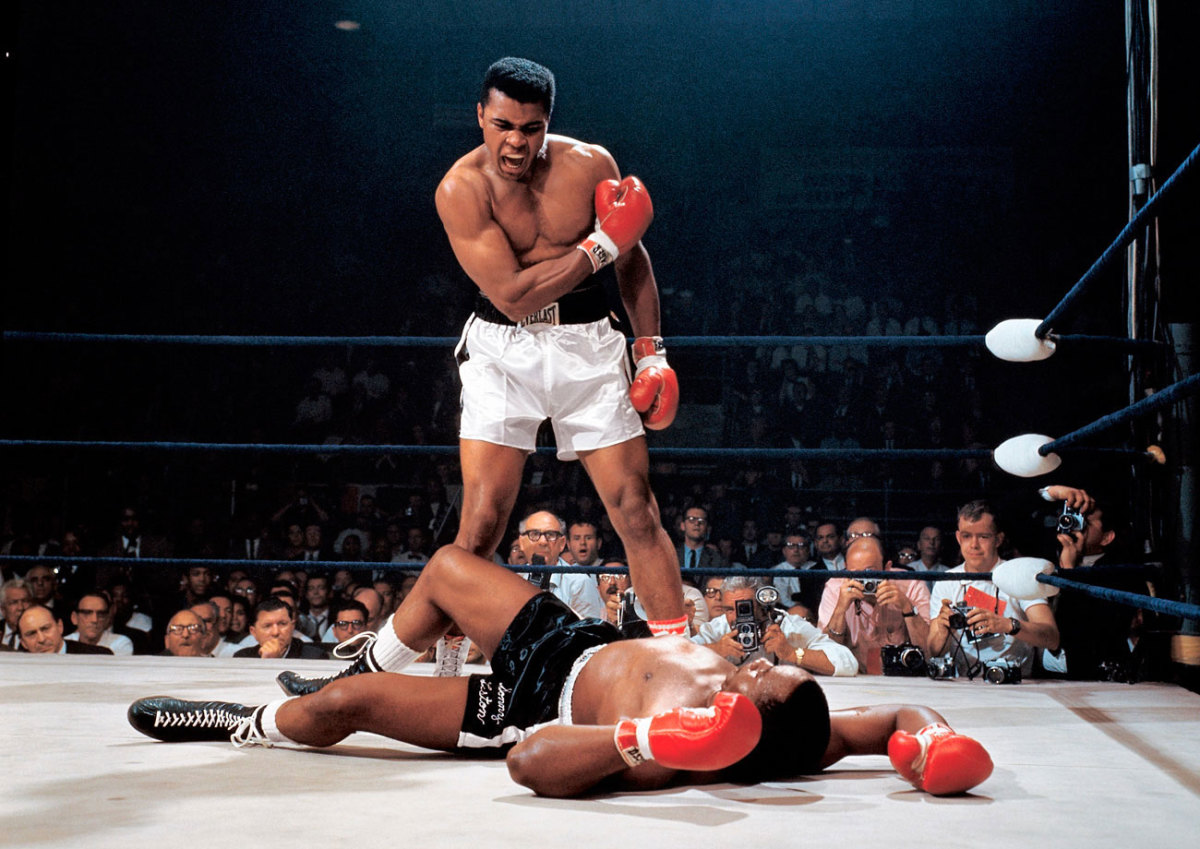
In one of the most iconic and controversial moments of his career, Ali stands over Sonny Liston and yells at him after knocking the former champ down in the first round of their 1965 rematch. Skeptics dubbed it "the Phantom Punch," but films show Ali's flashing right caught Liston flush, knocking him to the canvas. Refusing to go to a neutral corner, Ali stood over Liston and told him to "get up and fight, sucker."
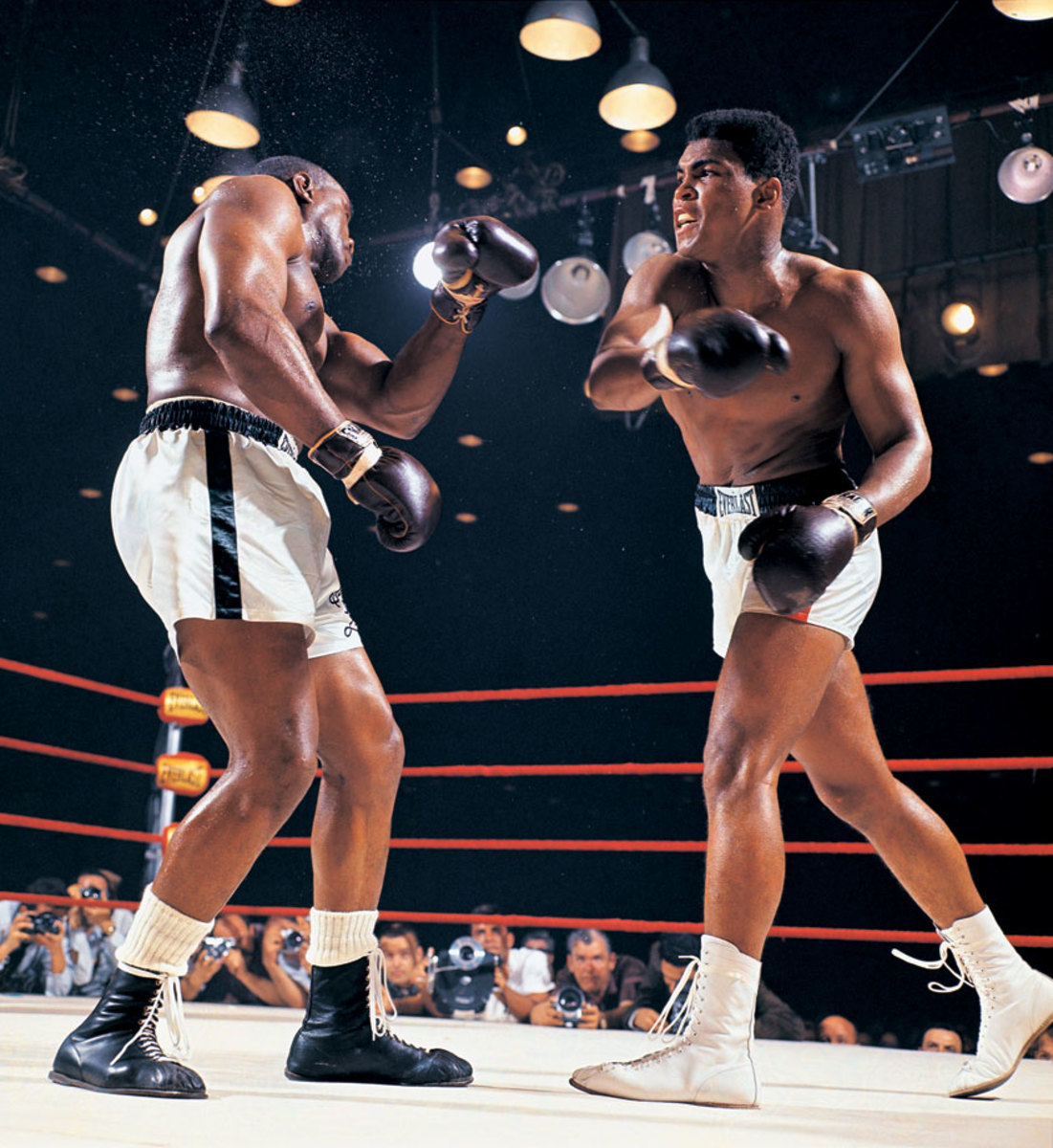
At 22-years-old, Cassius Clay (Muhammad Ali) battered the heavily favored Sonny Liston in a bout that shook the boxing world. The fight ignited the career of one of sports' most charismatic and controversial figures, whose bouts often became social and political events rather than simply sports contests. At the peak of his fame, Muhammad Ali was the best known athlete in the world. Liston, one of the most feared heavyweight champions in history, was a 1-8 favorite over the young challenger known as the Louisville Lip. But Clay, here stinging the champ with a right, used his dazzling speed and constant movement to dominate the action and pile up points.
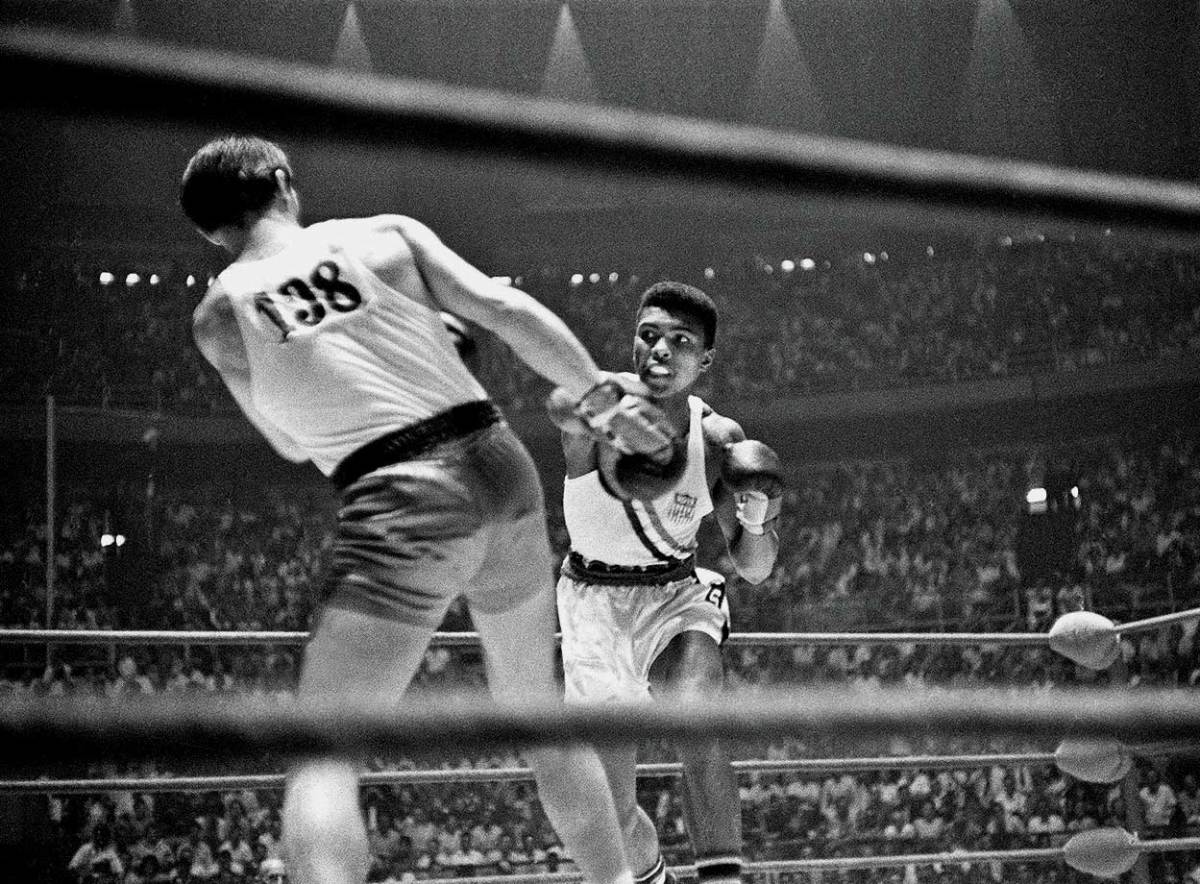
Cassius Clay punches Zbigniew Pietrzykowski of Poland during their gold medal bout at the 1960 Rome Olympics. Clay defeated Pietrzykowski 5-0 for the light heavyweight gold medal.
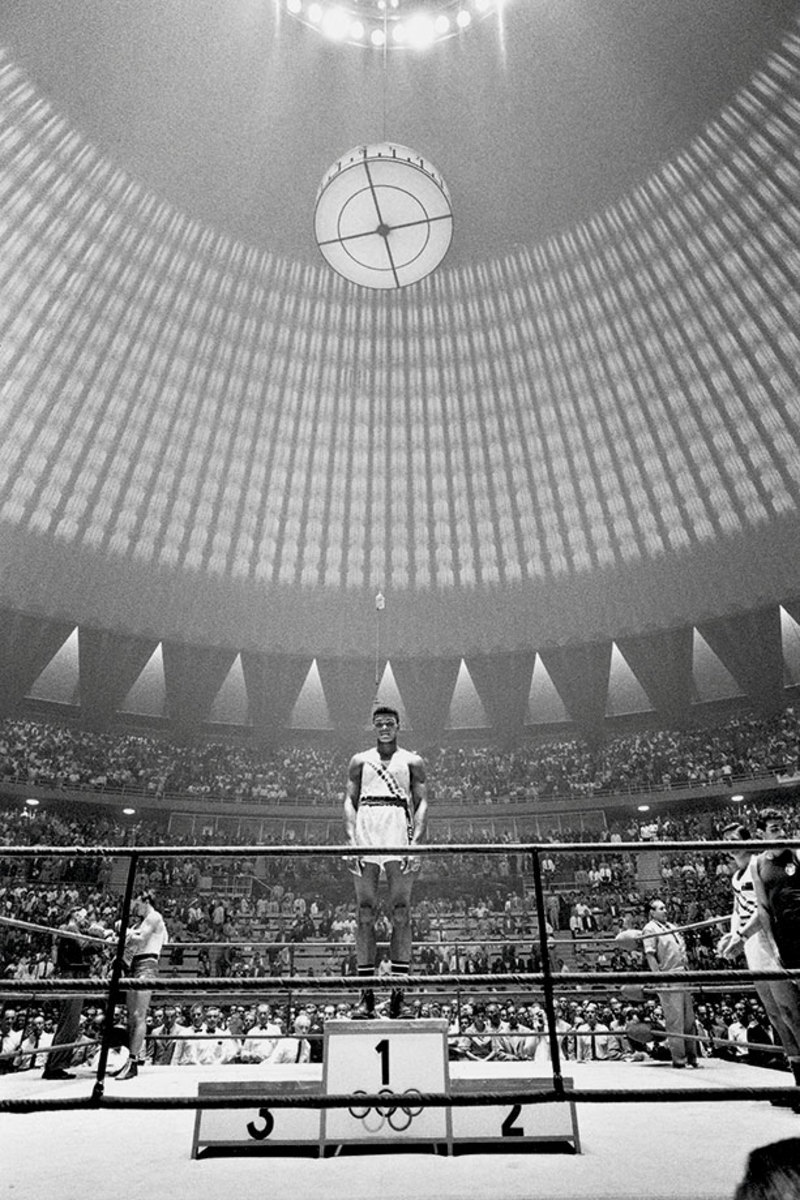
For the 18-year-old from Louisville, here atop the medal stand after his Olympic victory, all roads led from Rome. Clay finished his amateur career with a record of 100-5 and made his professional debut two months after the Games.
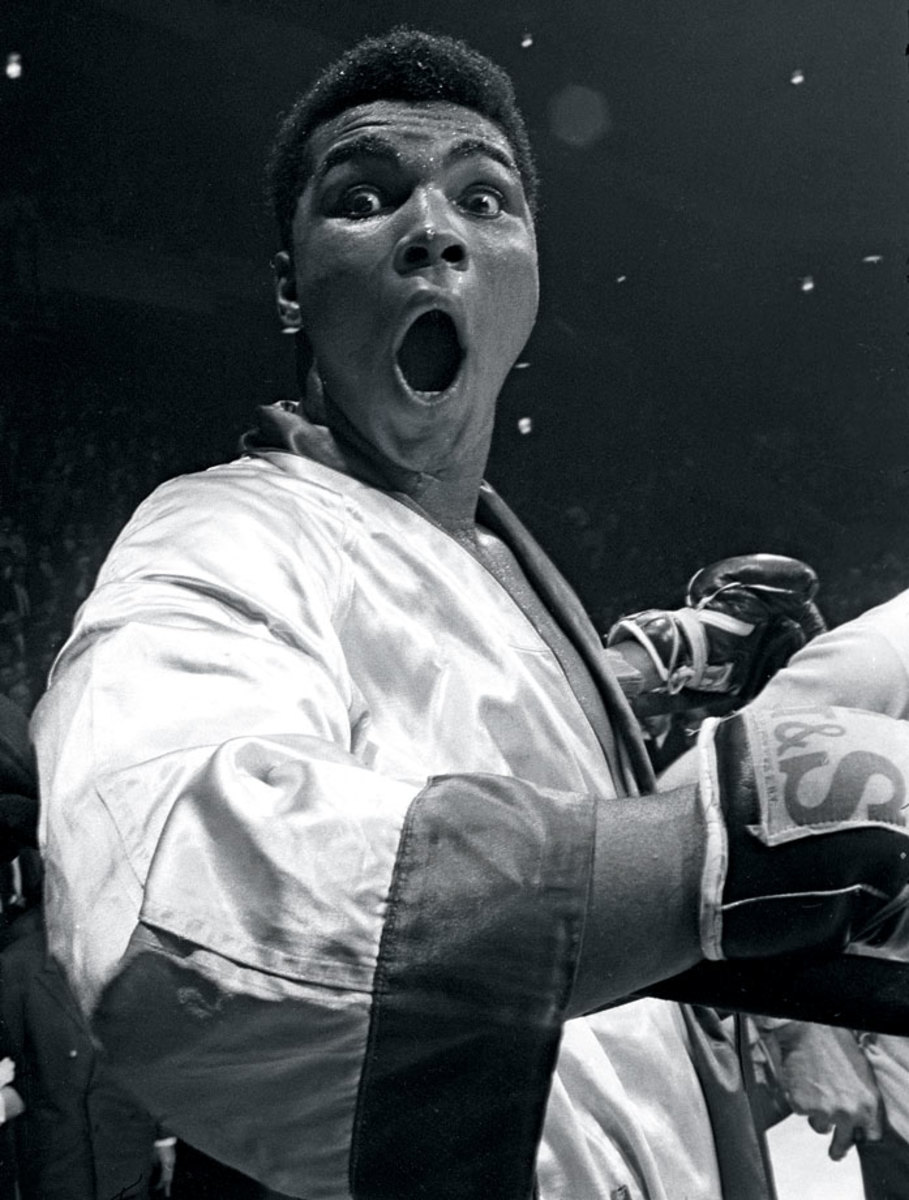
Undefeated in his first 17 pro fights, Clay mugged for the camera before the start of his 1963 bout against Doug Jones in Madison Square Garden.
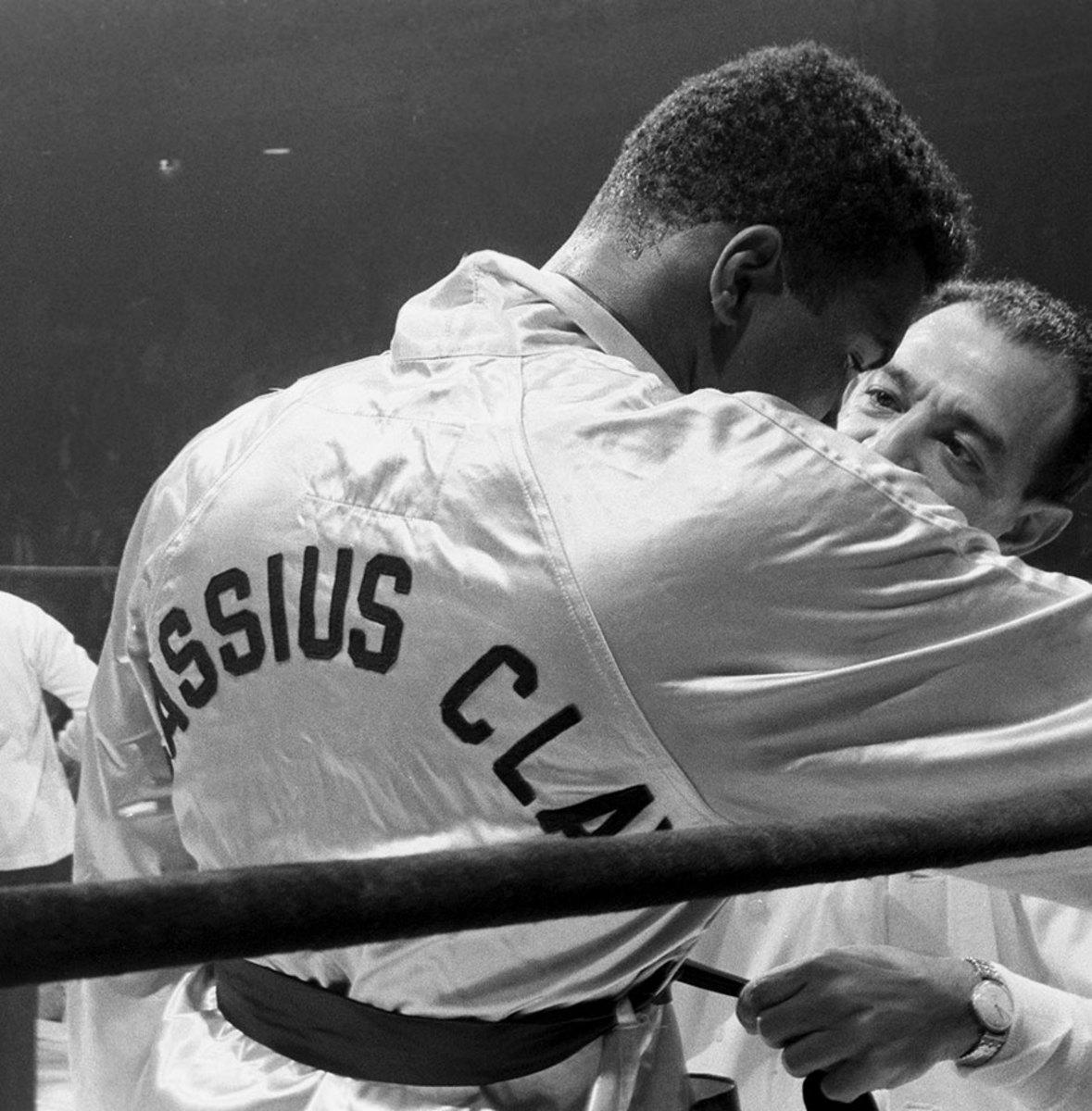
Trainer Angelo Dundee urged his young charge to get serious before the opening bell against Jones. Clay followed instructions and emerged from a tough fight with a unanimous decision victory. Three months later he would stop Henry Cooper and close out 1963 at 19-0.
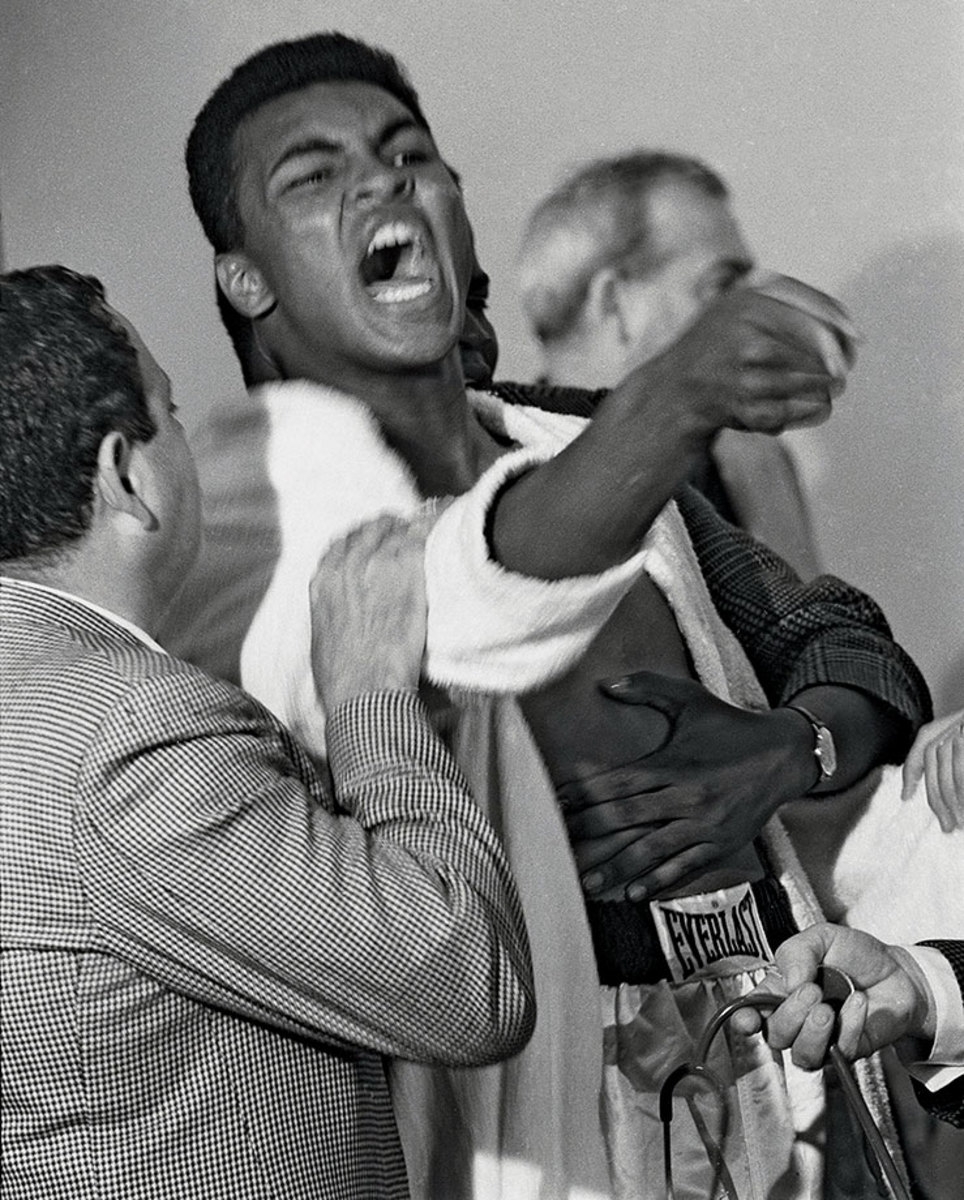
A seemingly hysterical Clay taunted Sonny Liston during the pre-fight physical for their 1964 bout. He had consistently baited the Big Bear during the lead-up to the fight, saying he was going to "use him as a bearskin rug ... after I whup him." The Miami Boxing Commission would fine Clay $2,500 for his outburst at the physical.
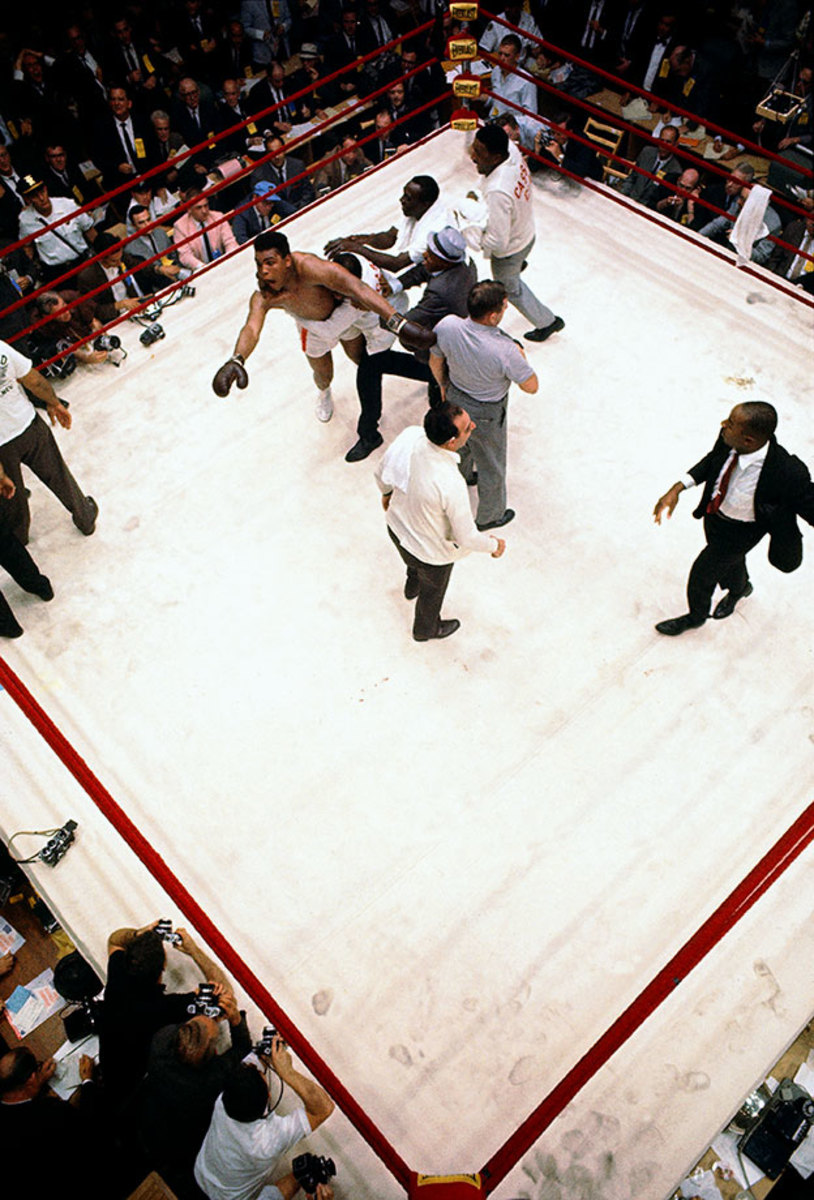
"I shook up the world!" an emotional Clay hollered to ringside reporters after his shocking defeat of Liston. And he did just that, claiming the heavyweight title at age 21 after a clearly beaten Liston, complaining of a shoulder injury, failed to answer the bell for the seventh round.
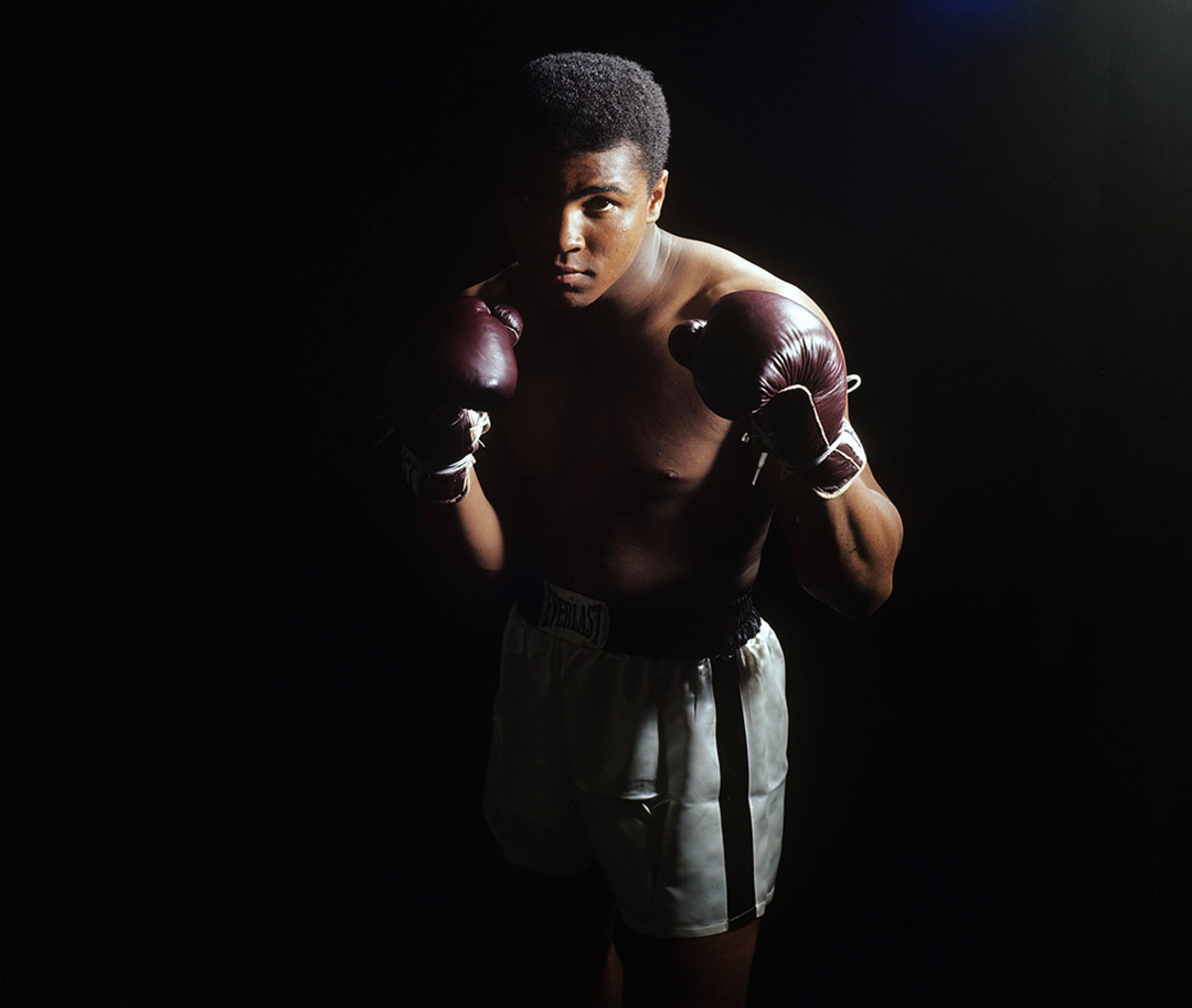
Draped in shadow, the young king — now known as Muhammad Ali — stared down the camera during a photo shoot in April 1965, one month before his rematch against Sonny Liston.
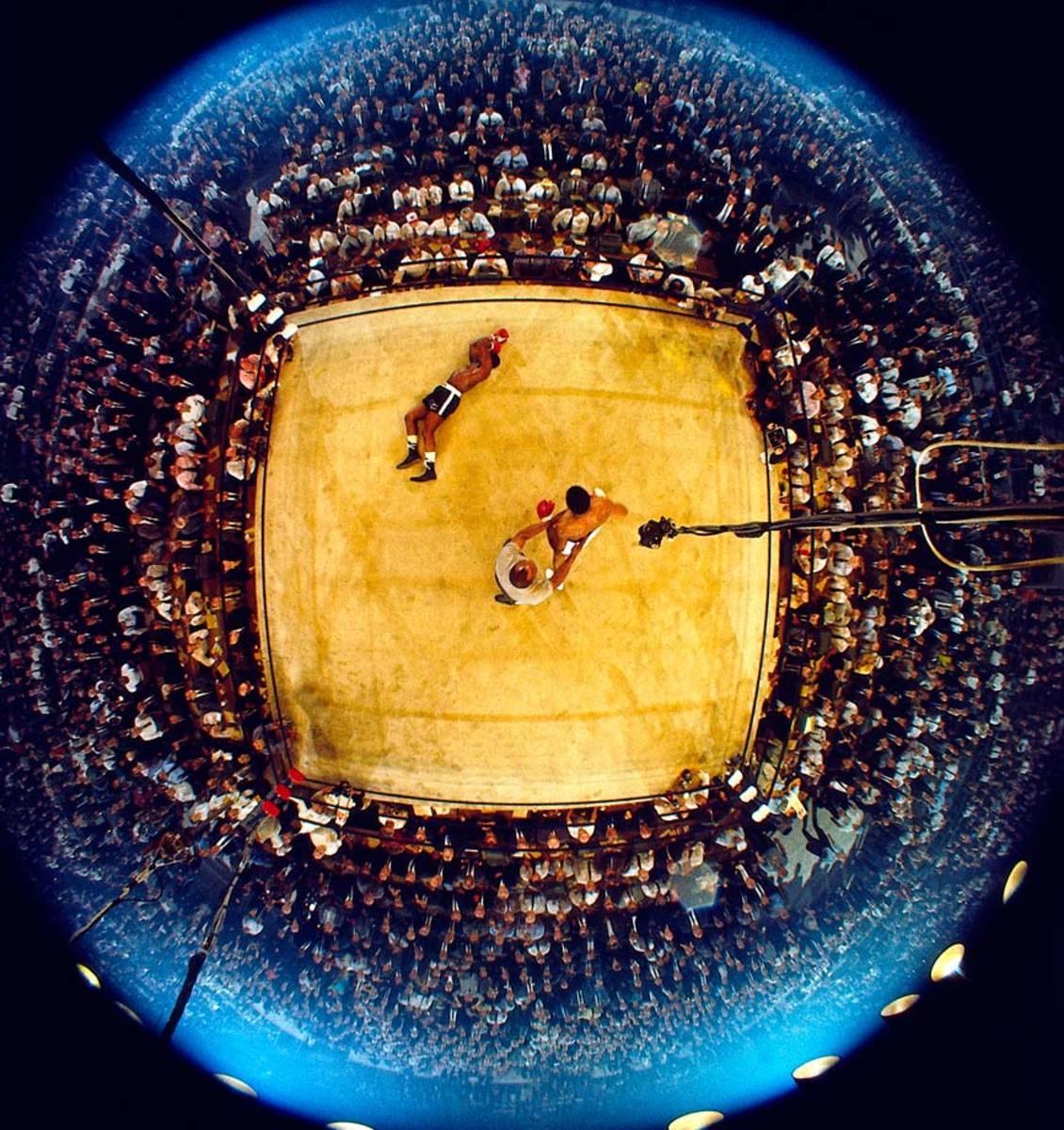
As Liston lingered on the canvas and the referee, former heavyweight champ Jersey Joe Walcott, tried to control Ali, the 2,434 spectators on hand in the Lewiston, Me., hockey arena — a record low for a heavyweight championship fight — tried to make sense of what all that had happened in less than two minutes after the opening bell.
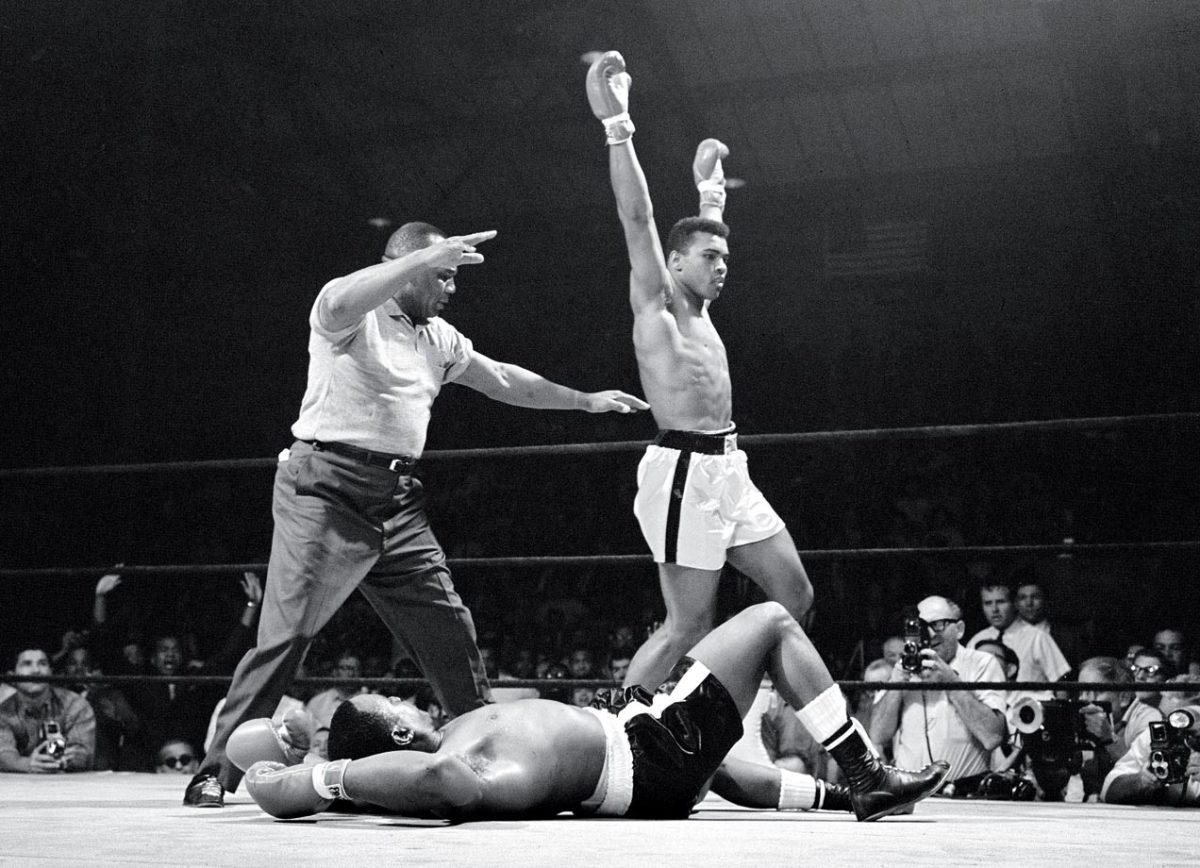
The celebration over Liston continued. In a chaotic ending, Ali was awarded a knockout when Nat Fleischer, publisher of The Ring, informed referee Jersey Joe Walcott from ringside that Liston had been on the canvas for longer than 10 seconds after Ali knocked him down. The bout remains one of the most controversial in boxing history, with many observers insisting that Liston took a dive.
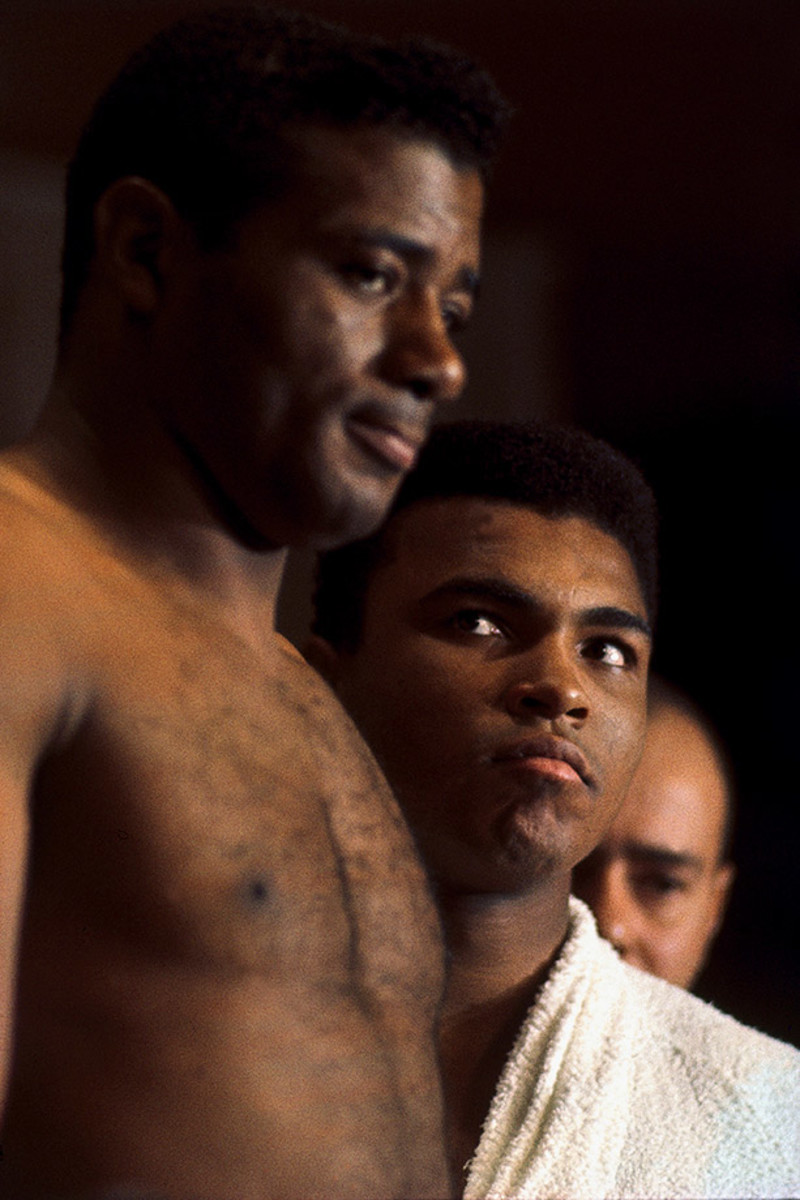
Ali's second title defense came in November 1965, against former two-time heavyweight champion Floyd Patterson. During the build-up to the bout, the normally soft-spoken Patterson earned the new champ's wrath by refusing to call Ali by his Muslim name. At the weigh-in, Ali's glare made it clear that he intended Patterson to pay for the disrespect.
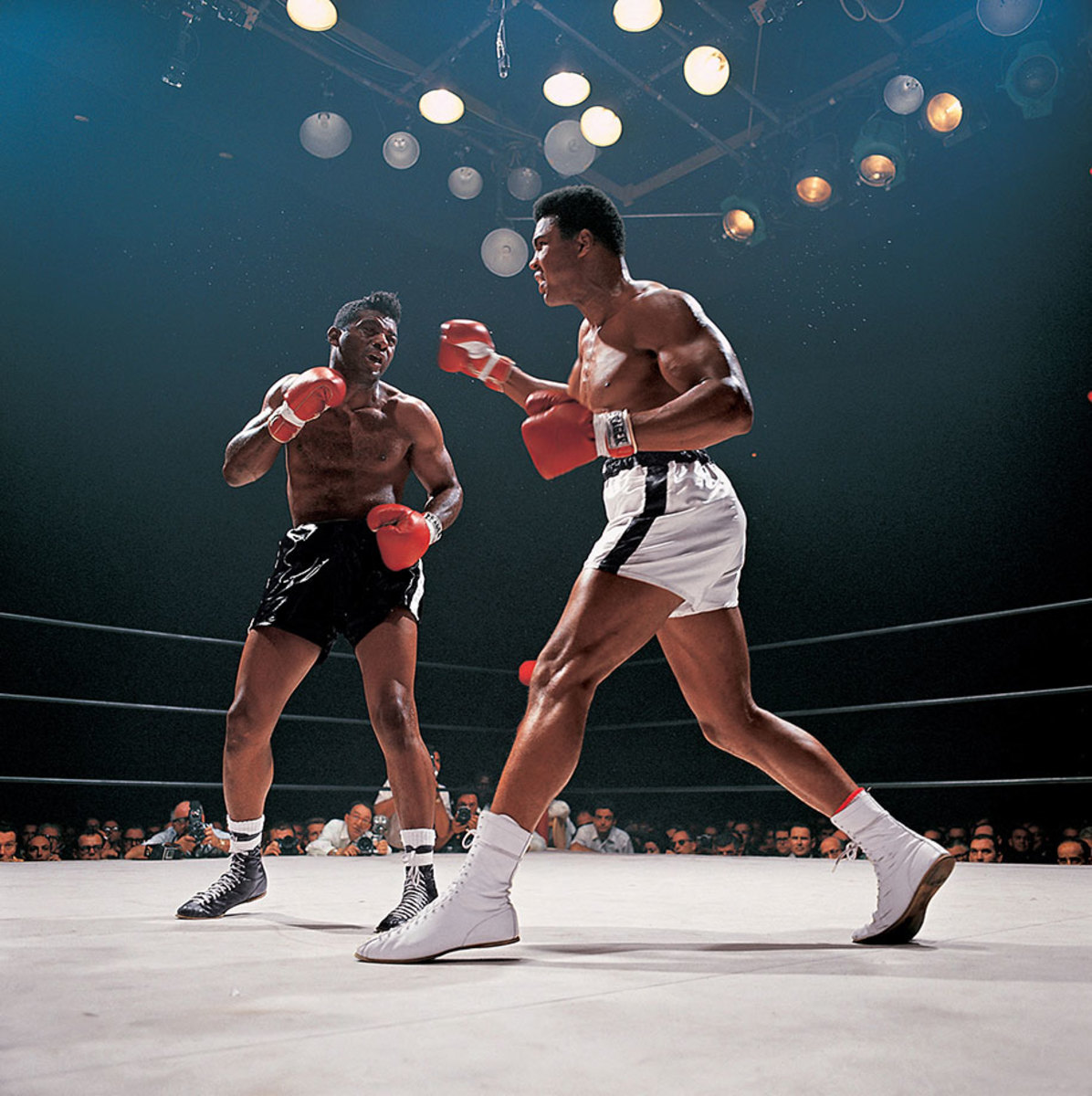
In cruelly efficient performance, Ali punished Patterson — who was hobbled by a painful back injury — seemingly toying with the former champ throughout the bout, hitting him at will and calling, "What's my name?" before finally winning on a 12th-round TKO.
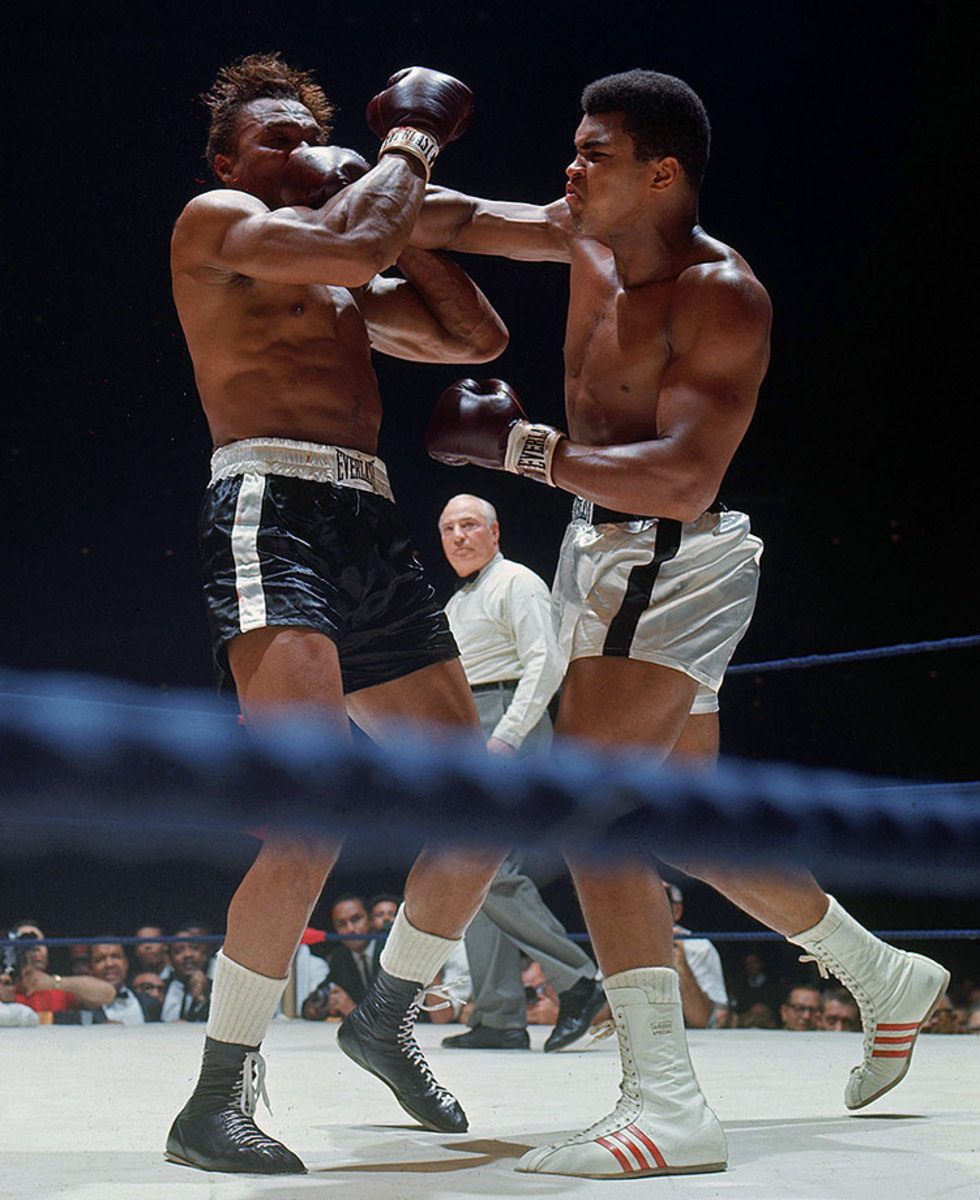
Capping off a five-fight campaign in 1966, Ali faced Cleveland Williams in the Houston Astrodome on Nov. 14. Known as the Big Cat, the heavily-muscled Williams was a power puncher who had racked up 51 knockouts in 71 fights. But he was also 33, barely recovered from a gunshot wound sustained the year before, and up against a young champion very much in his prime. Ali wasted little time in unleashing a withering attack.
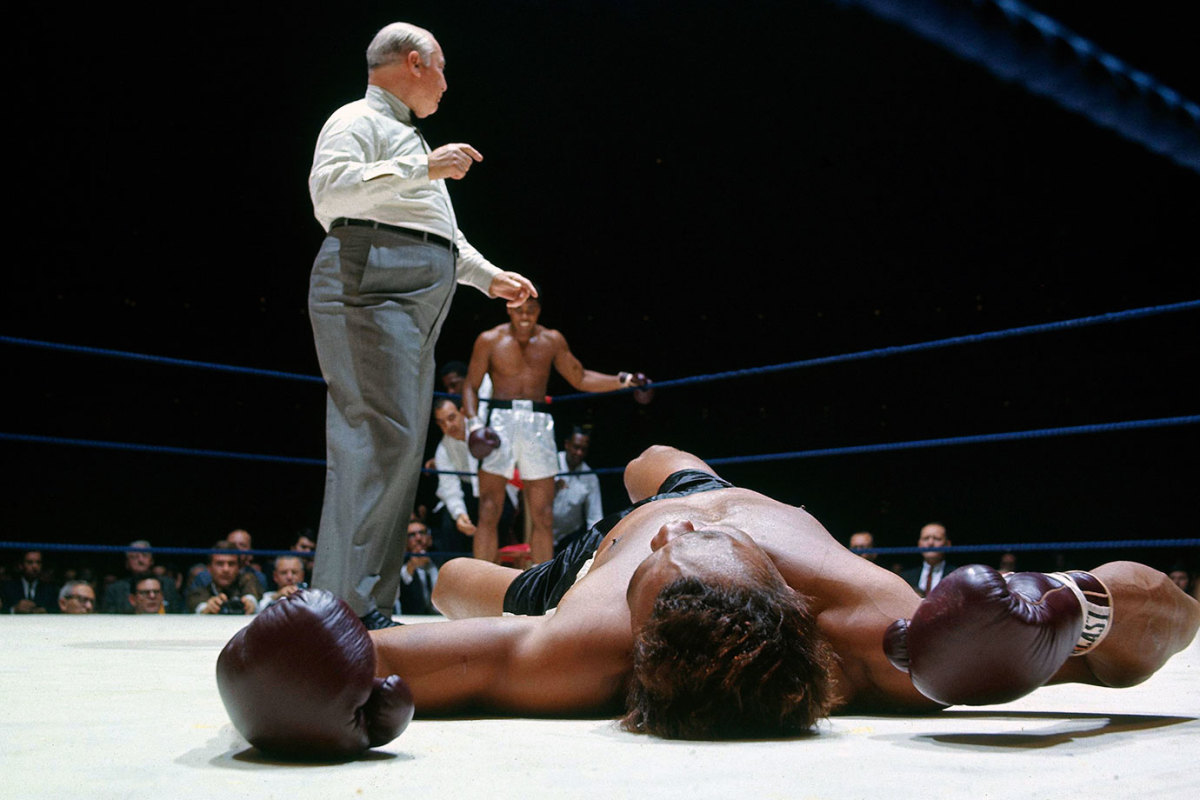
Float and sting: In a display of speed and combination punching unmatched in heavyweight history, Ali overwhelmed Williams from the start. The challenger, here down for the third time in round 2, would be saved by the bell before referee Harry Kessler could count him out, but it would only postpone the inevitable.
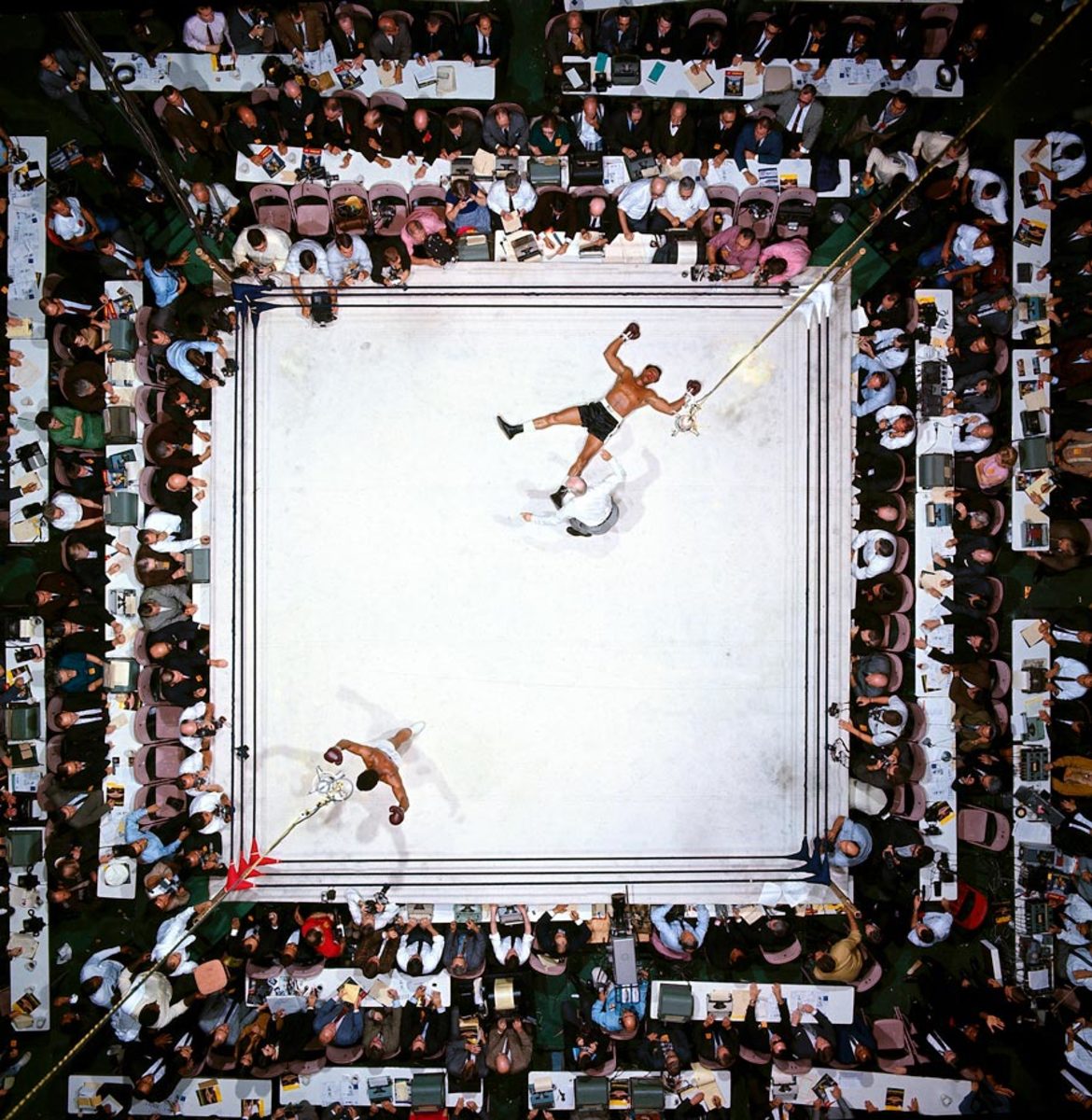
Ali dropped Williams again early in the third round, and Kessler waved the mismatch over at 1:08 of the third.
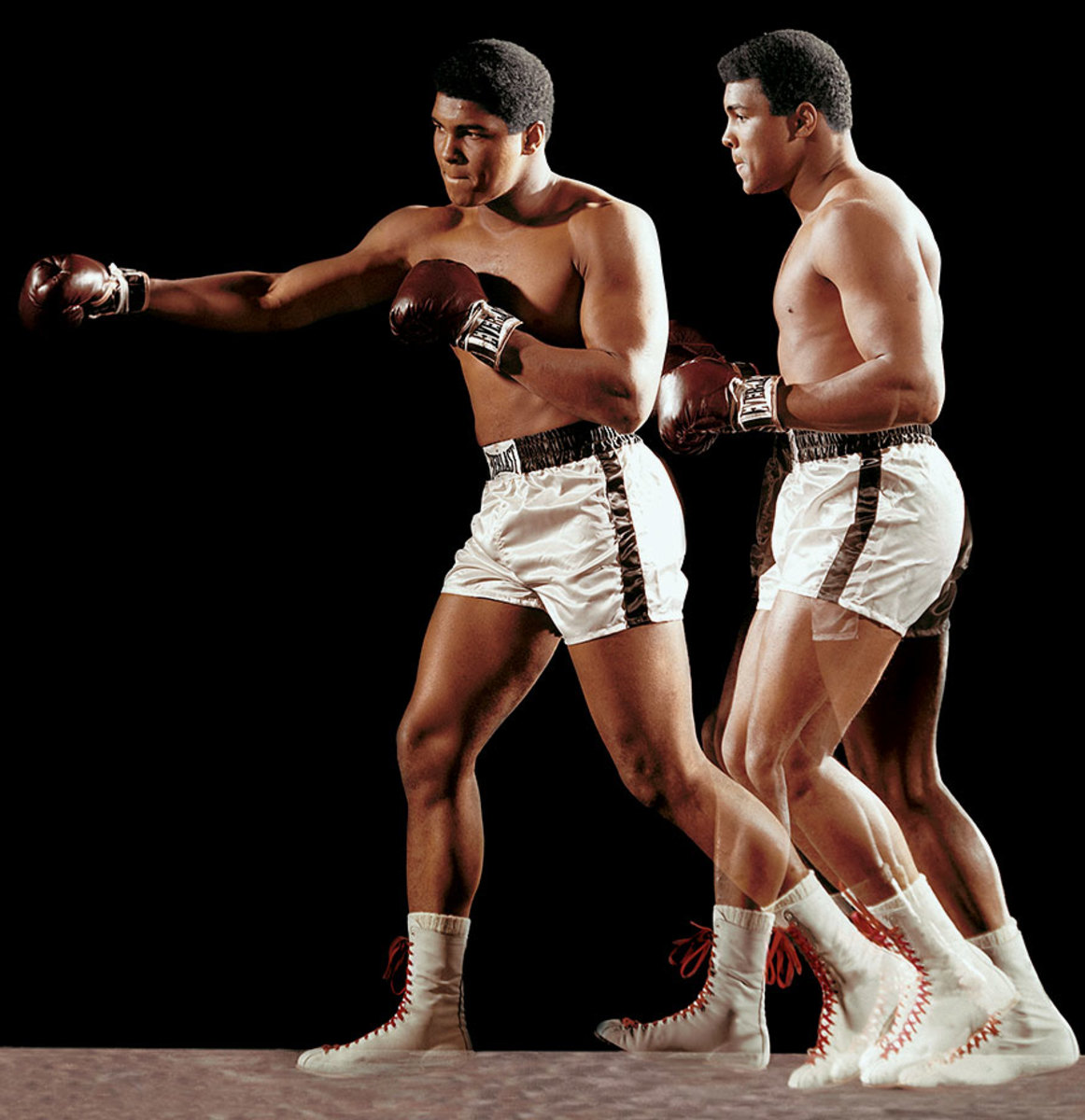
In a multiple-exposure portrait, Ali demonstrates his signature double-clutch shuffle during a photo shoot in December 1966.
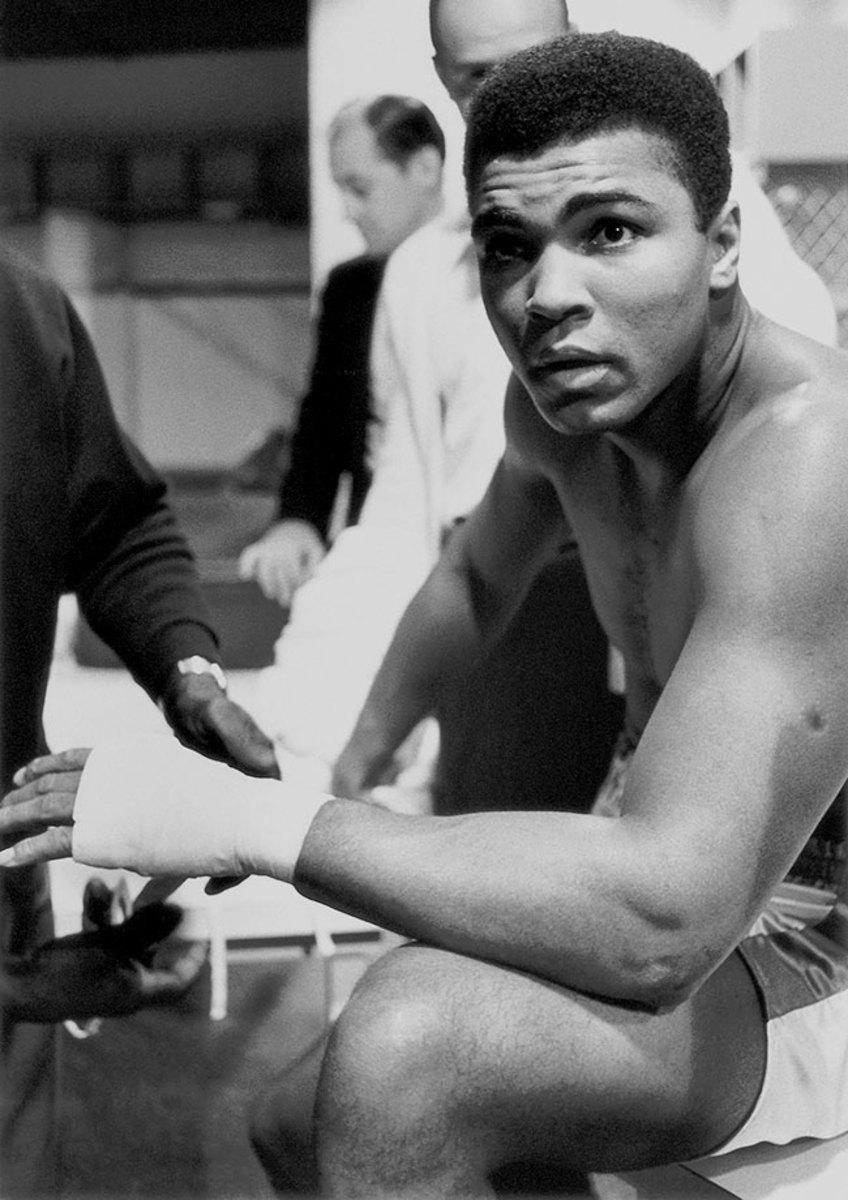
Ali sits in the locker room before his February 1967 fight against Ernie Terrell. Like Patterson before him, Terrell refused to call the champion by his Muslim name. Also like Patterson, he paid a stiff price, as Ali punished Terrell for 15 ugly rounds before winning by unanimous decision.
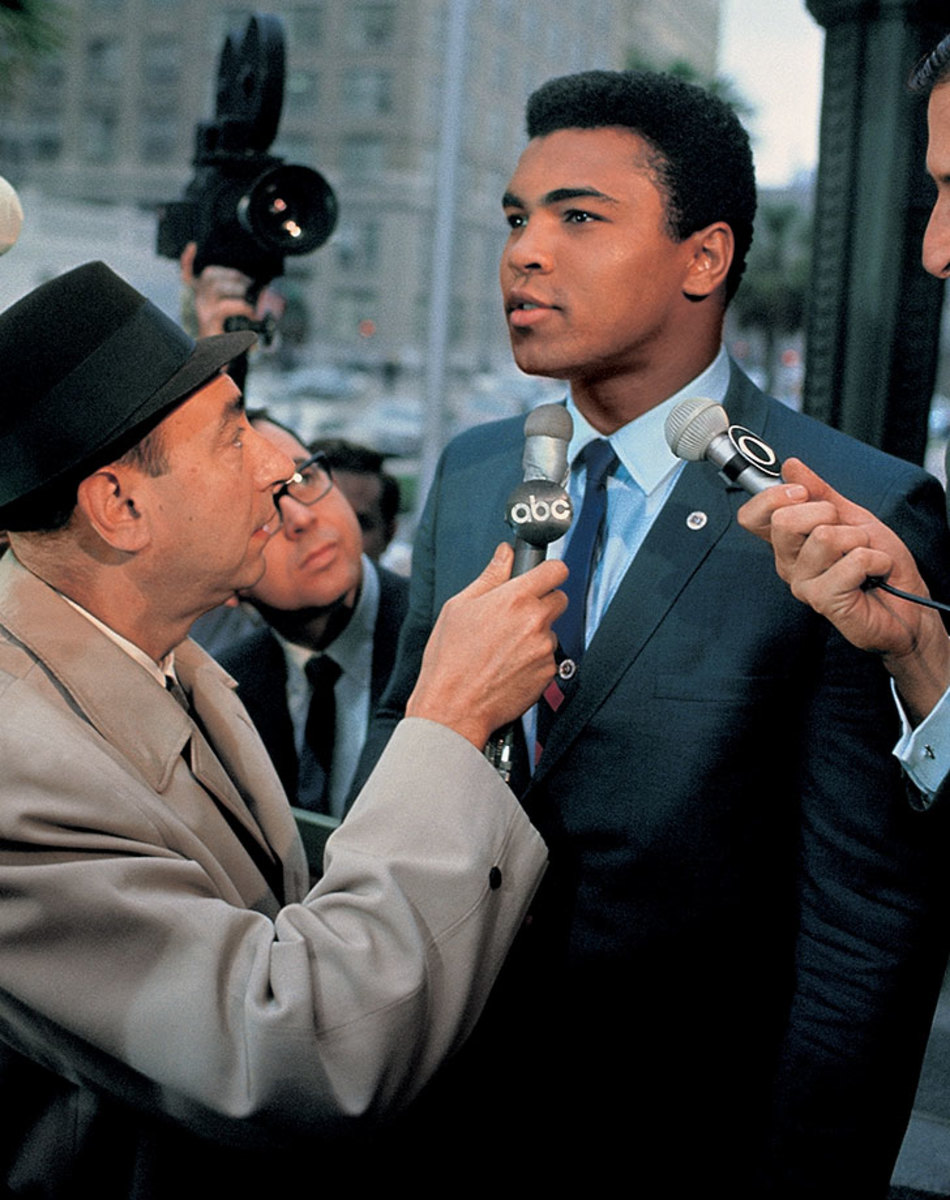
Outside the Armed Forces Examining and Entrance Station in Houston in April 1967, Ali spoke to the press about his refusal to be inducted into military service. Among those on hand was ABC's Howard Cosell, who would be a staunch supporter of the fighter's stance. The decision cost Ali his boxing license and his heavyweight title, and he was sentenced to five years in prison but remained free pending an appeal.
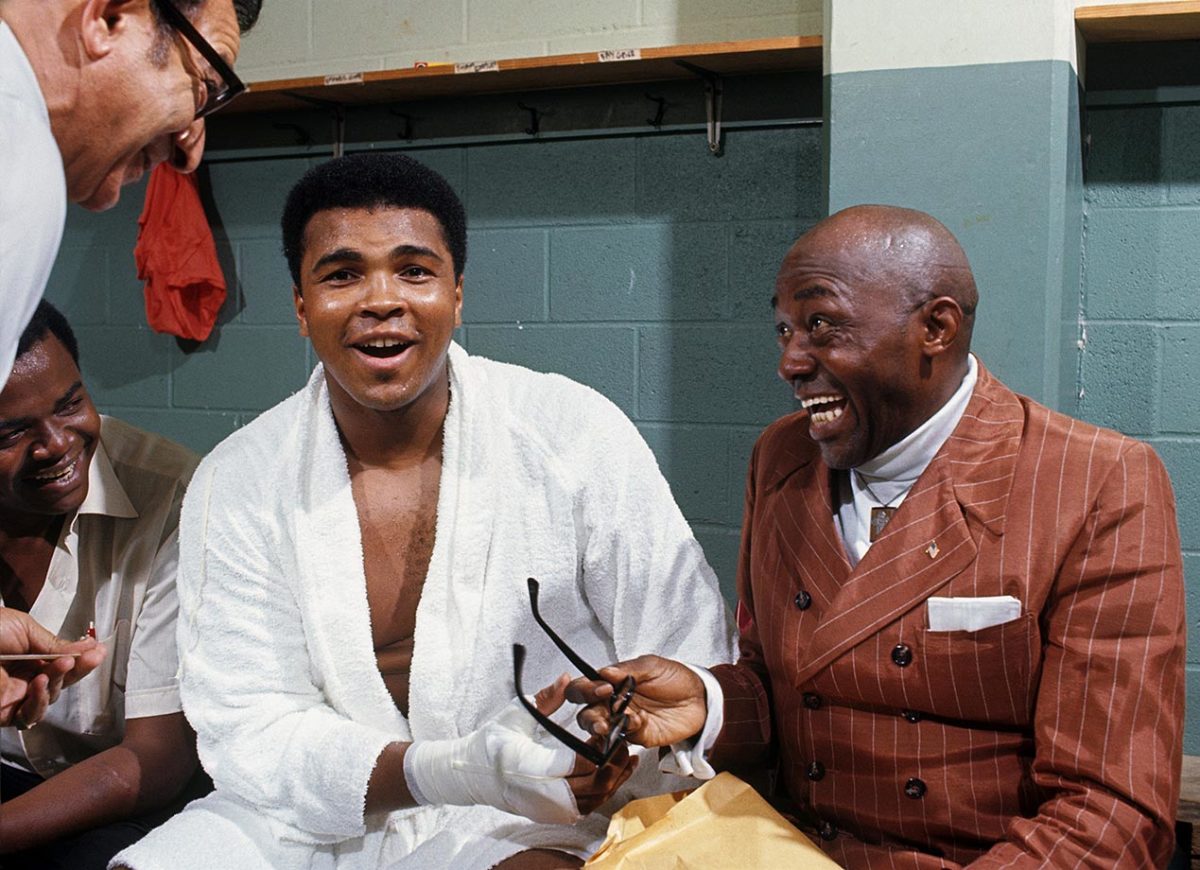
In professional exile for three and a half years because of his draft case, Ali sought to return to boxing in 1970. He began with a night of exhibition bouts at Morehouse College in Atlanta, where before going into the ring, he shared a locker room laugh with actor and comedian Lincoln Perry (right), better known by his stage name of Stepin Fetchit. The friendship between the two black icons would later be examined in an acclaimed play by Will Power, Fetch Clay, Make Man.
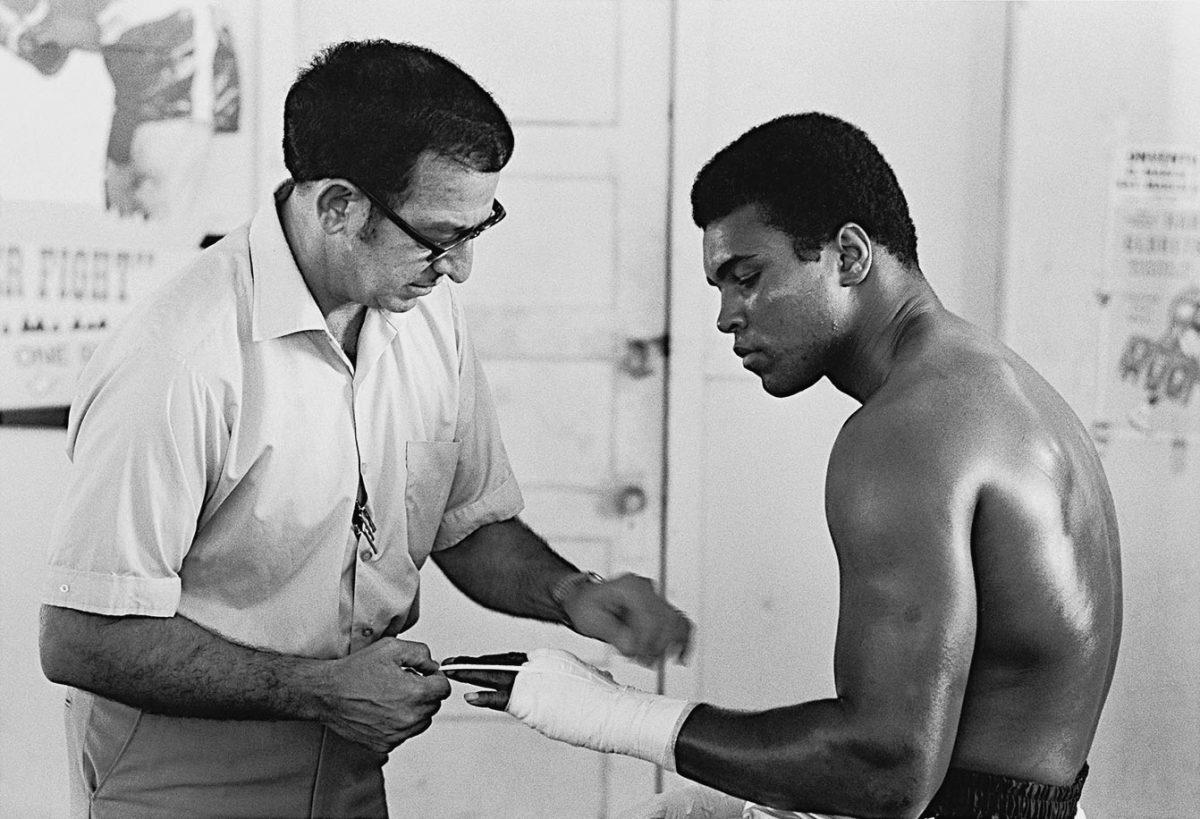
After the Atlanta Athletic Commission at last granted Ali a license, the deposed champion went back into serious training. He was, as ever, in the capable hands of trainer Angelo Dundee, here wrapping boxing's most famous fists at the 5th Street Gym in Miami in October 1970.
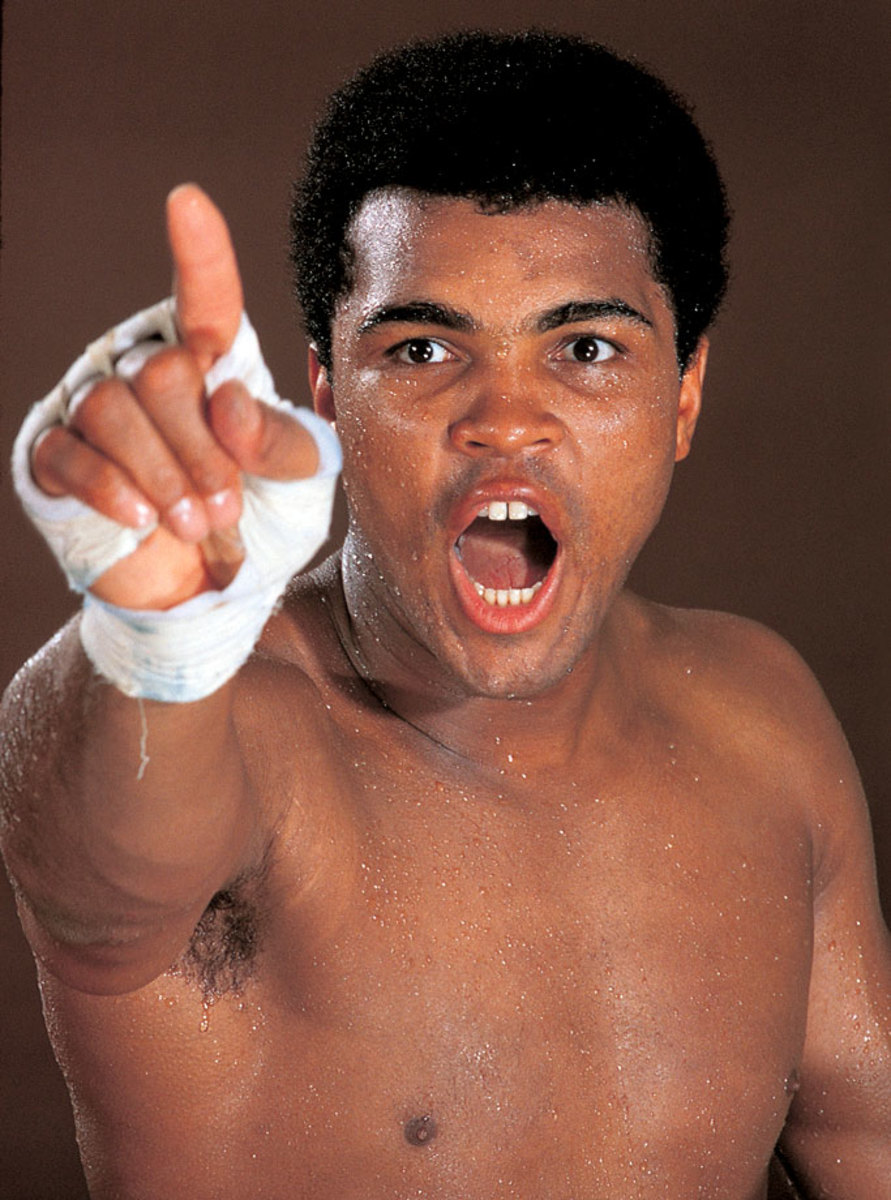
With his return to the ring scheduled for Oct. 26, 1970 in Atlanta, against dangerous contender Jerry Quarry, Ali made it clear to all who would listen that he was on a mission to reclaim the title that had been stripped of him.
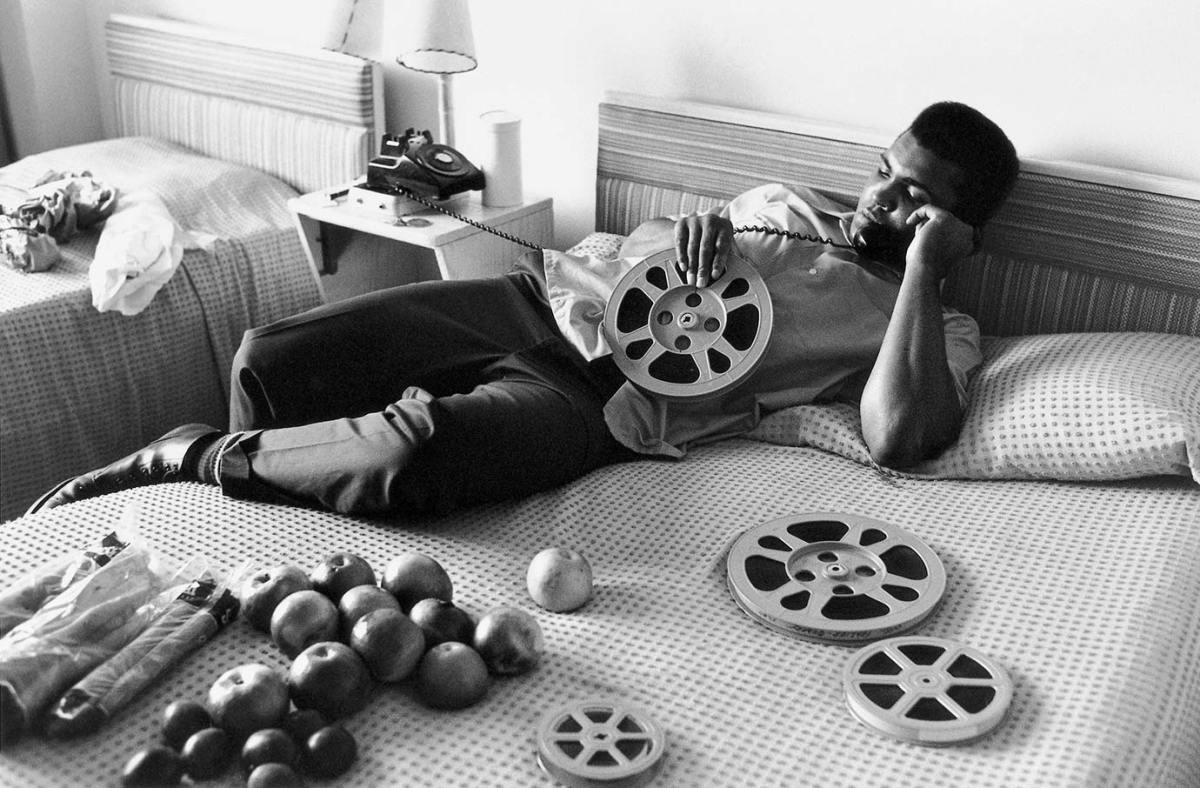
Reel to spiel: For the ever-loquacious Ali, even a rare moment of down time — like this afternoon in 1970 in a Miami hotel room — was a chance to do some talking.
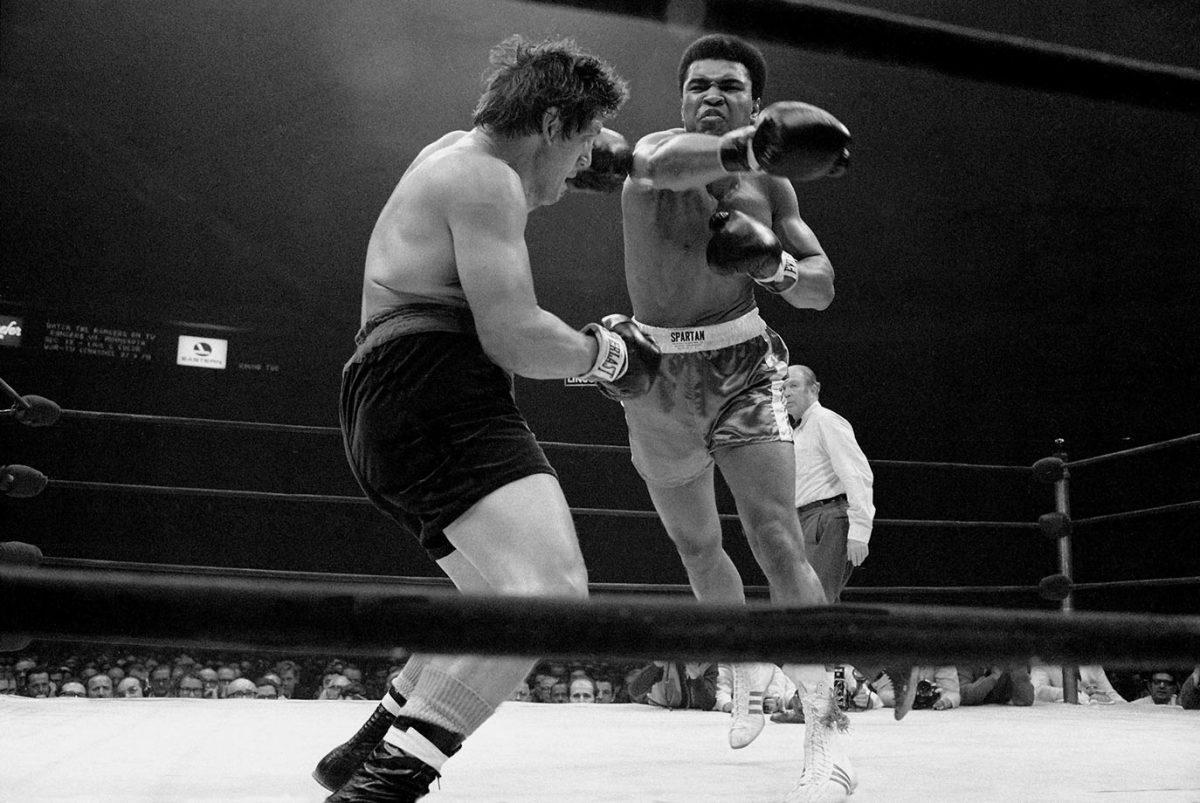
Despite Ali's long layoff, his comeback campaign would include no easy tune-up bouts. He stopped Quarry in three rounds on Oct. 26, 1970, then, just six weeks later — an unthinkably short interlude by today's standards — took on Argentine contender Oscar Bonavena in Madison Square Garden. Here, Ali fires a right at the rugged and awkward Bonavena, who took the fight to the former champion all night.
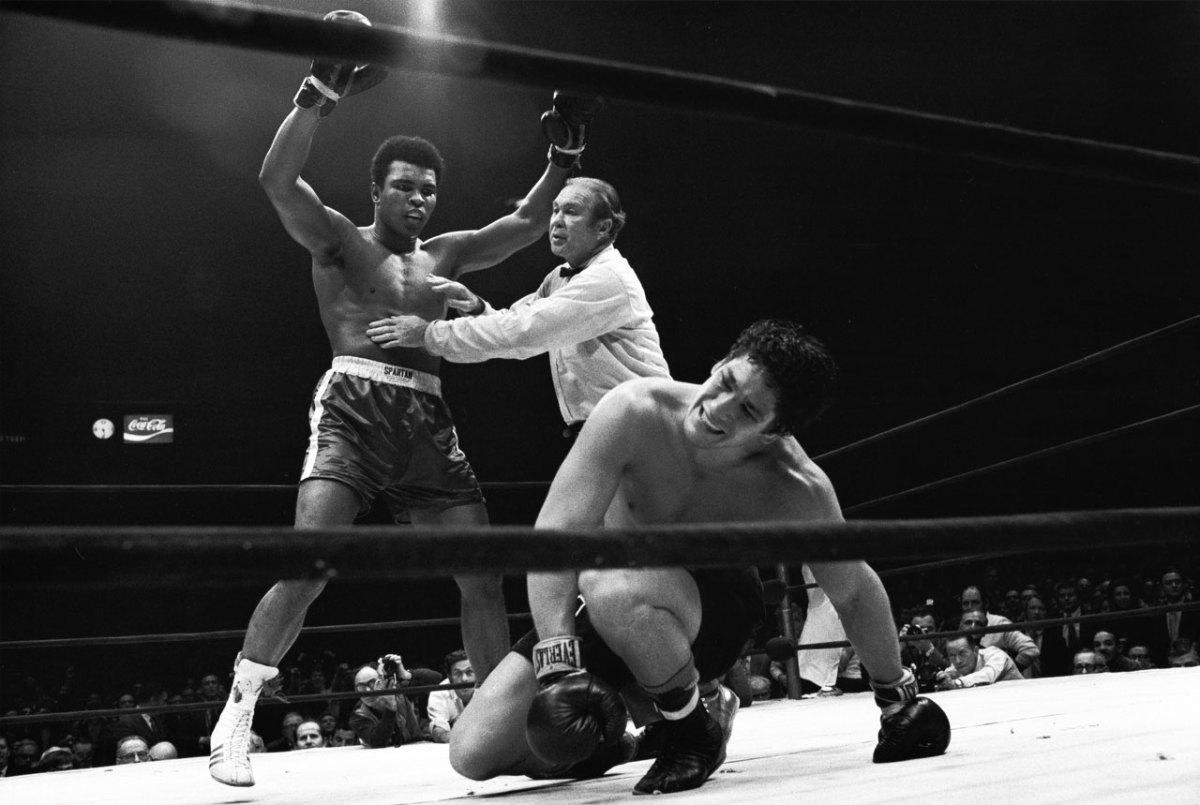
After a long, often sloppy bout, Ali — here being held back by referee Mark Conn — produced one of the most dramatic finishes of his career, dropping Bonavena three times in the 15th and final round to automatically end the fight. The win cleared the way for a showdown with Joe Frazier, the man who had taken the heavyweight title in Ali's absence.
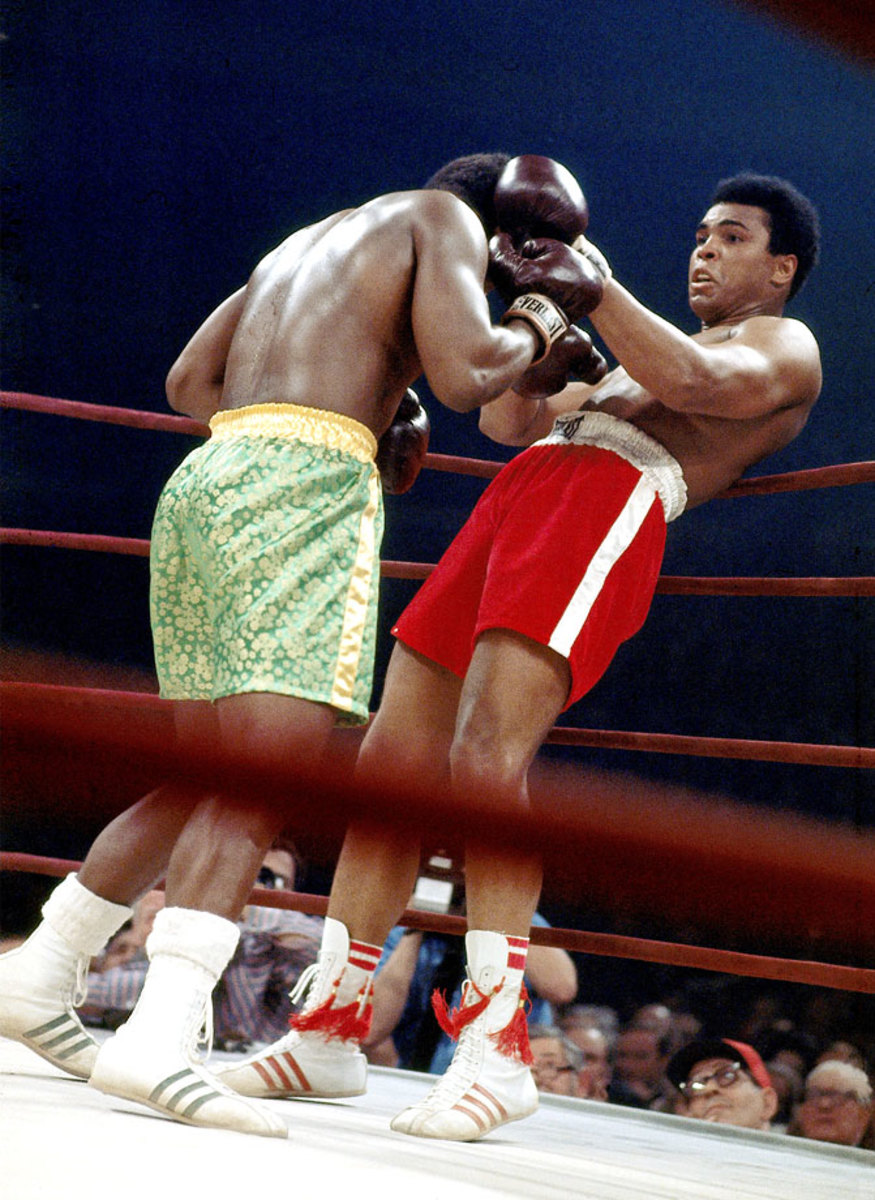
On the night of March 8, 1971, the eyes of the world were on a square patch of white canvas in the center of Madison Square Garden. There, Ali and Joe Frazier met in what was billed at the time simply as The Fight, but has come to be known, justifiably, as the Fight of the Century. For 15 rounds the two undefeated heavyweights battled at a furious pace, with each man sustaining tremendous punishment. In the end Frazier prevailed, dropping Ali in the final round with a tremendous left hook to seal a unanimous decision and hand The Greatest his first loss in 32 professional fights.
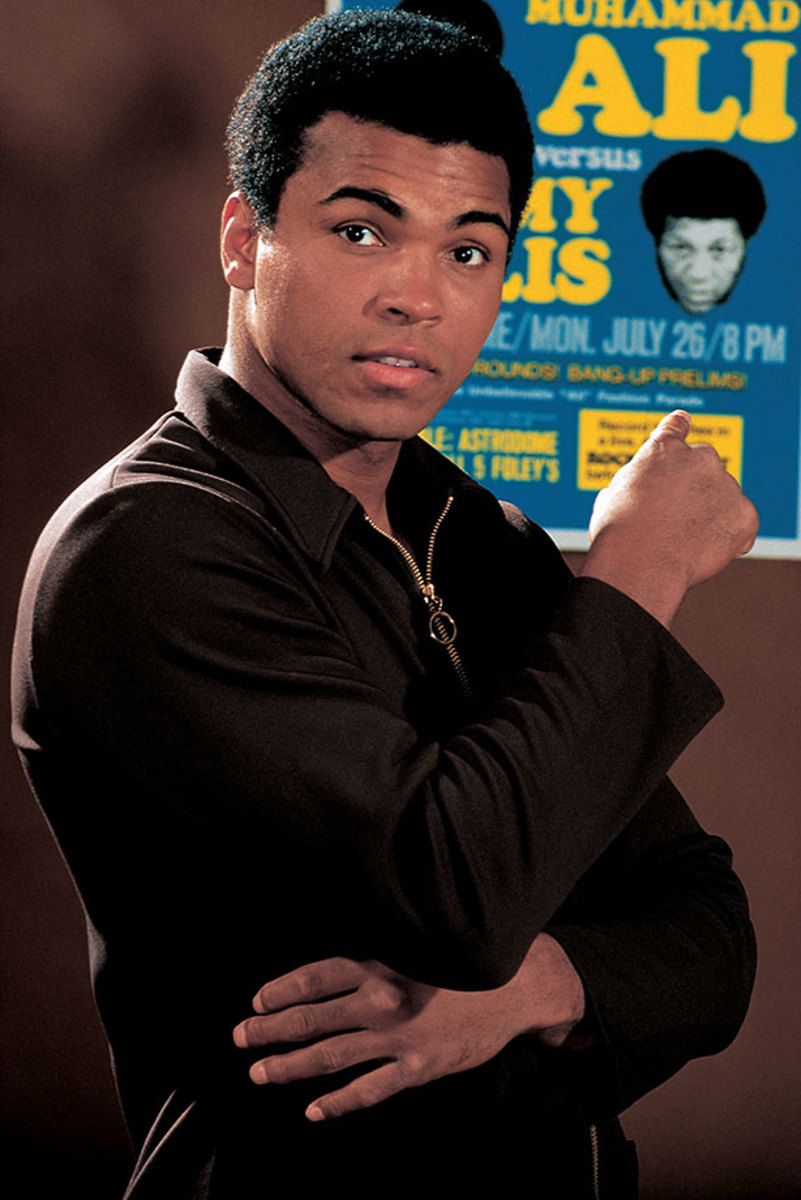
Ali poses with the fight poster for his upcoming fight against Jimmy Ellis during a photo shoot in July 1971. Ellis was an old friend of Ali's — both were trained by Angelo Dundee — and knew his fighting style well from many rounds of sparring.
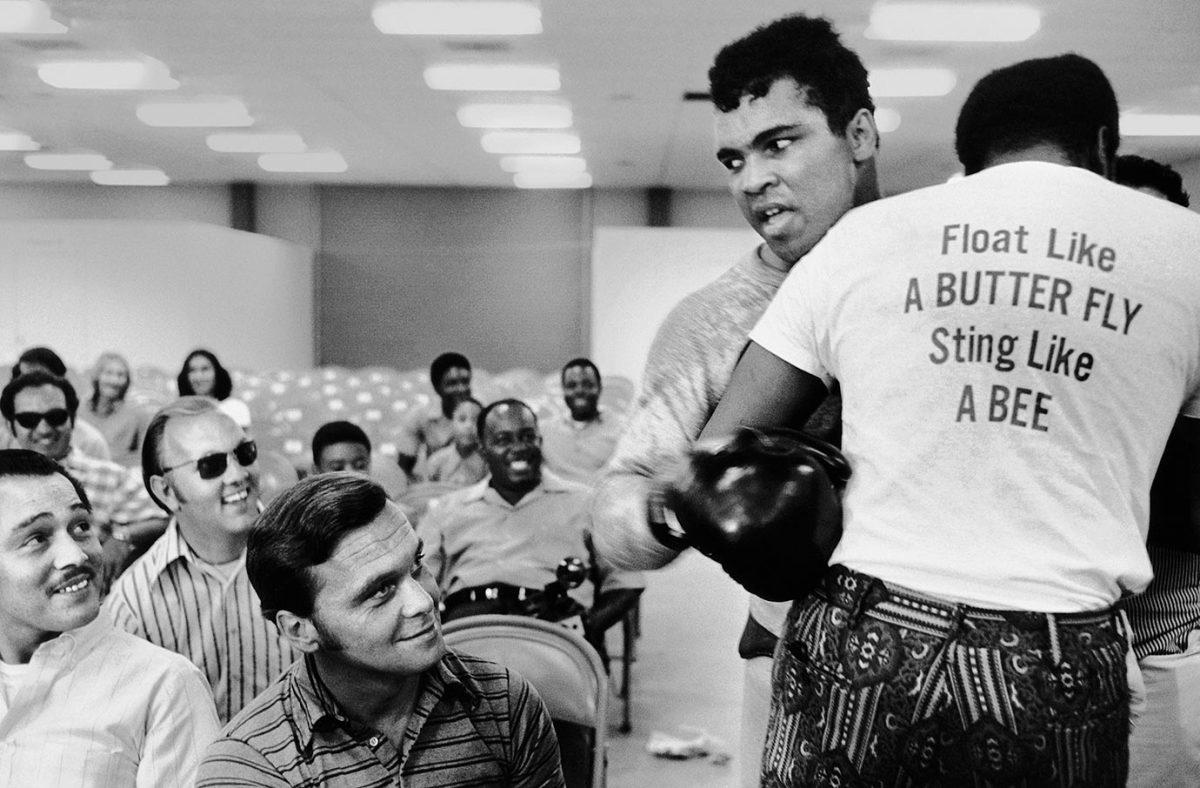
For those sportswriters lucky enough to cover Ali on a regular basis, each day brought surprises and, more often than not, plenty of laughs. of Trainer Drew Bundini Brown helps Ali train for his fight against Ellis. Ali won the bout by technical knockout in the 12th round to claim the vacant NABF heavyweight title.
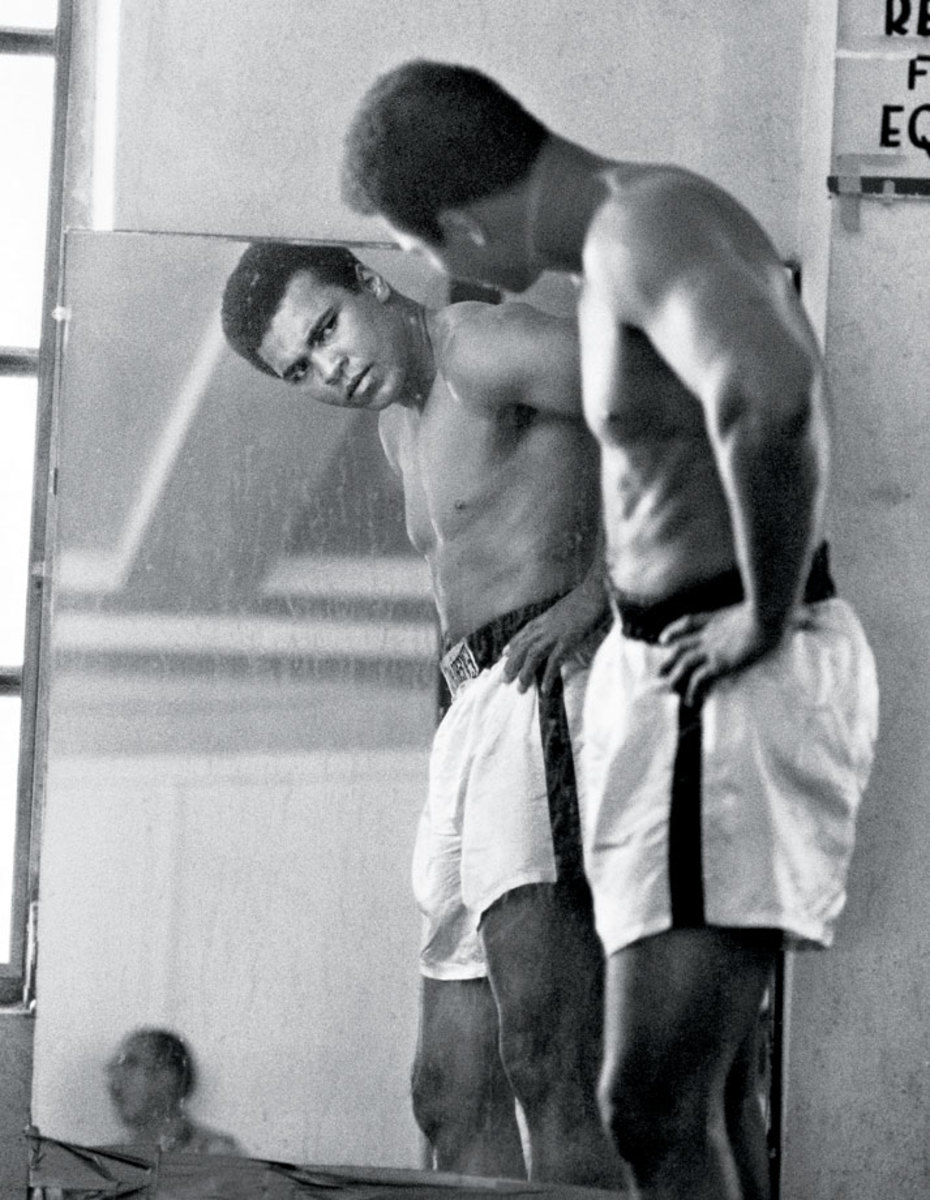
The man in the mirror stares back as Ali examines himself while training for a fight in 1972. He won all six of his fights that year.

The Louisville Lip stands next to George Foreman before Ali's fight versus Jerry Quarry in June 1972. Ali won by technical knockout in the seventh round. Foreman at the time was 36-0. Ali would not get his shot against Foreman for more than two years.
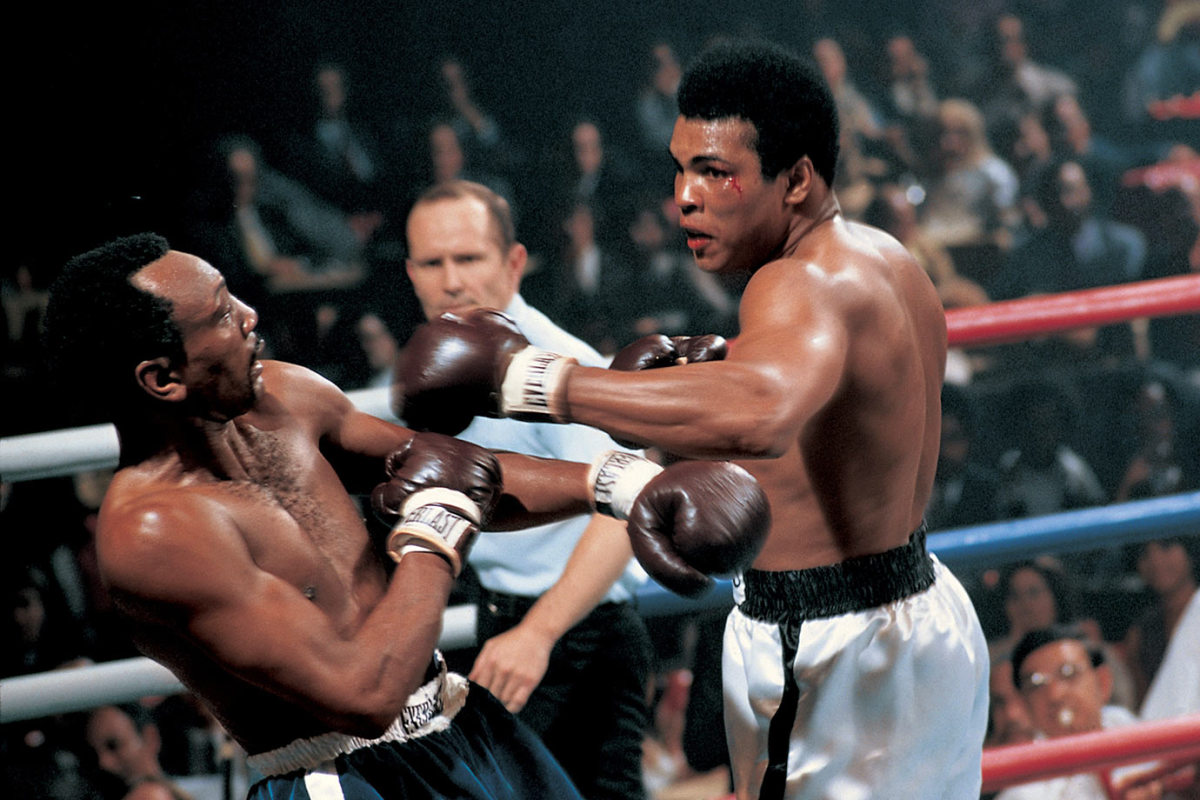
Ali throws a left hook at Bob Foster in their 1972 fight at Stateline, Nev. Although Ali knocked Foster out, Foster did leave his mark: a cut above Ali's left eye, his first as a professional.
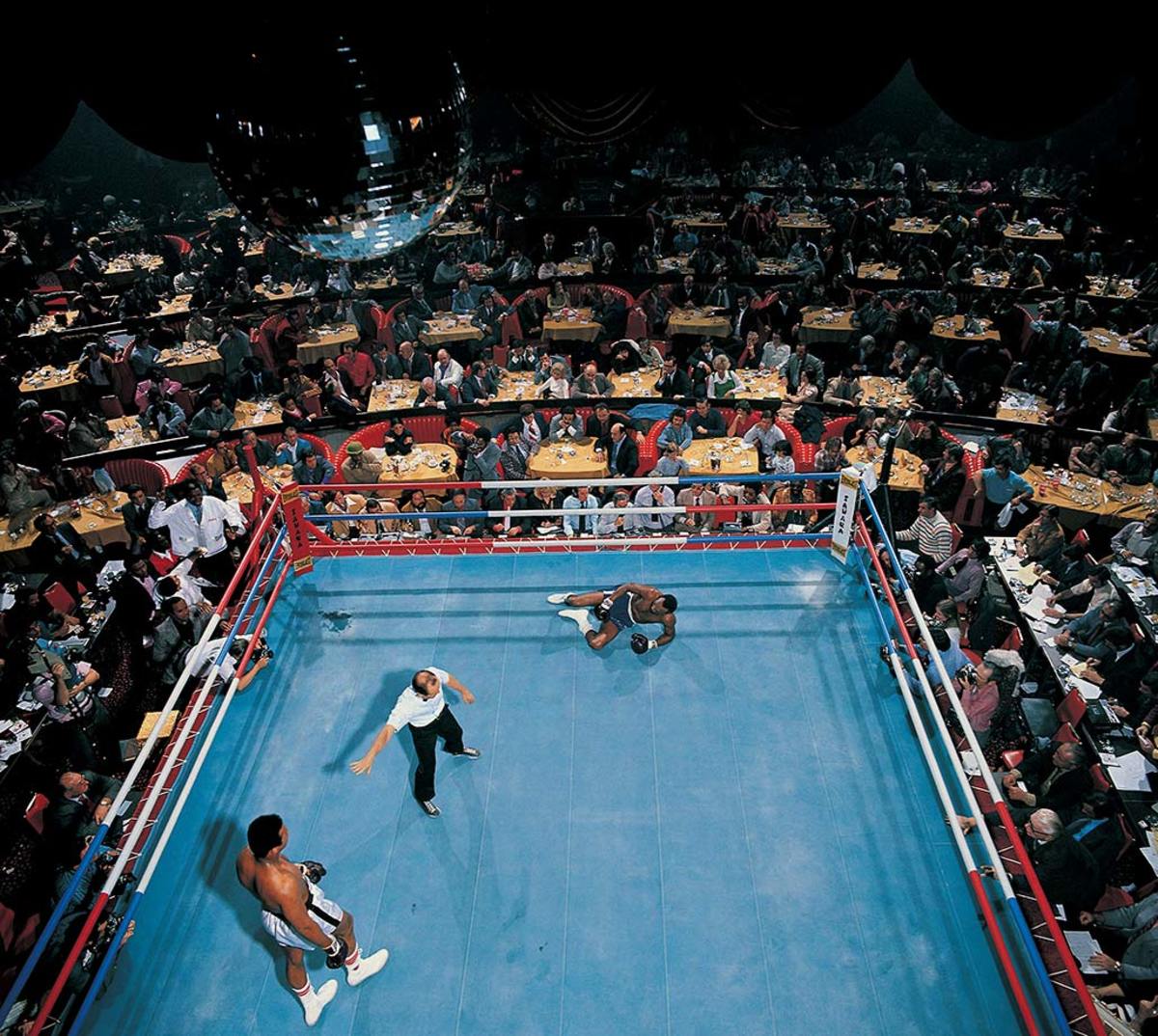
Foster lies on the canvas after getting knocked down by Ali. Ali knocked Foster down four times in the fifth round and twice more in the seventh round before he was finally counted out after Ali knocked him down again in the eighth round.
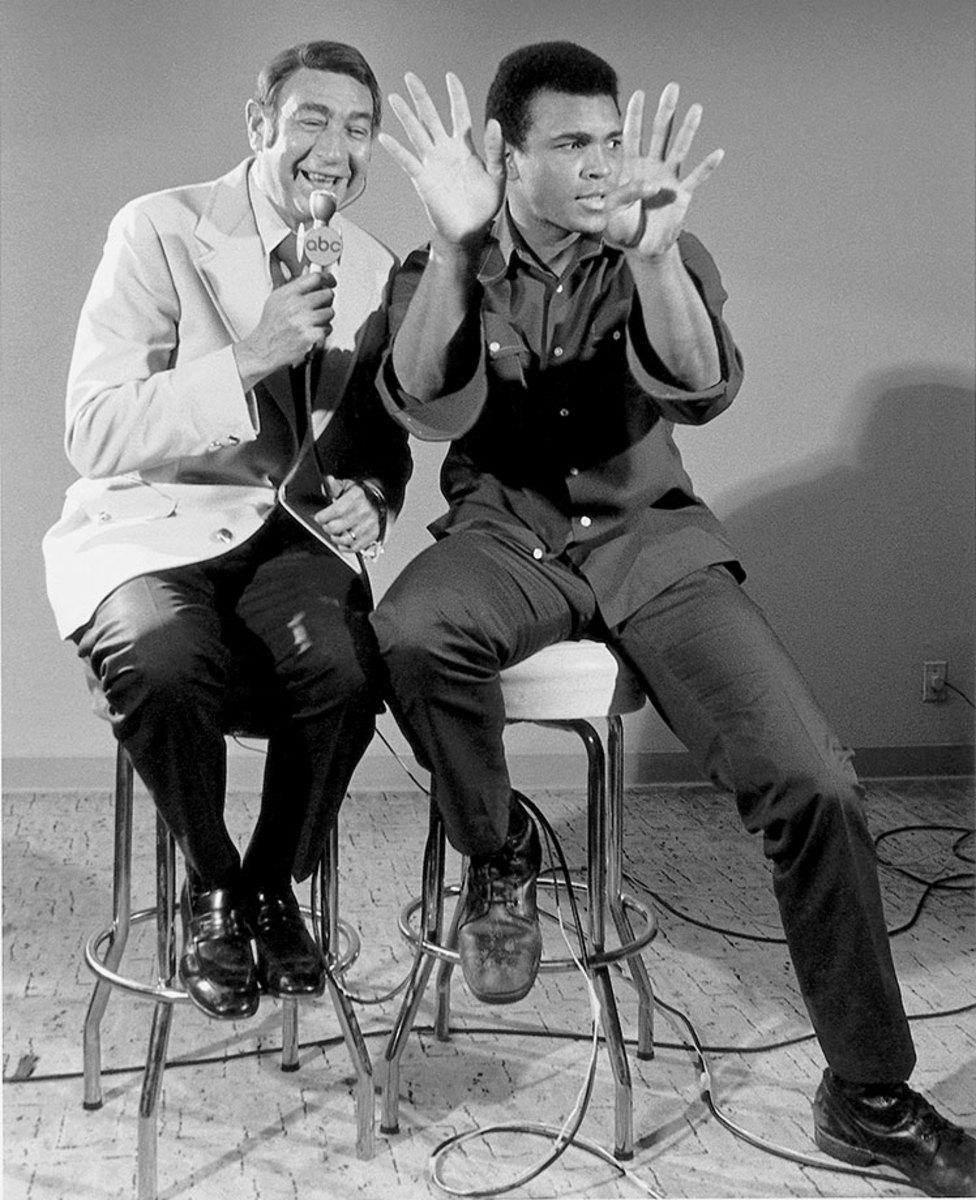
Ali sits with sportscaster Howard Cosell before his fight with Joe Bugner in February 1973. Although unable to knock Bugner out, Ali won comfortably by unanimous decision.
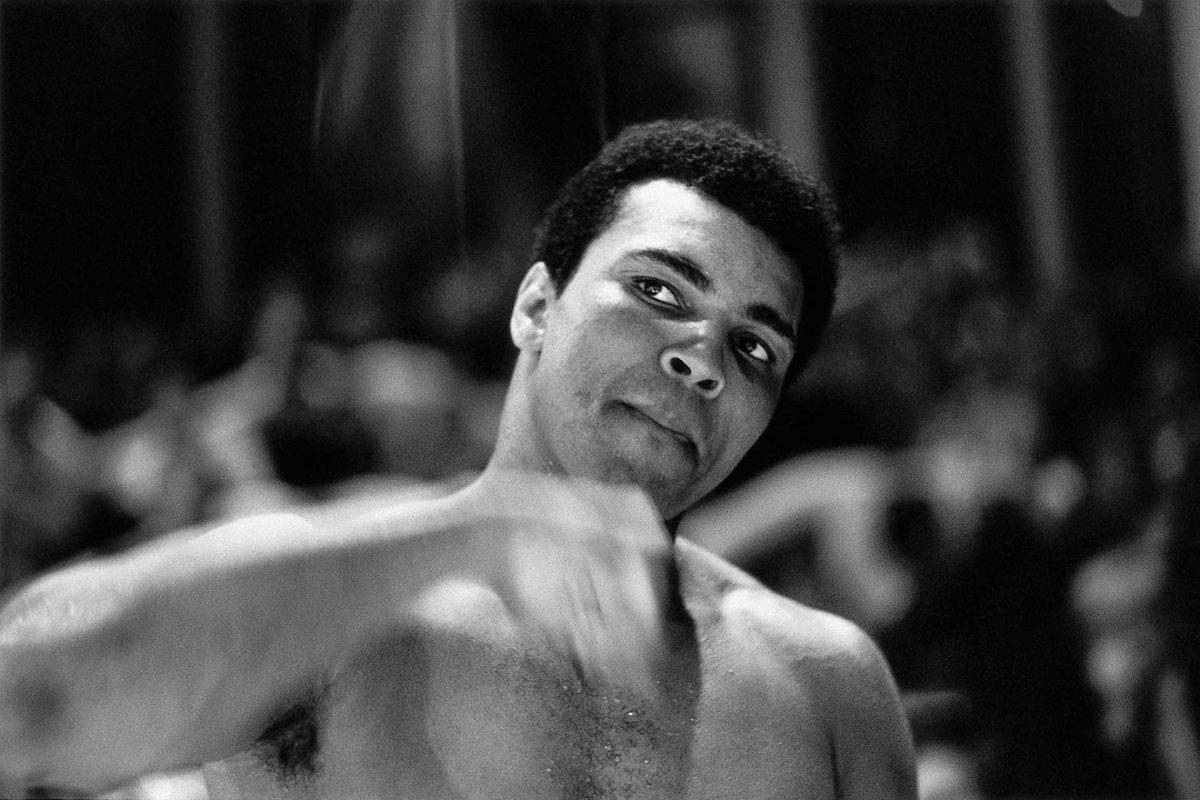
Ali hits a speed bag while warming up for his bout with Bugner in Las Vegas. Ali prepared ferociously for the fight, training 67 rounds the week leading up to the fight, including six rounds the day before the fight.
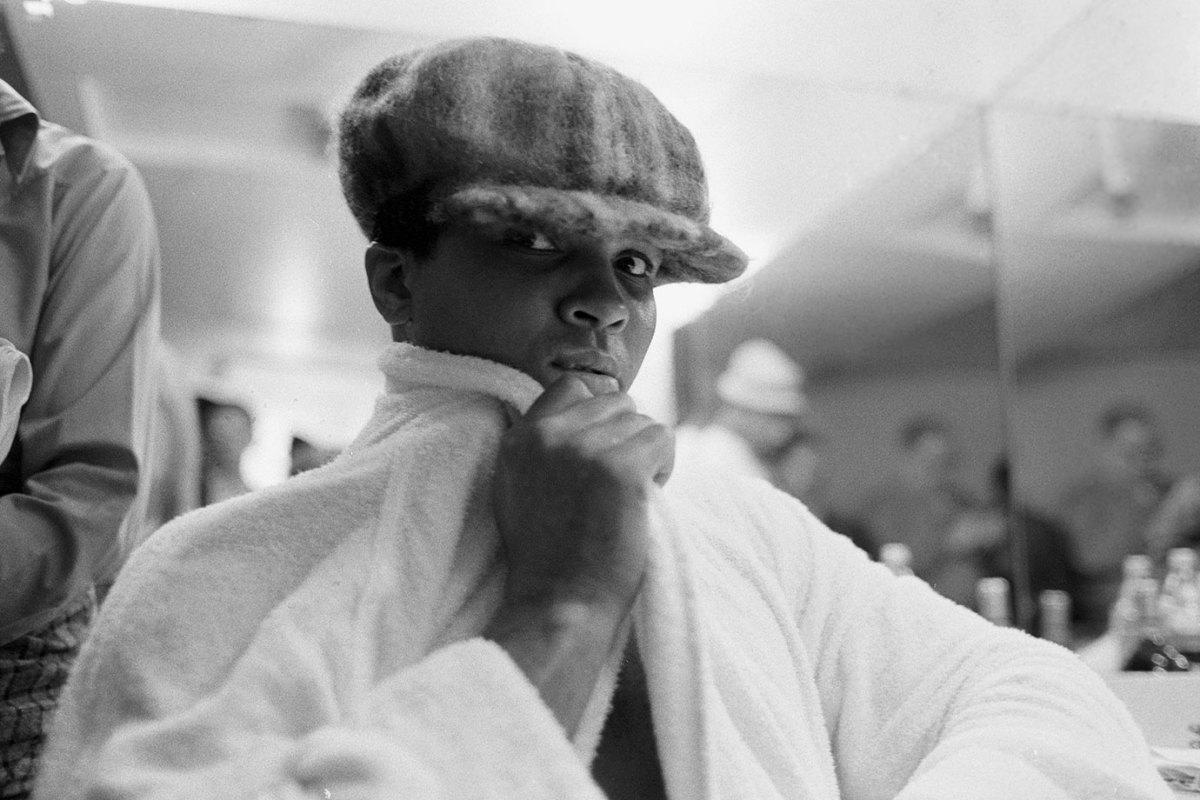
In a lighter pre-fight moment, Ali poses for a portrait wearing a hat in his dressing room before the match with Bugner.
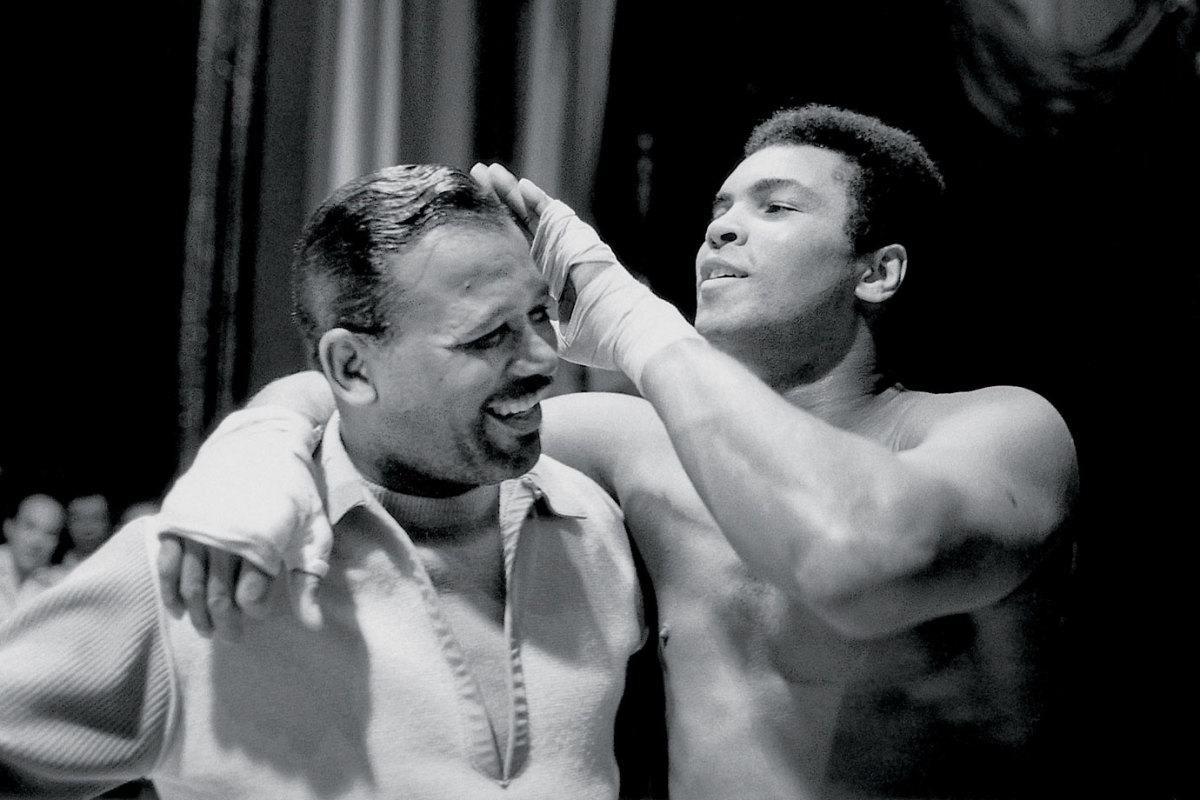
Ali plays with Sugar Ray Robinson's hair in the locker room before his bout with Bugner. The former welterweight and middleweight champion was Ali's childhood idol.
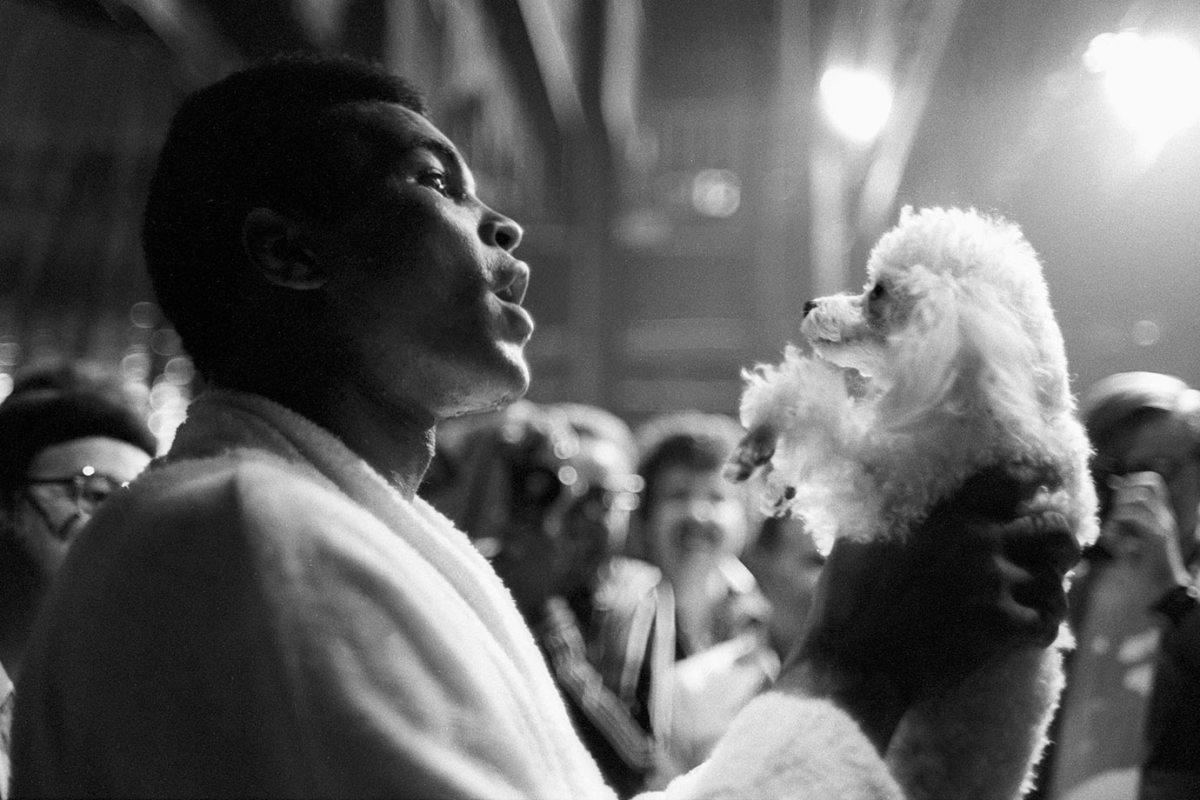
Before the fight with Bugner, Muhammad Ali enjoys a relaxed moment with a poodle at Caesars Palace Hotel. He won the fight with Bugner by unanimous decision.
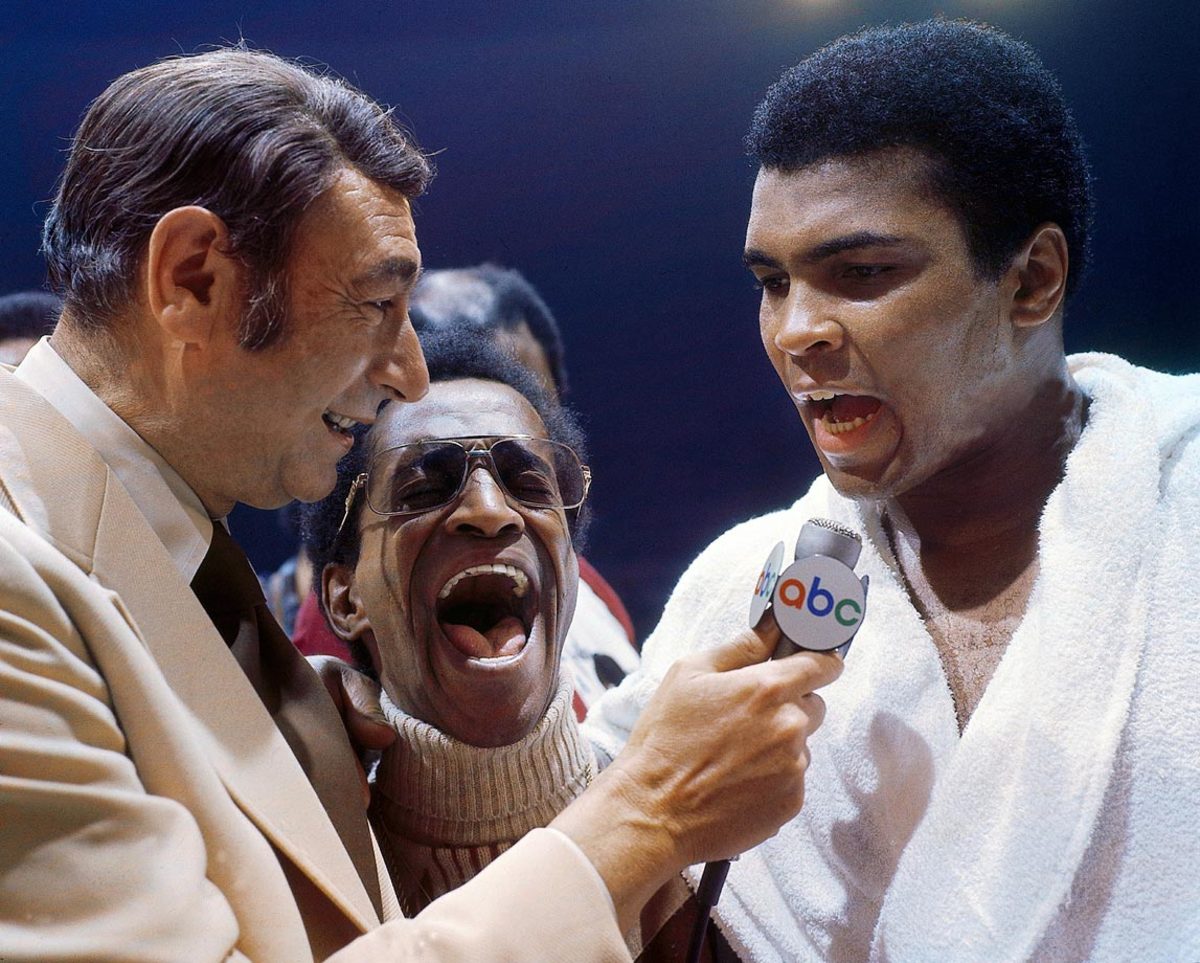
Howard Cosell interviews Ali, with entertainer Sammy Davis Jr. in the middle, after his victory over Joe Bugner by unanimous decision in. Although the fight was never in jeopardy of getting away from him, Ali praised Bugner's legs and said he could be a champion in a few years.
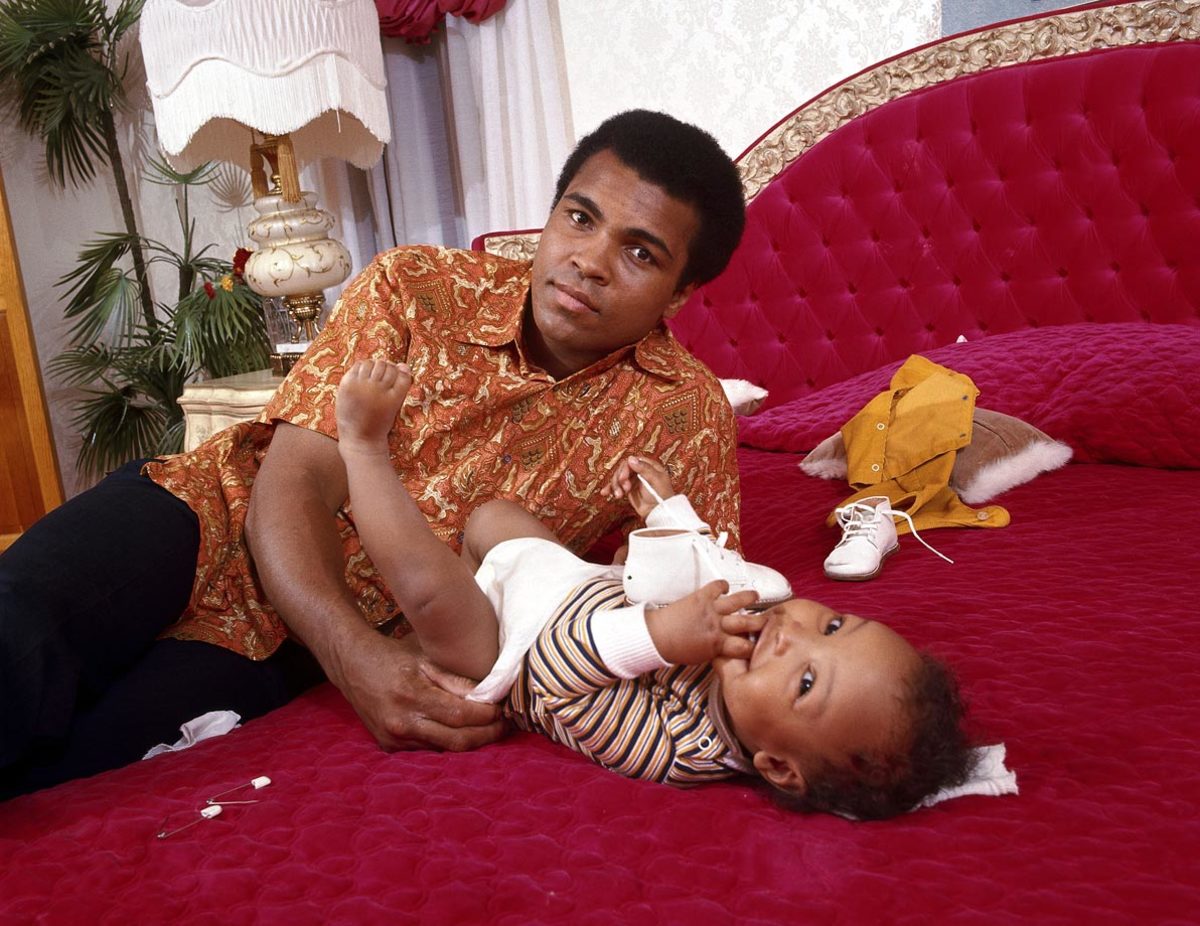
Ali changes the diaper of his son in his bedroom during a photo shoot at the family's home in April 1973. Ali had suffered a broken jaw less than a month earlier in his fight against Ken Norton.
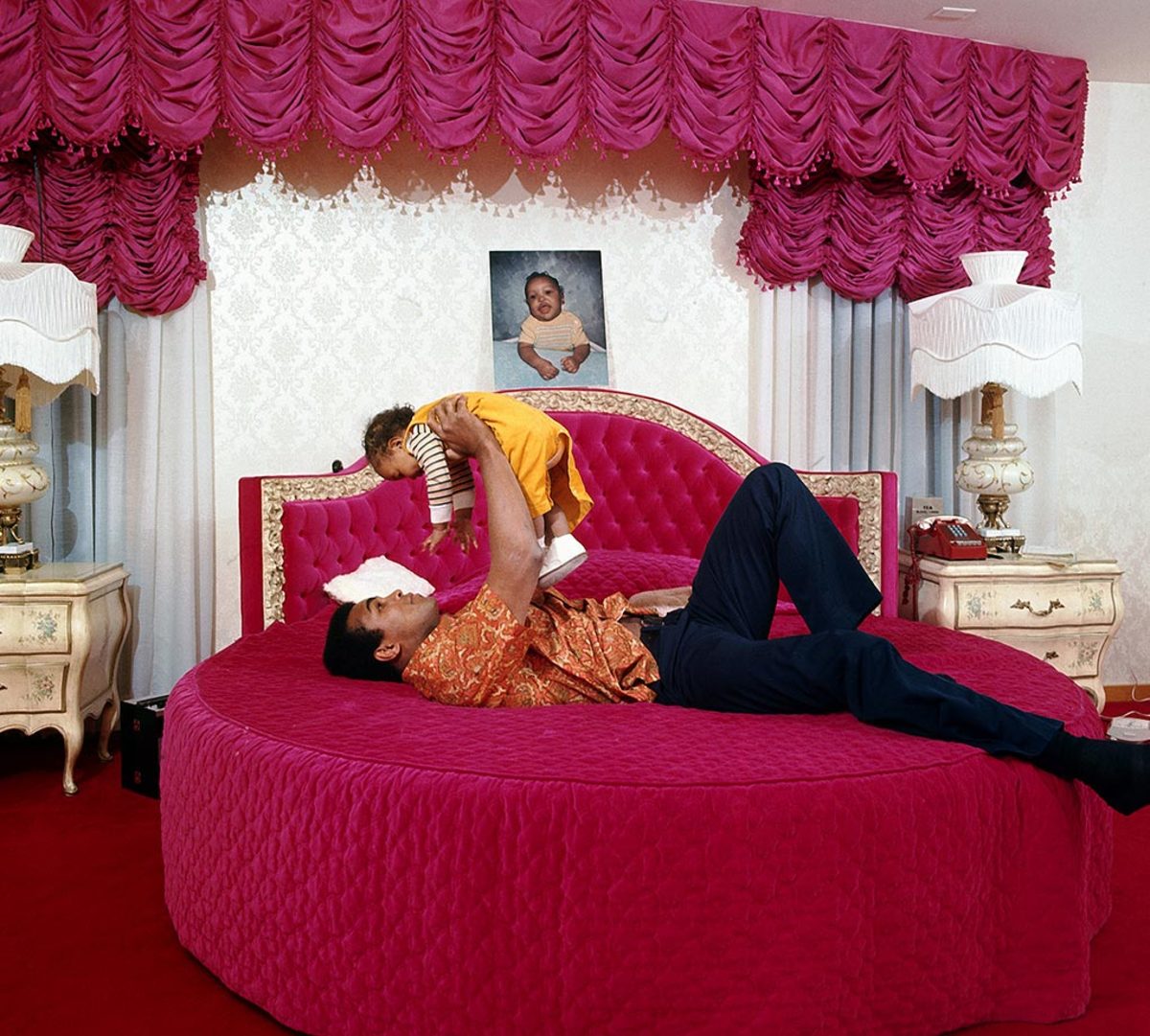
In the wake of his split decision loss to Norton, Ali plays with his son in his bedroom at home in Cherry Hill, N.J.
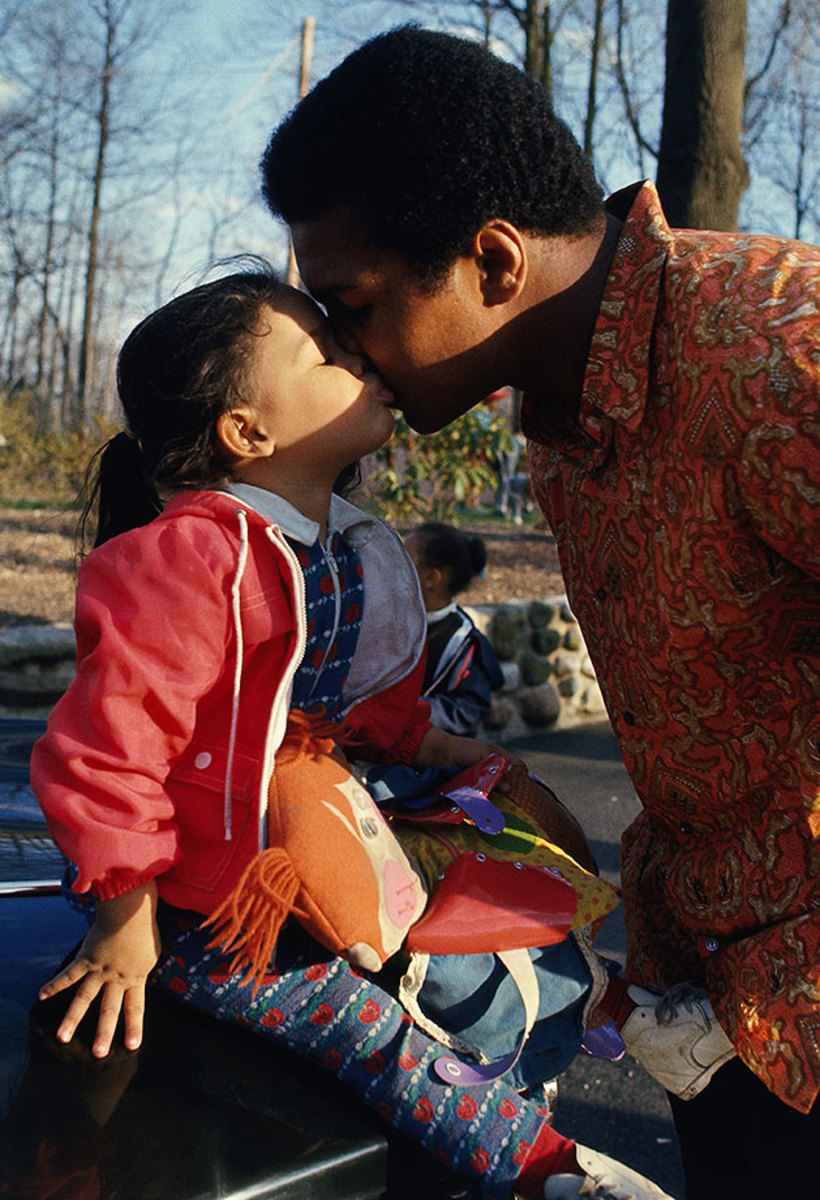
Ali kisses his daughter Jamillah outside of their home following the loss to Norton, just the second defeat of his career.
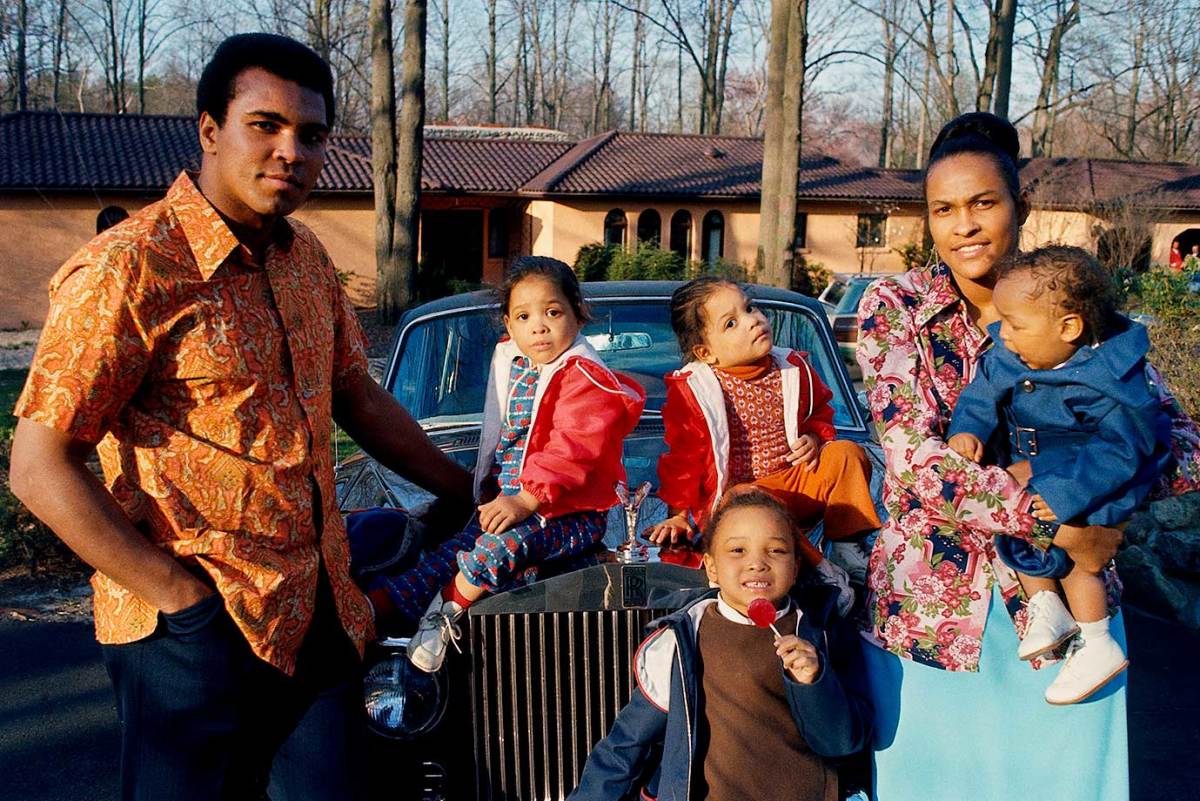
The Ali family standing outside their New Jersey home. To the right of Muhammad Ali are his twin daughters, Jamilllah and Rasheda, daughter Maryum and his wife, Khalilah, holding their son Ibn Muhammad Ali Jr.
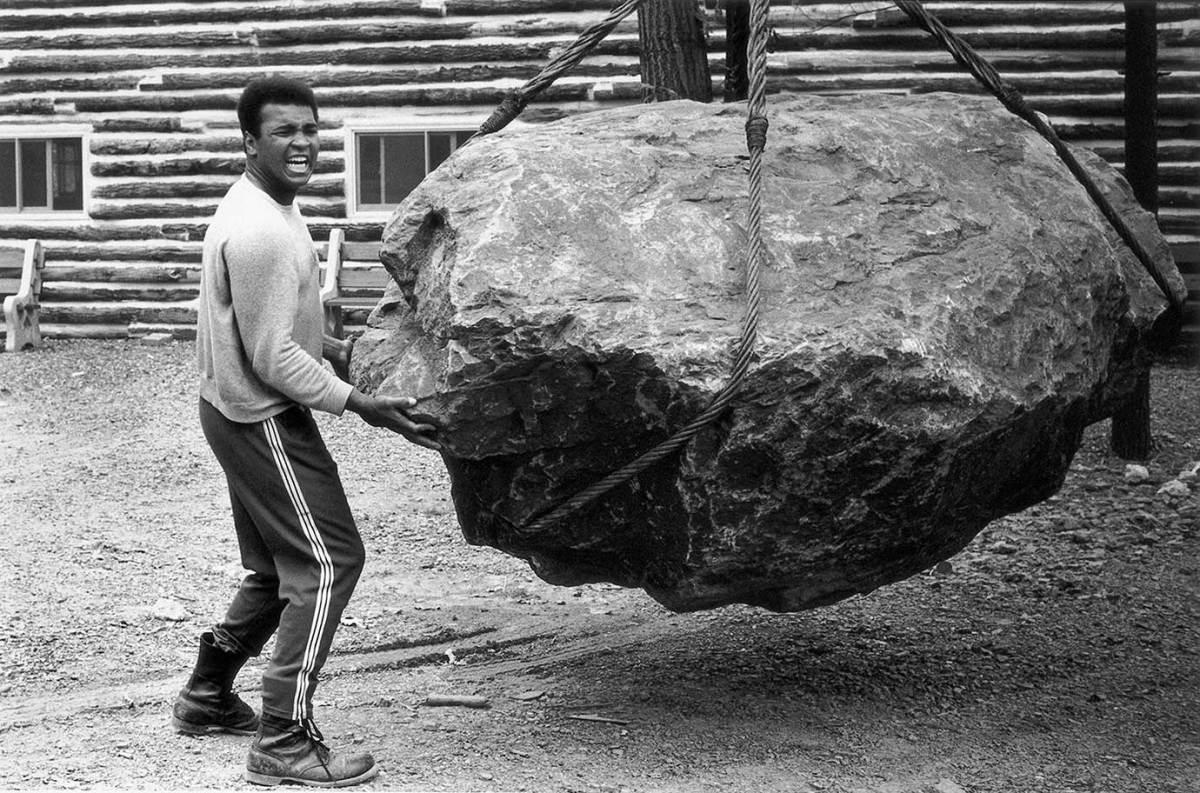
At his training camp cabin, Ali pushes a boulder during a photo shoot in Deer Lake, Penn., in August 1973. Ali was training for his rematch against Ken Norton, who broke his jaw five months earlier.
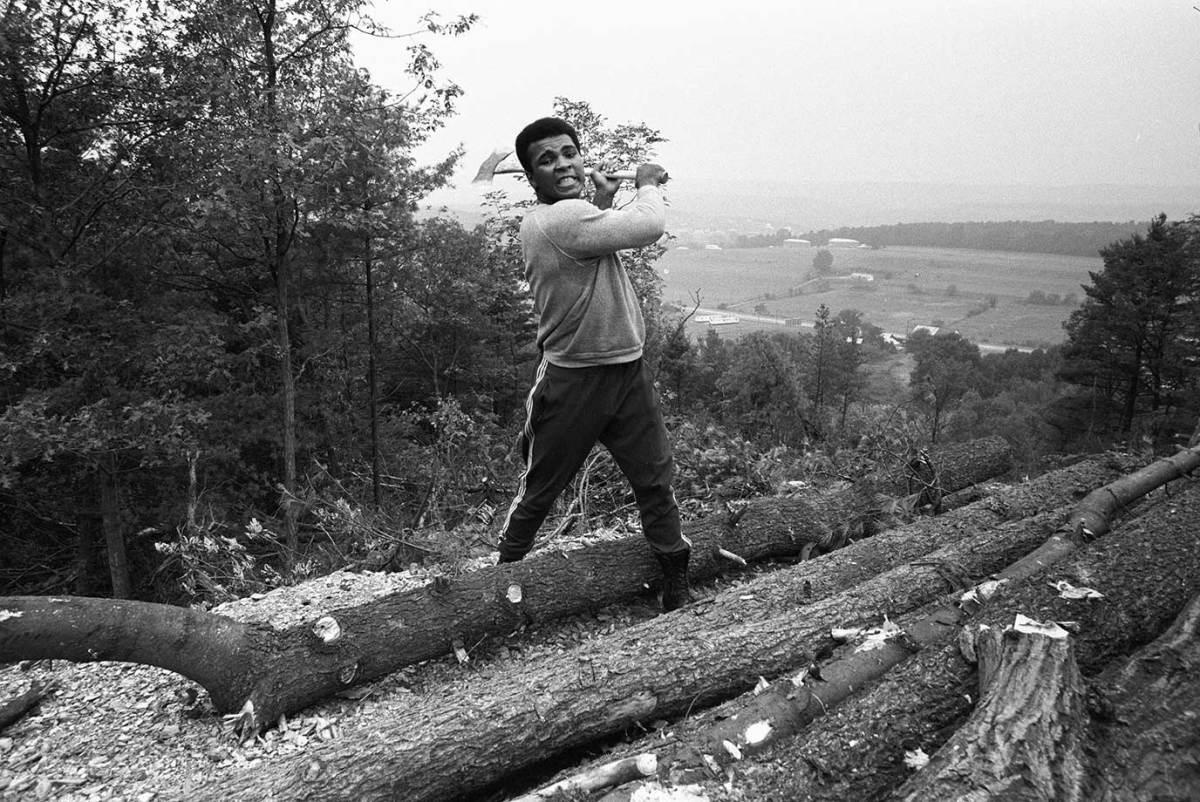
Ali chops wood at his cabin in Deer Lake. He referred to the training camp as "fighter's heaven" and used it to prepare for fights away from the spotlight.
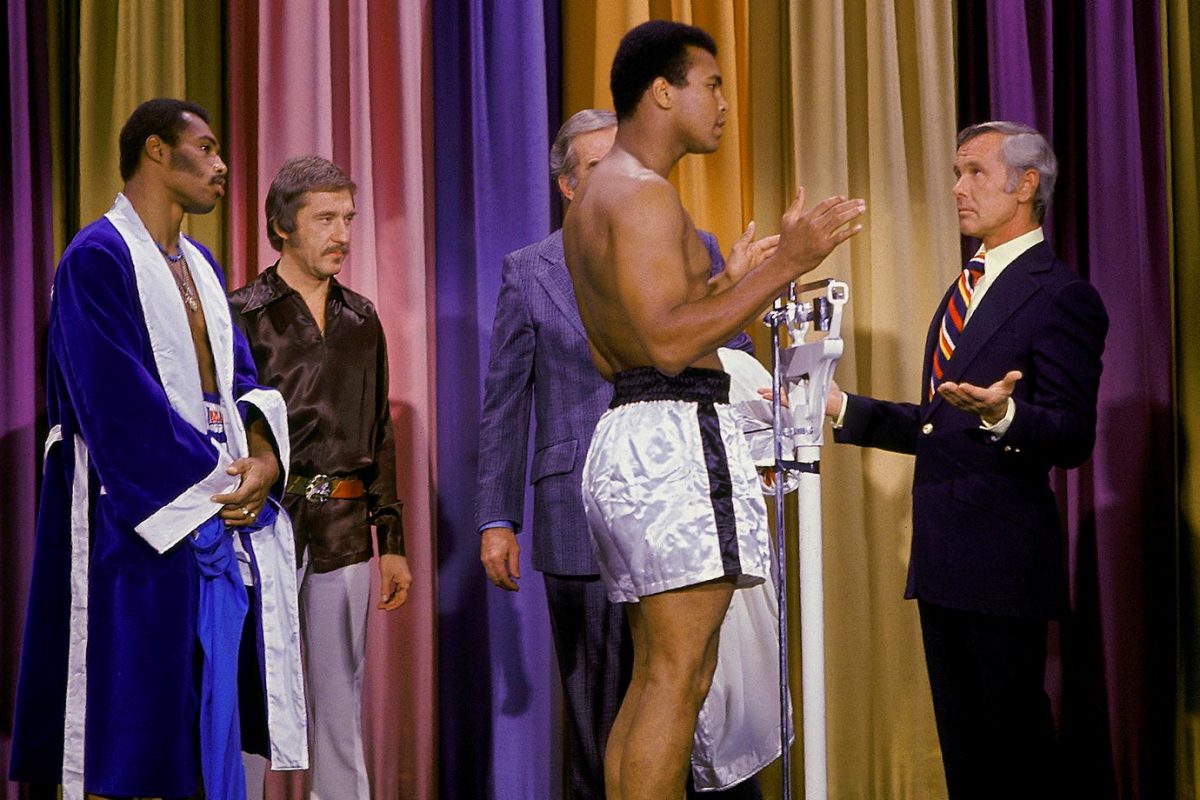
The fighters weigh in on the Tonight Show with Johnny Carson ahead of Ali and Ken Norton's September 1973 fight.
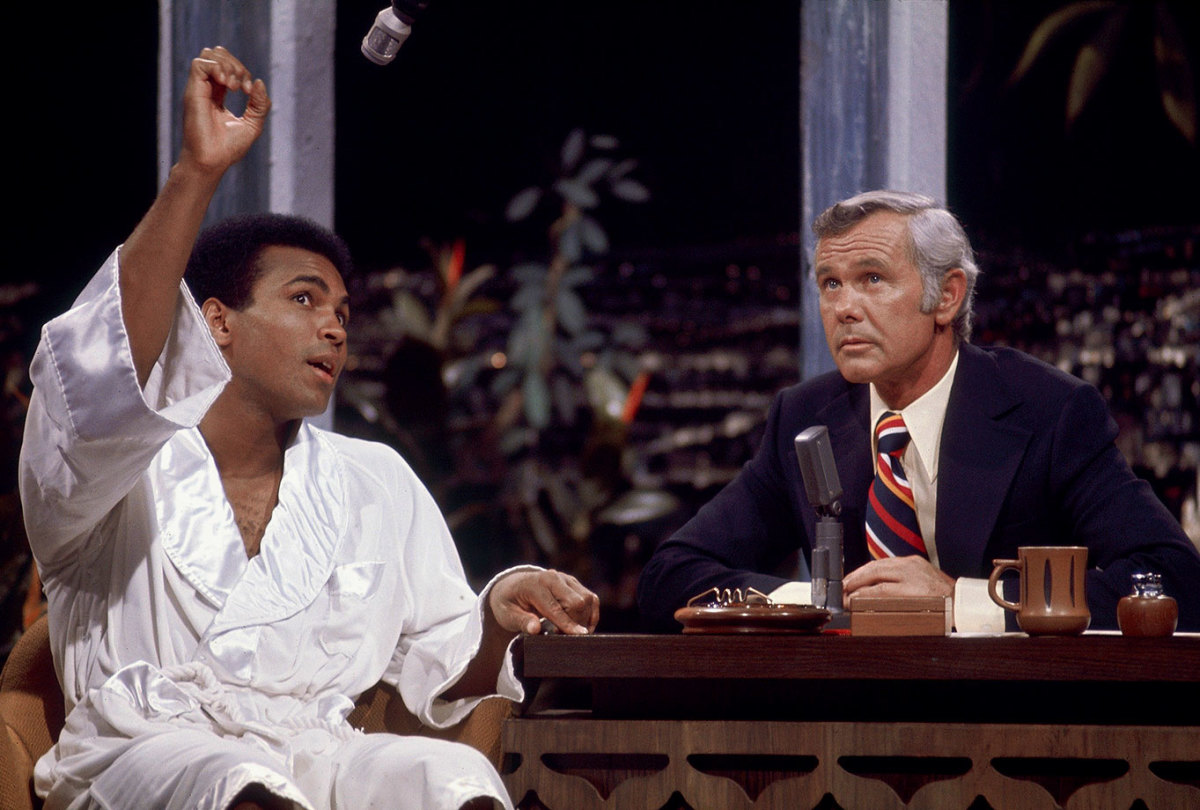
Johnny Carson listens to Ali on the Tonight Show three days before his rematch with Norton. Ali would avenge his earlier loss to Norton, winning a narrow split decision.
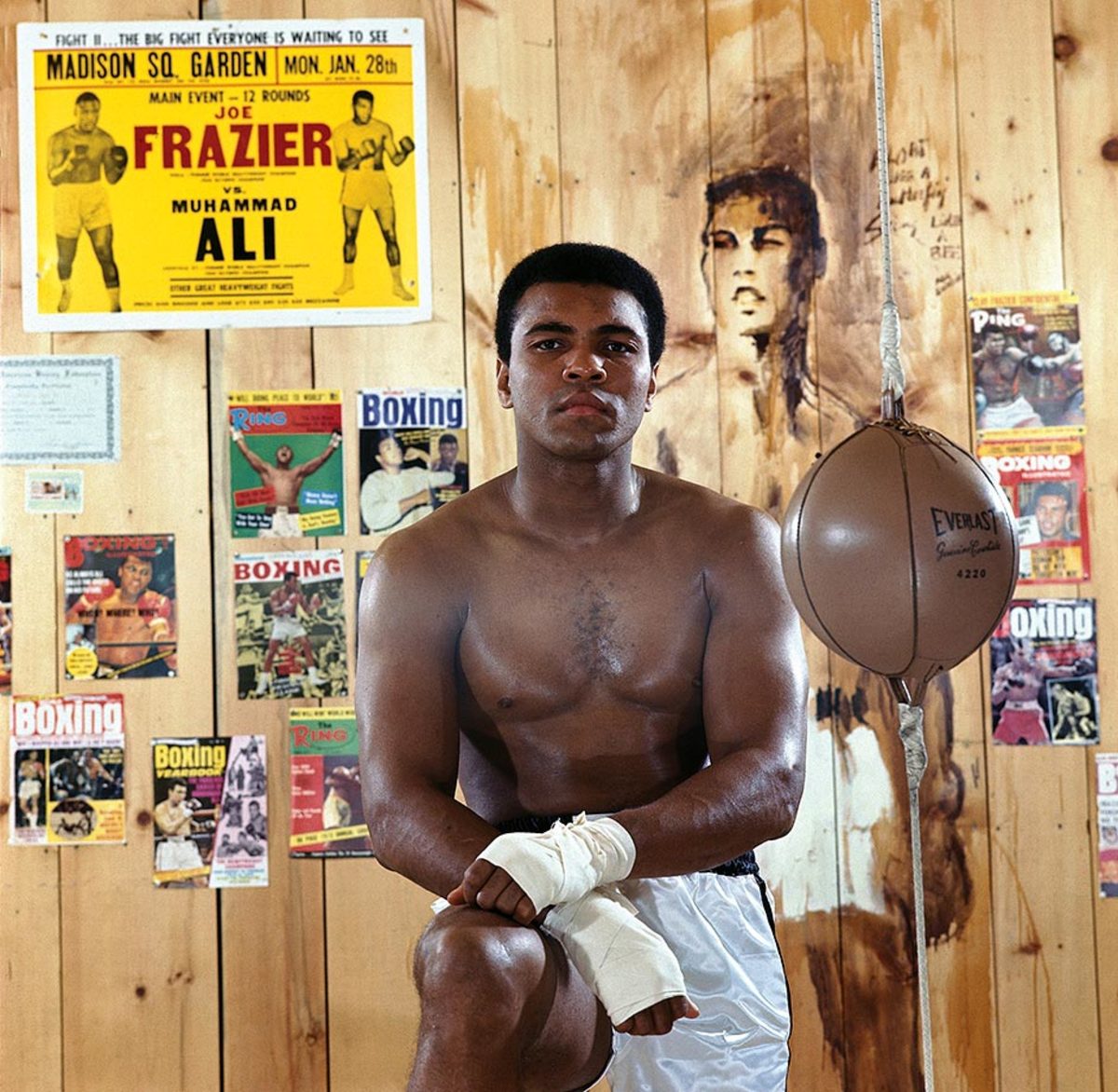
Ali poses in front of posters and magazine covers from throughout his career at his training camp cabin in Deer Lake in 1974.
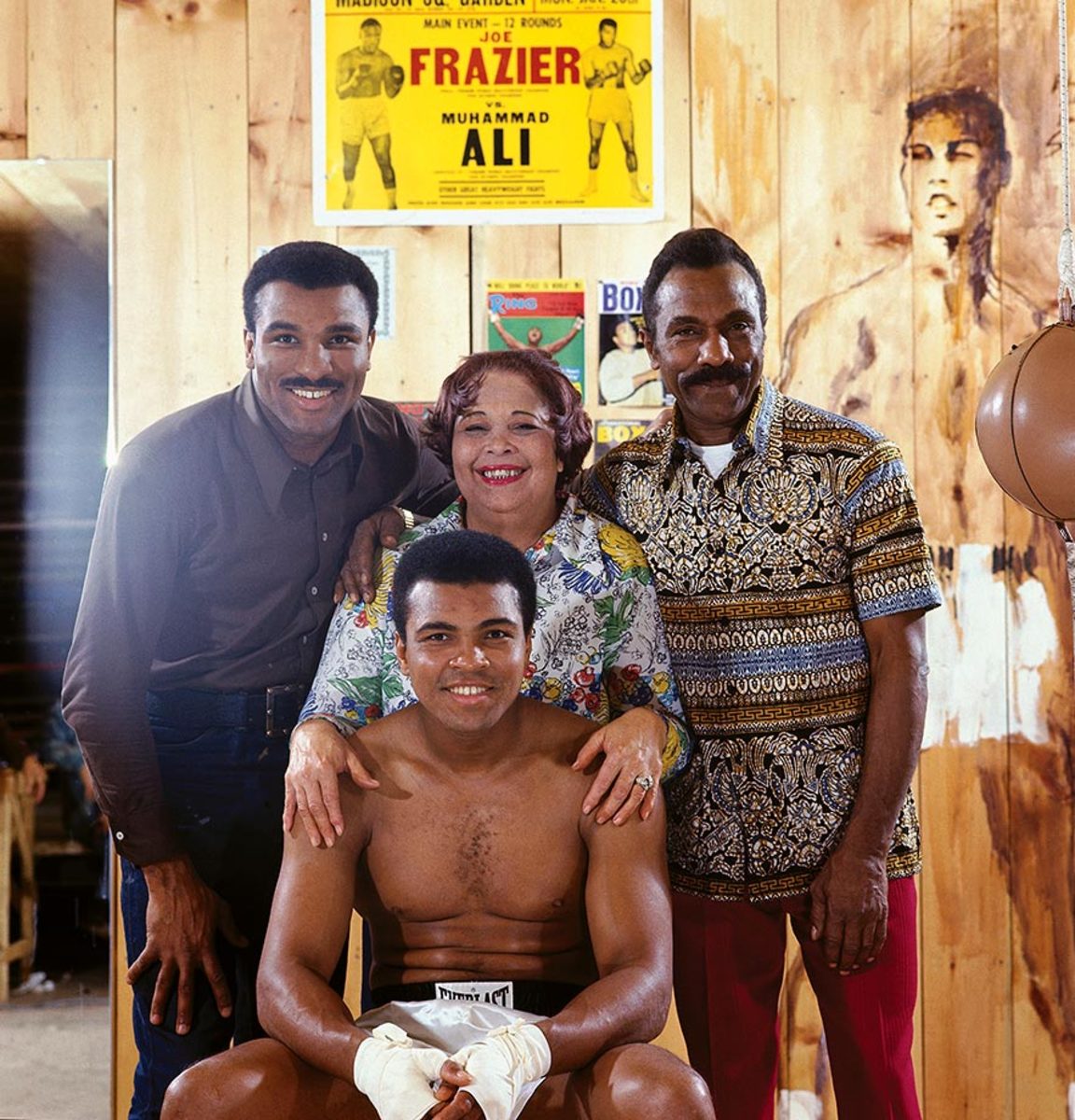
Ali poses with members of his family in front of a poster from his first fight with Joe Frazier. Ali's brother, Rahman Ali; mother, Odessa Clay; and father, Cassius Clay Sr. stand behind the boxer.
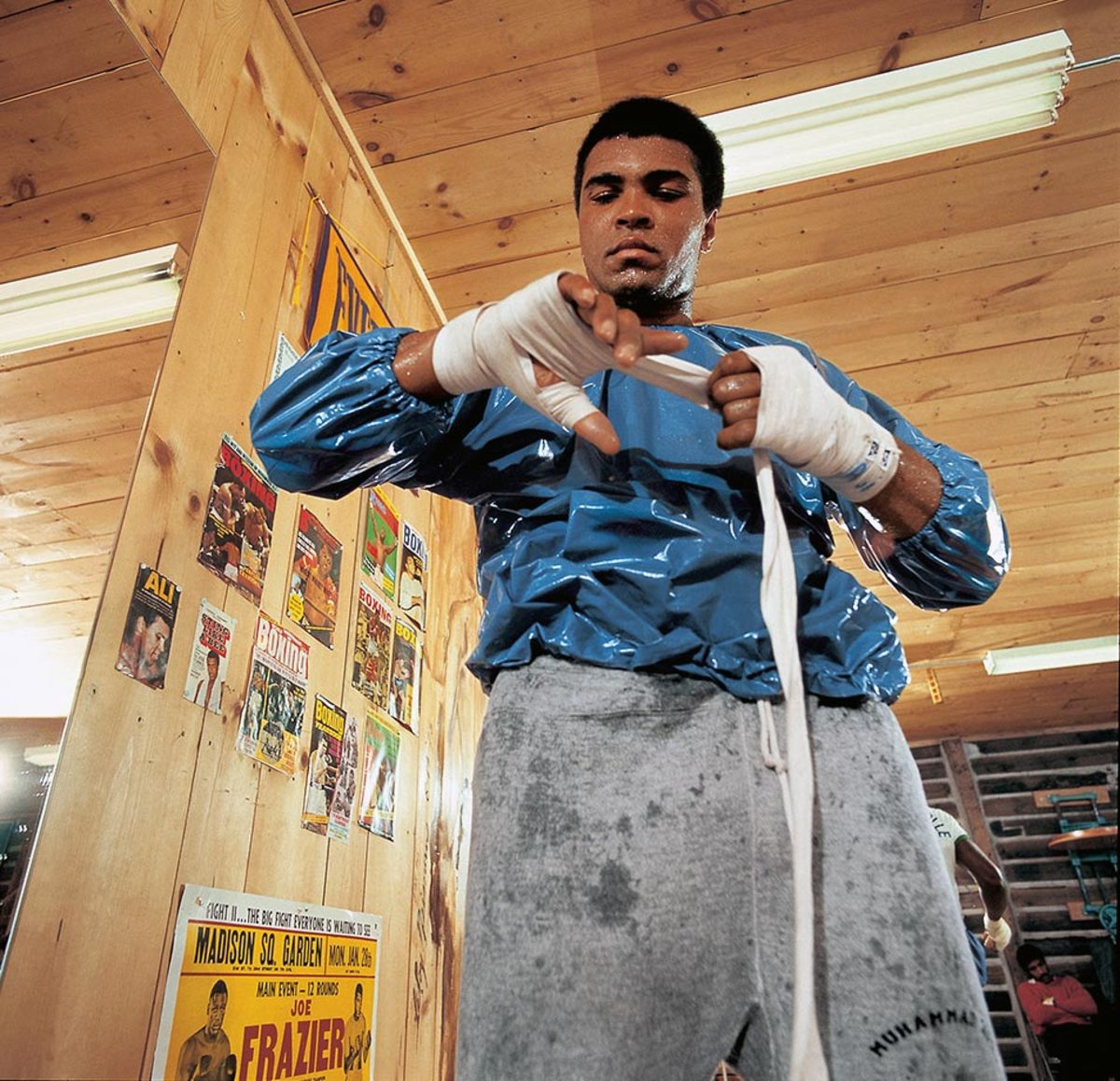
Less than three weeks before his rematch with Joe Frazier on Jan. 28, 1974, Ali wraps his hands while wearing a sauna suit at his training camp cabin.
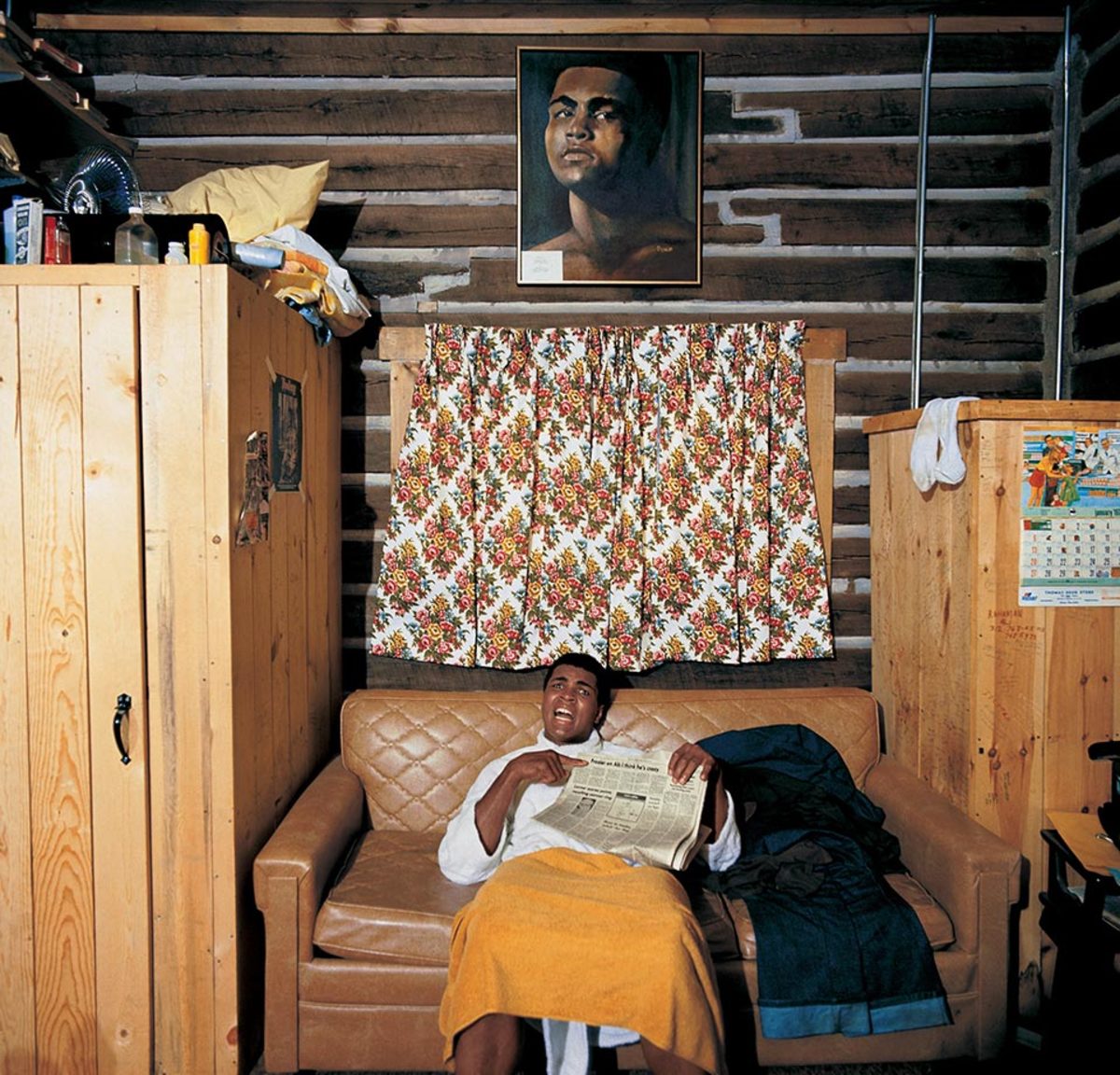
Ali holds a newspaper at his cabin in January 1974. He is pointing to a headline that reads, "Frazier On Ali, I Think He's Crazy." Ali and Frazier fought for the second time later that month with Ali winning by a unanimous decision.
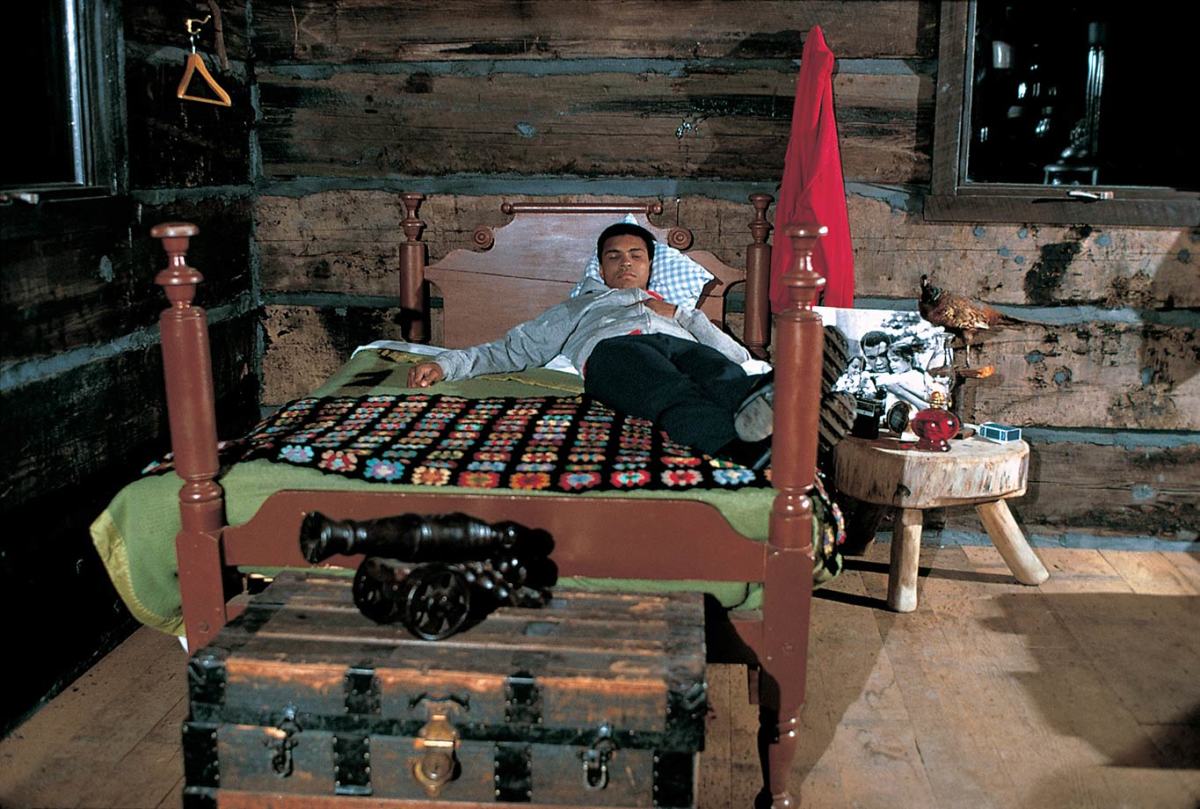
Ali lies on his bed at his cabin during the January 1974 photo shoot.
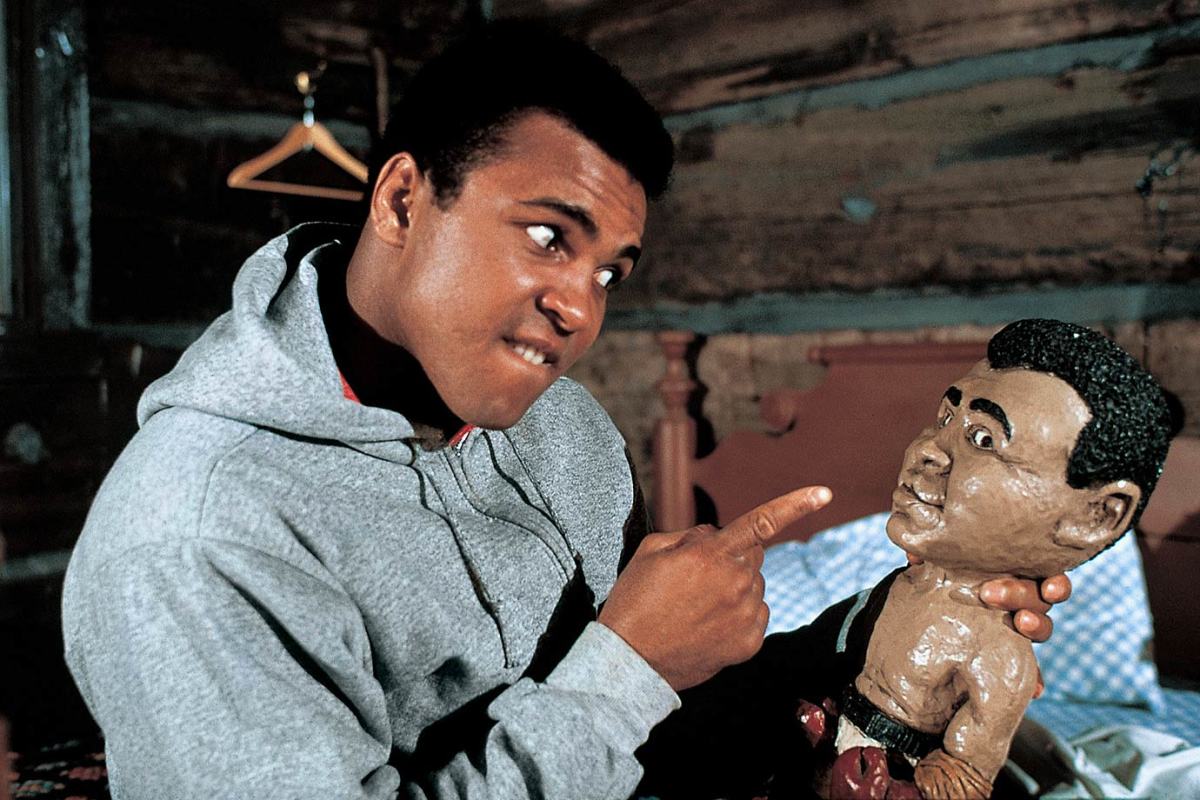
His smaller incarnation stares straight back as Ali plays with a doll of himself during the same 1974 shoot at his training camp cabin.
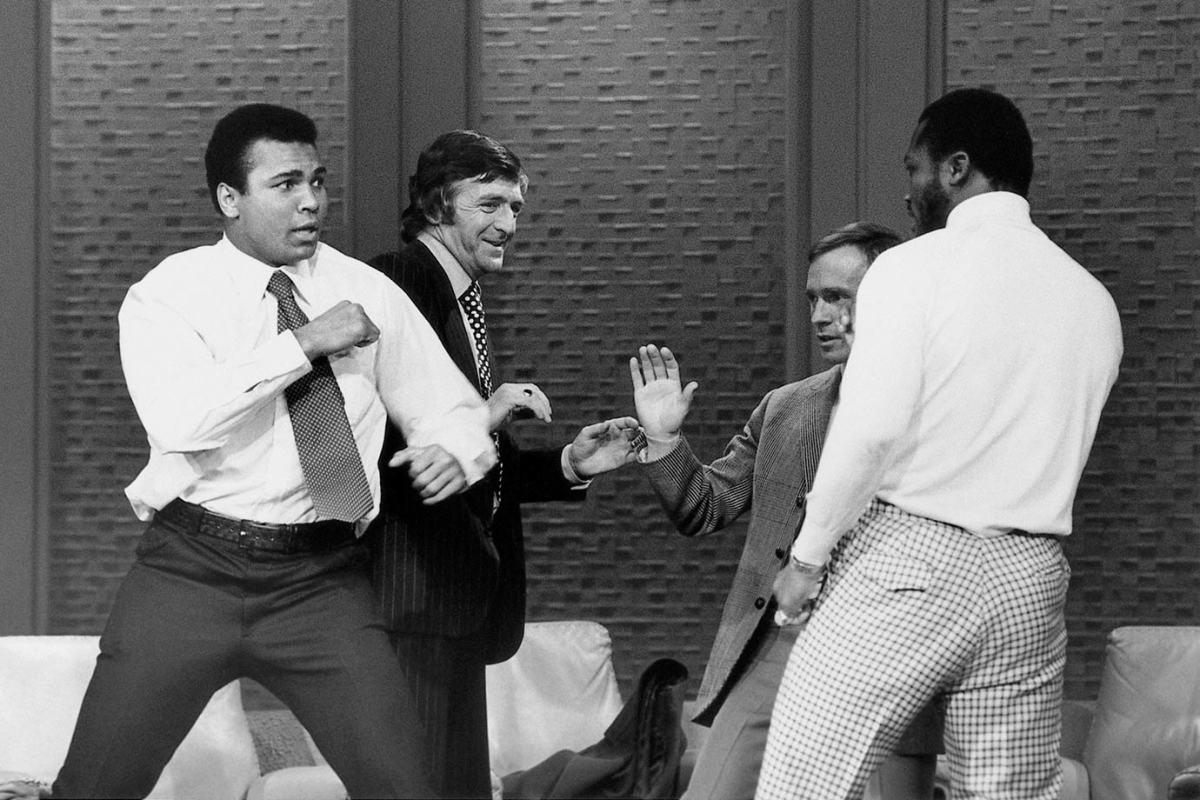
Ali and Joe Frazier fight on the set of The Dick Cavett Show while reviewing their 1971 bout in advance of their 1974 rematch. Ali called Frazier ignorant, to which Frazier took exception. As the studio crew tried to calm Frazier down, Ali held Frazier by the neck, forcing him to sit down and sparking a fight. The television set fight amped up anticipation of their January 1974 bout.
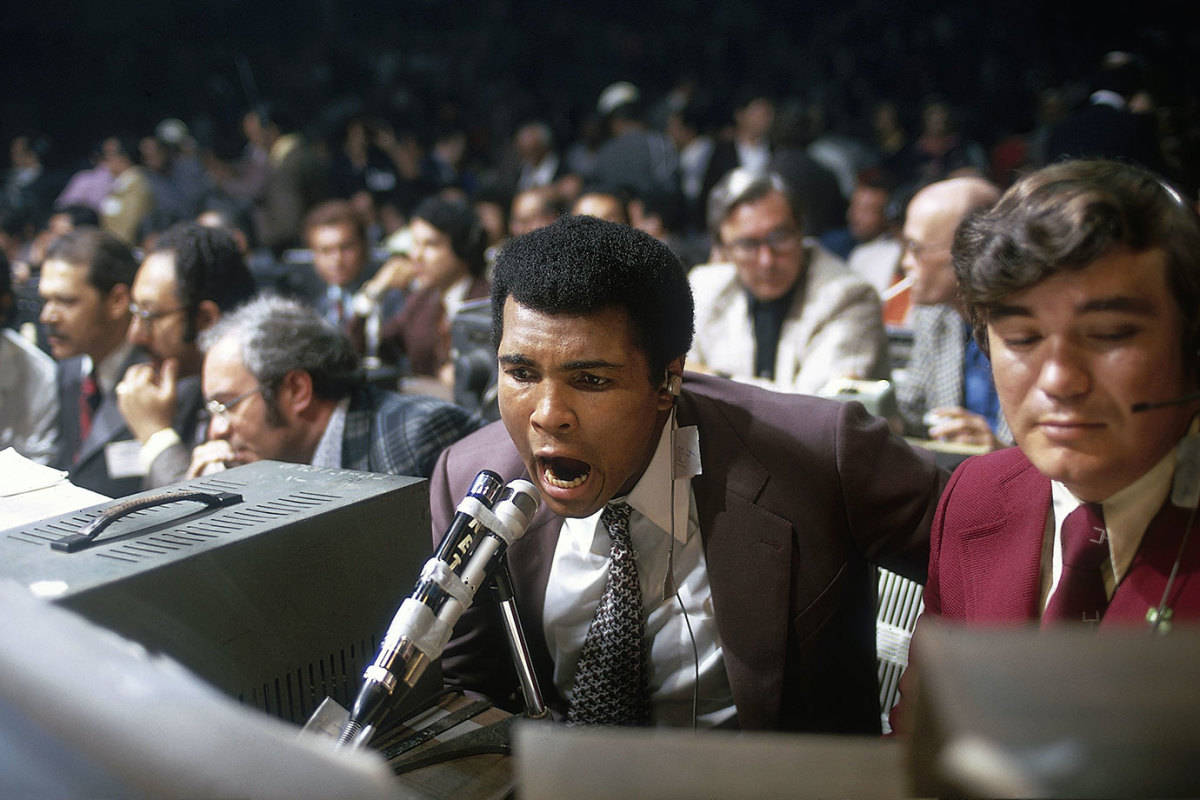
Exploring a different side of the sport, Ali broadcasts the fight between George Foreman and Ken Norton in March 1974. Foreman won the fight by technical knockout in the second round, setting up the showdown with Ali in Zaire.
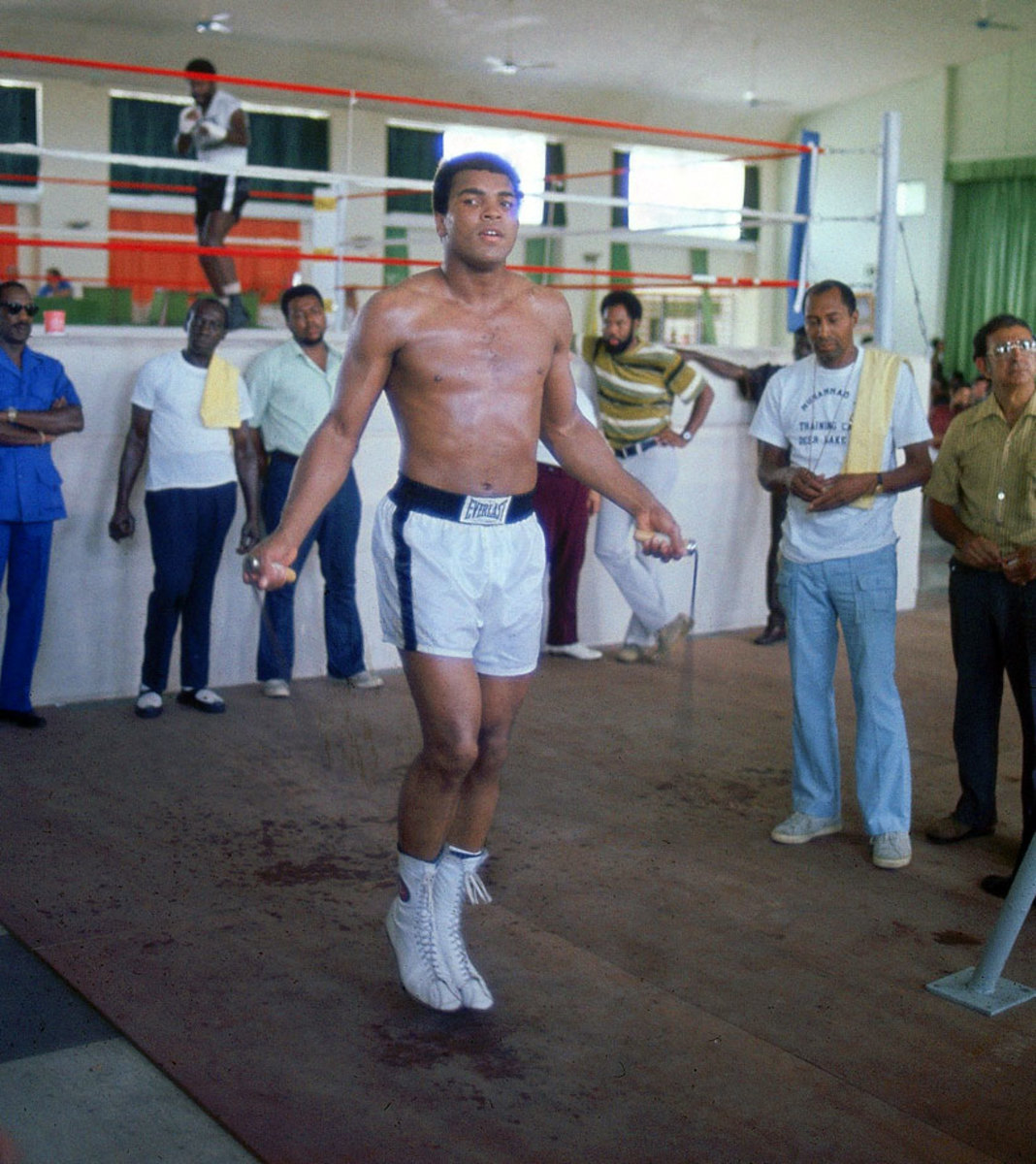
Ali jumps rope at the Salle de Congres in Kinshasa, Zaire, while training for his heavyweight title fight against George Foreman. Both Ali and Foreman spent most of the summer of 1974 training in Zaire to adjust to the climate.
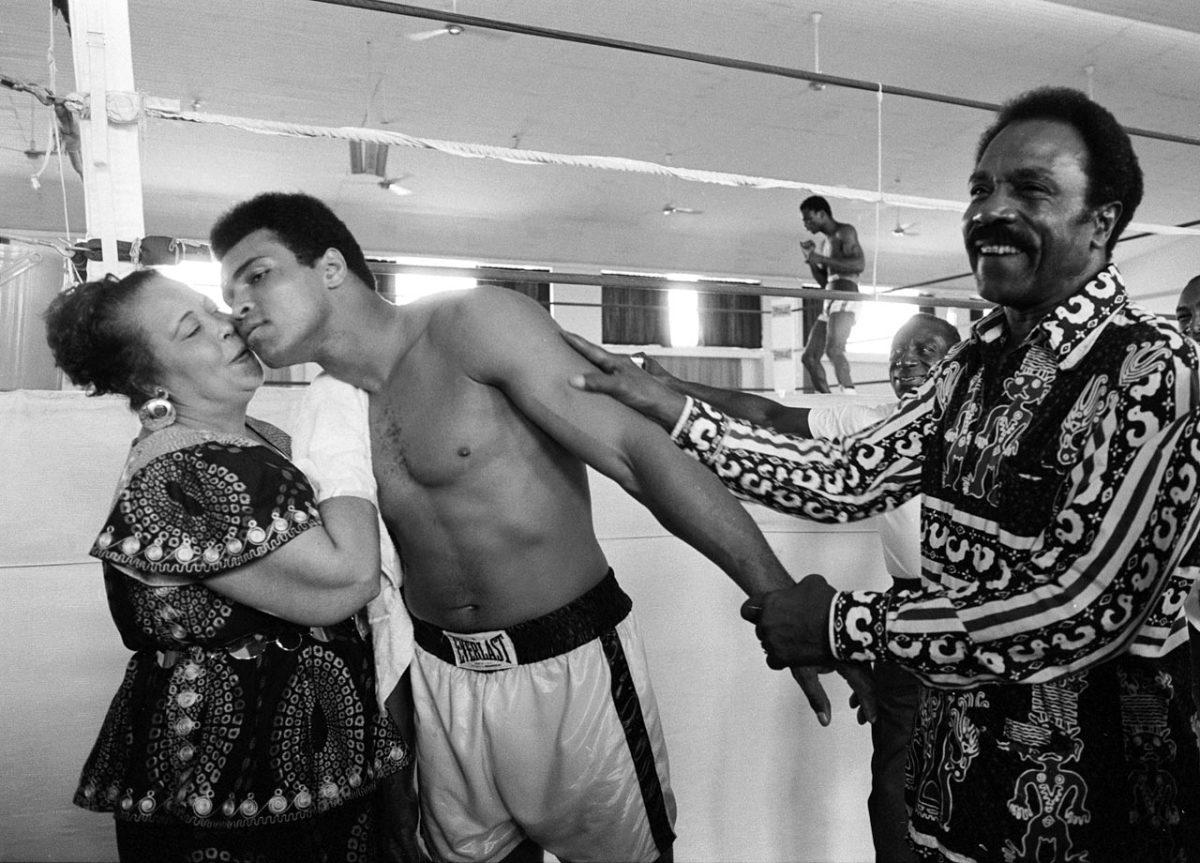
While training before his fight with George Foreman, Ali kisses his mother, Odessa Clay, while his father, Cassius Clay Sr., looks on. Ali's superior strategy and ability to take a punch led him to his upset victory as he absorbed body blows from Foreman before he responded with powerful combinations to Foreman's head.
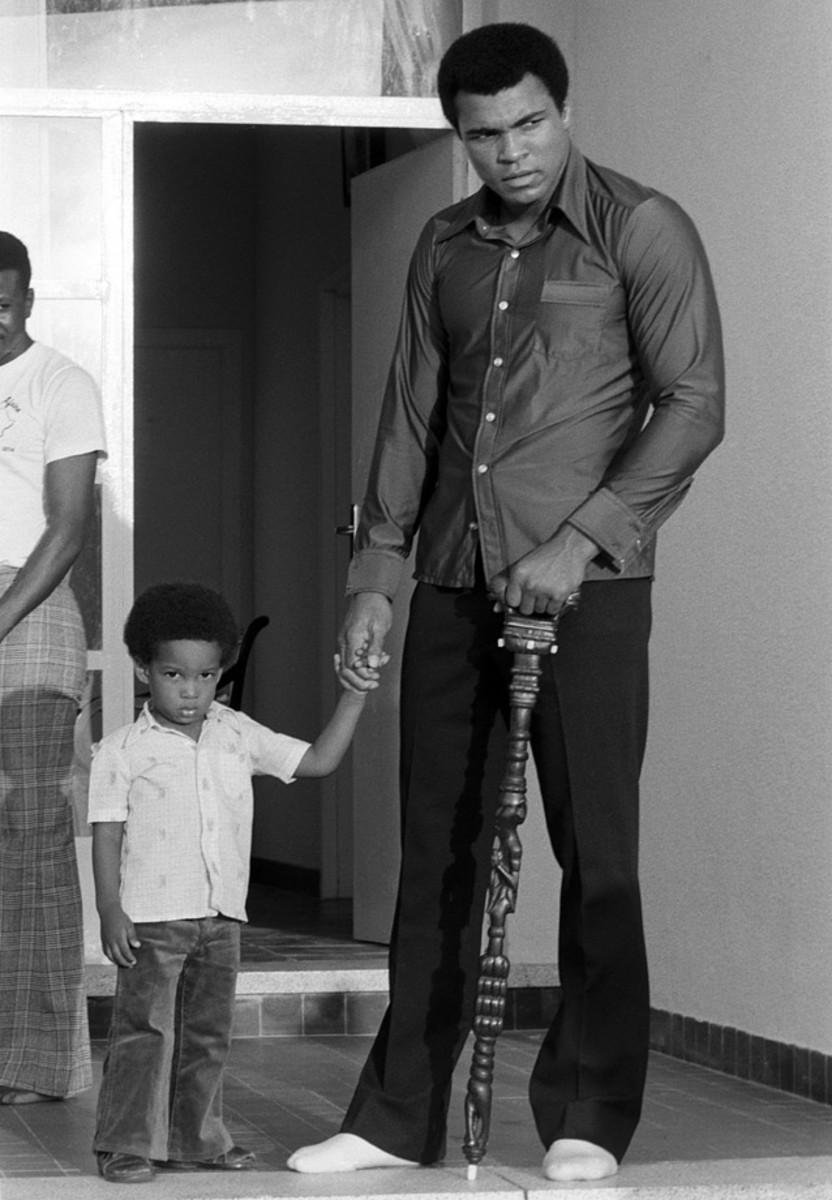
Four days before the fight, Ali holds the hand of his son Ibn in Zaire. Ali successfully courted the favor of the Zaire crowd, prompting chants of "Ali bomaye!" — translated as "Ali, kill him!"
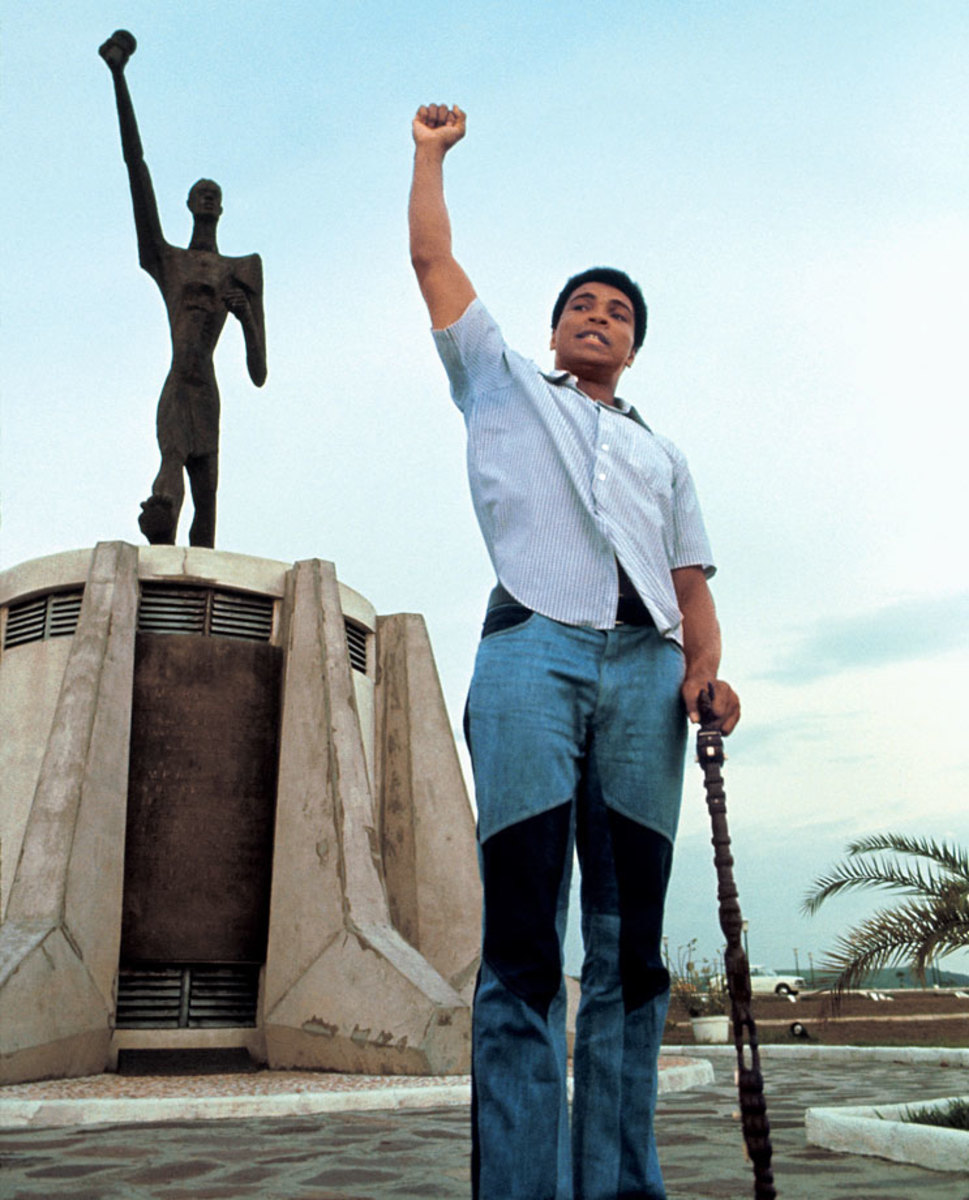
Ali poses in front of the Le Militant statue at the presidential complex that was the site of Ali's January heavyweight title bout with Foreman. The fight was originally set for a month earlier, but Foreman suffered a cut near his eye during training, forcing a delay.
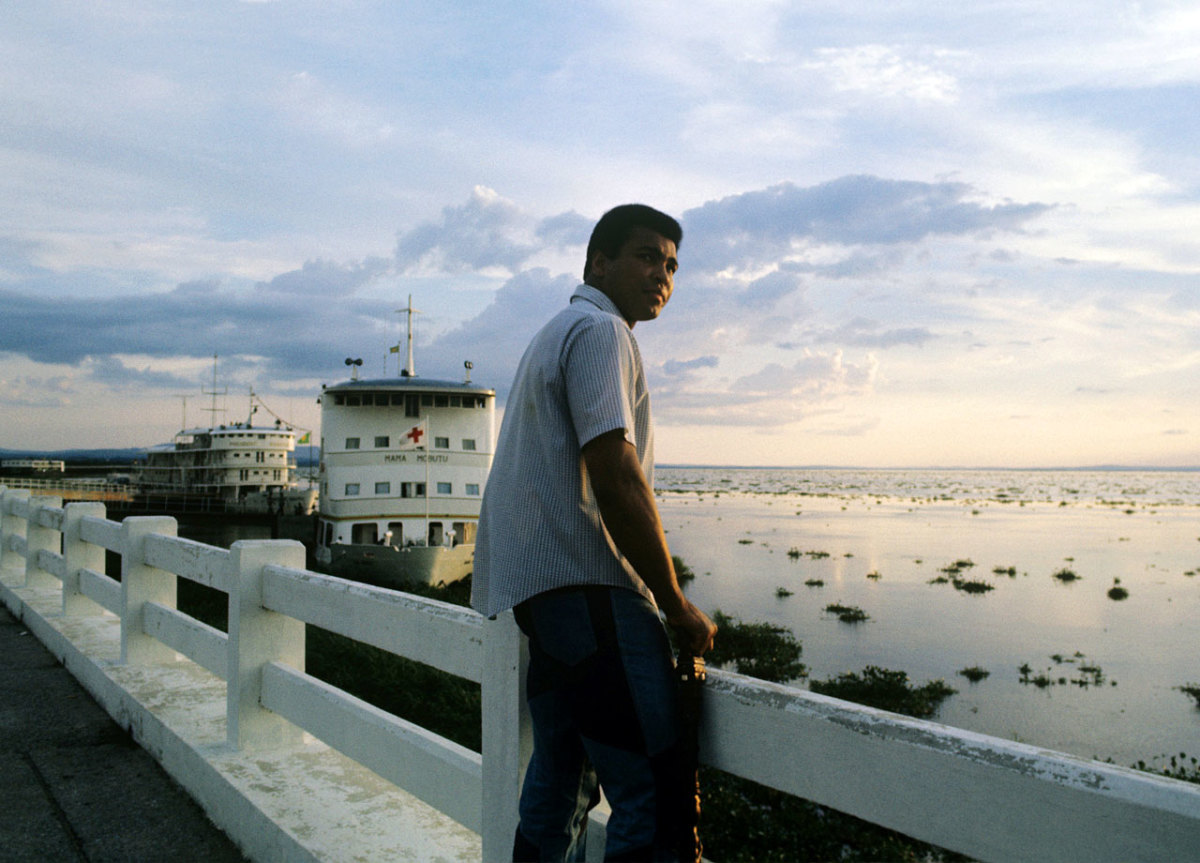
Ali stands against the railing on the River Zaire watching the sunset four days before the Rumble in the Jungle. The fight was sponsored by Zaire to achieve the $5 million purse promoter Don King had promised both Ali and Foreman.
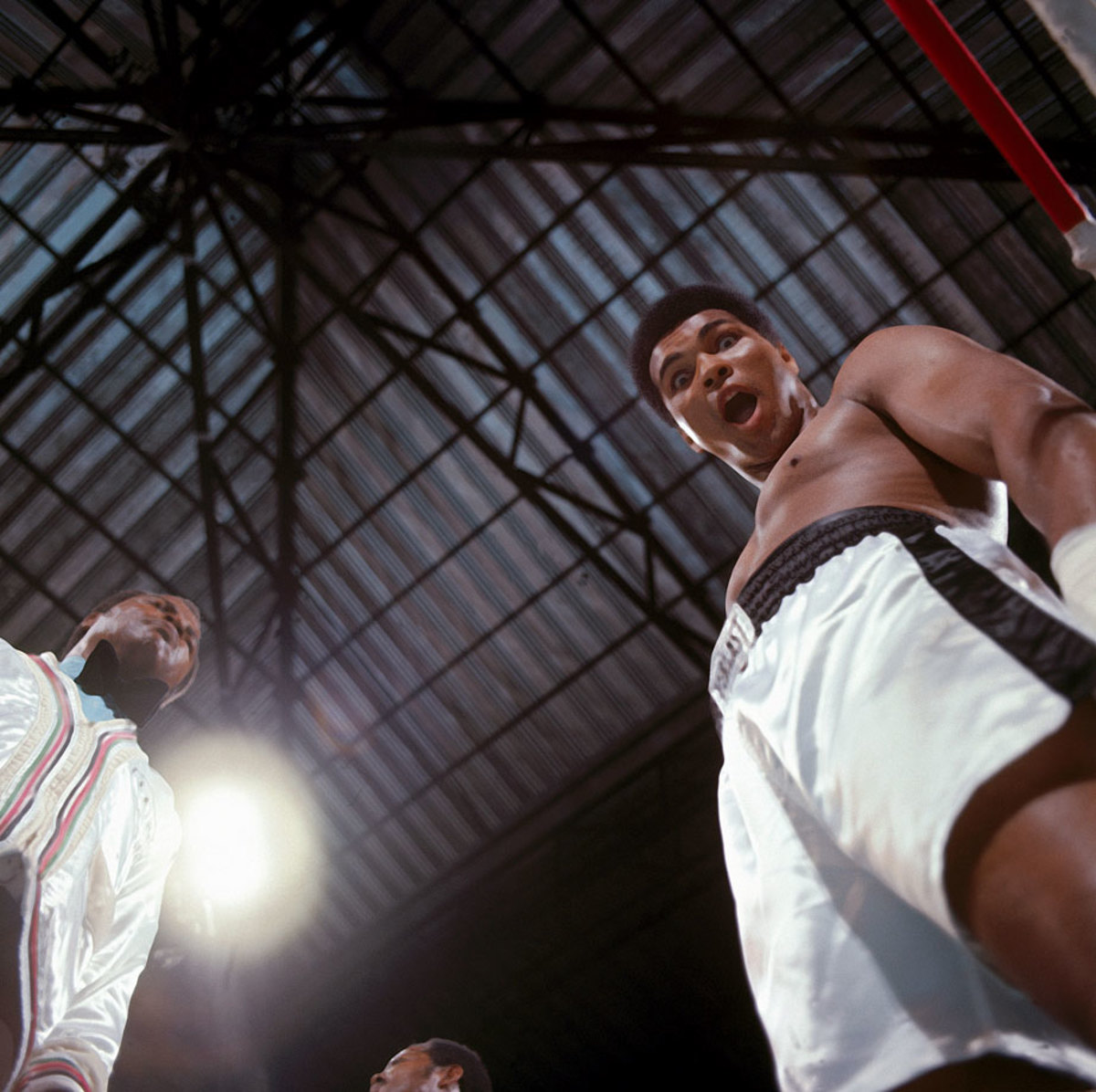
Before employing his famous rope-a-dope strategy against Foreman, Ali makes a face at the camera. Ali allowed Foreman to throw many punches but only into his arms and body, and when Foreman tired himself out from the mostly ineffective punches, Ali took control of the fight.
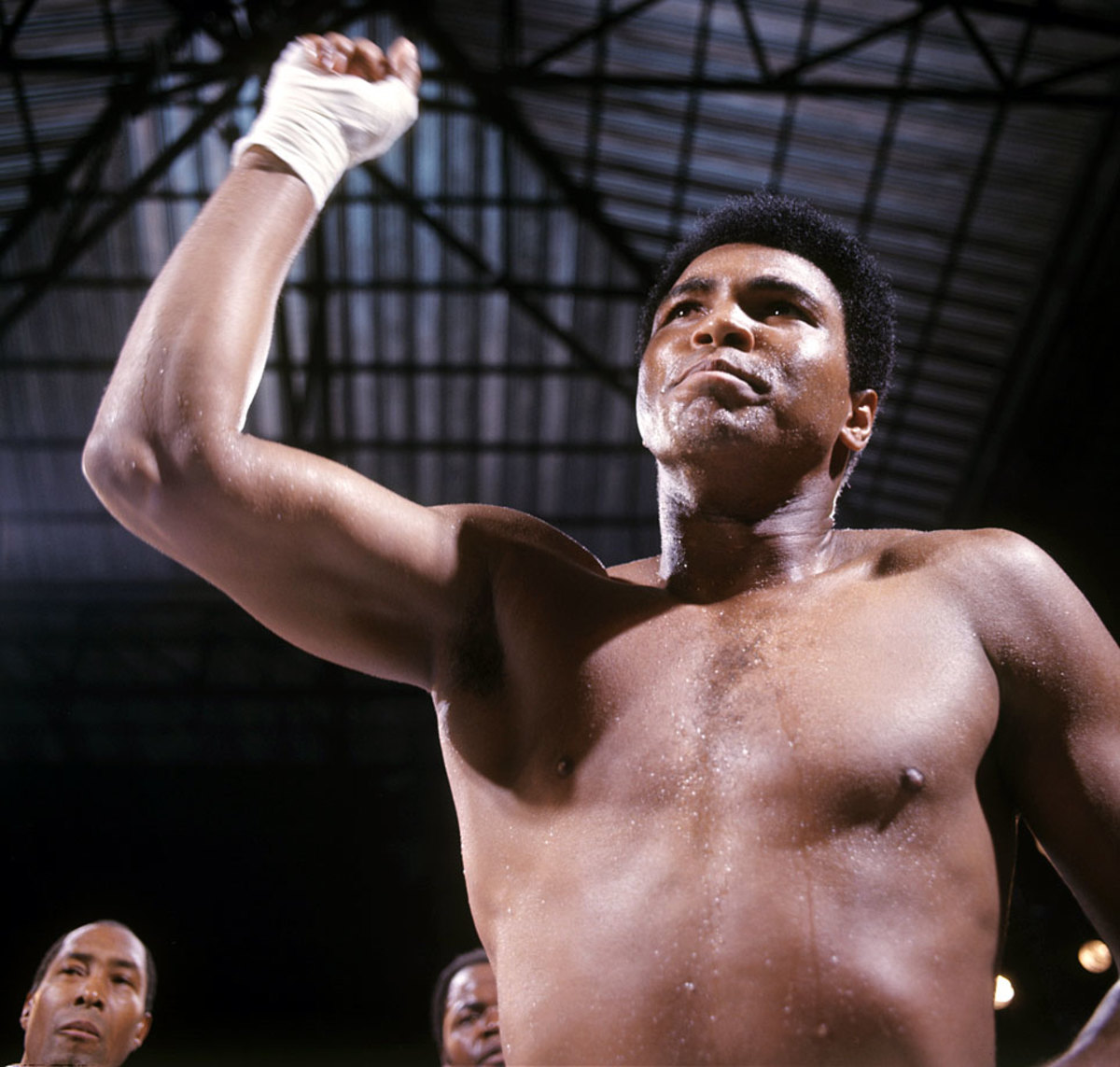
Ali points before his bout with Foreman. The victory over his favored opponent made him the heavyweight champion of the world for the first time since he was stripped of his titles in 1967.
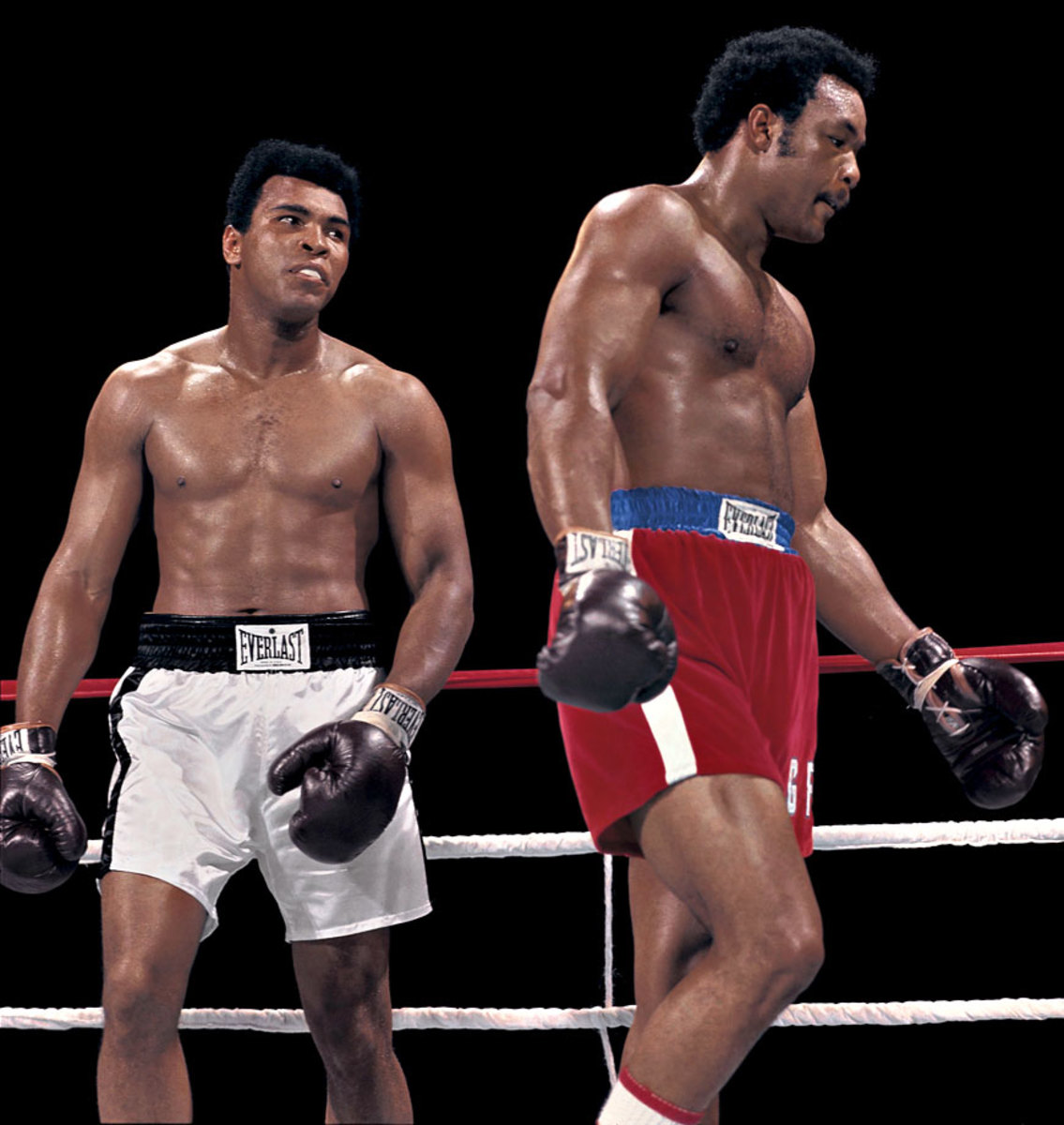
Ali stares at George Foreman during the Rumble in the Jungle. Ali earned his shot at the heavyweight title by defeating Joe Frazier in January 1974, avenging a loss three years earlier.
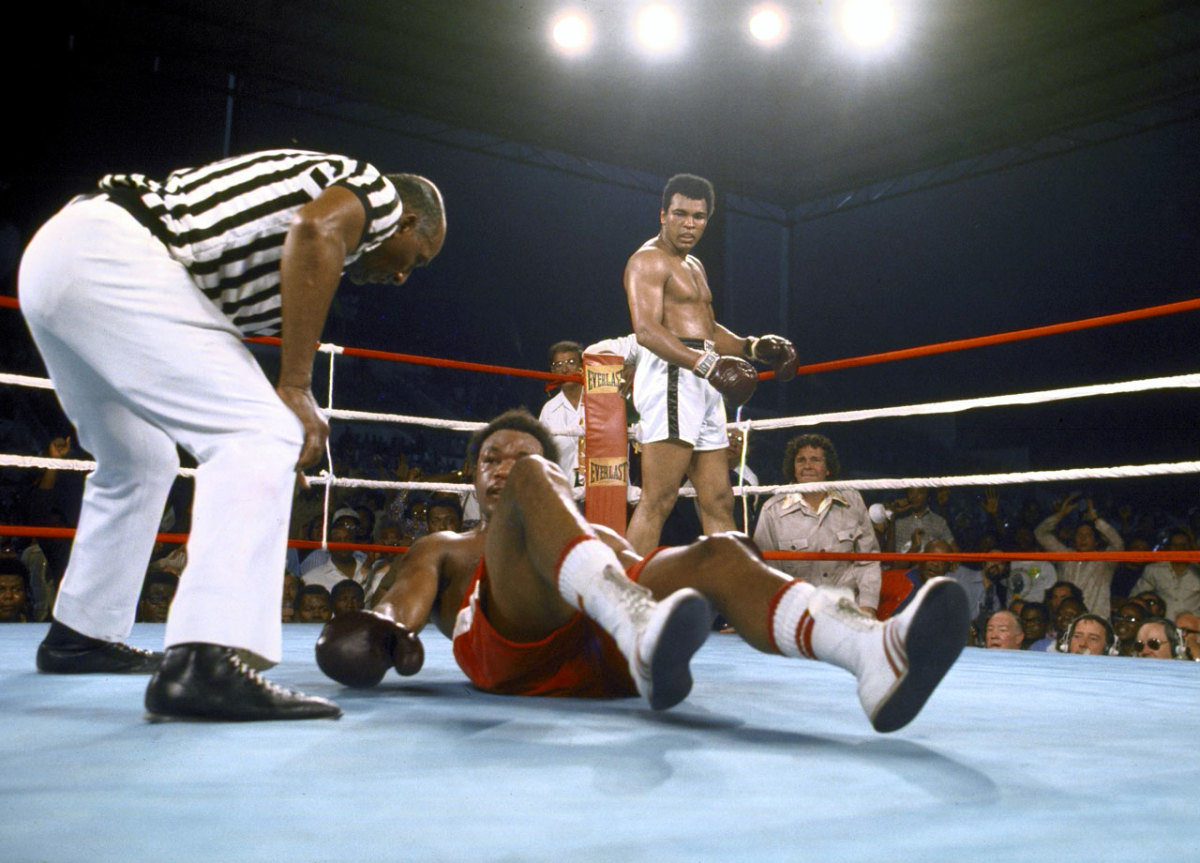
Foreman lies down on the canvas as Ali stands in the background during the Rumble in the Jungle. Ali knocked Foreman down with a five-punch combination in the eighth round, and referee Zack Clayton counted him out.
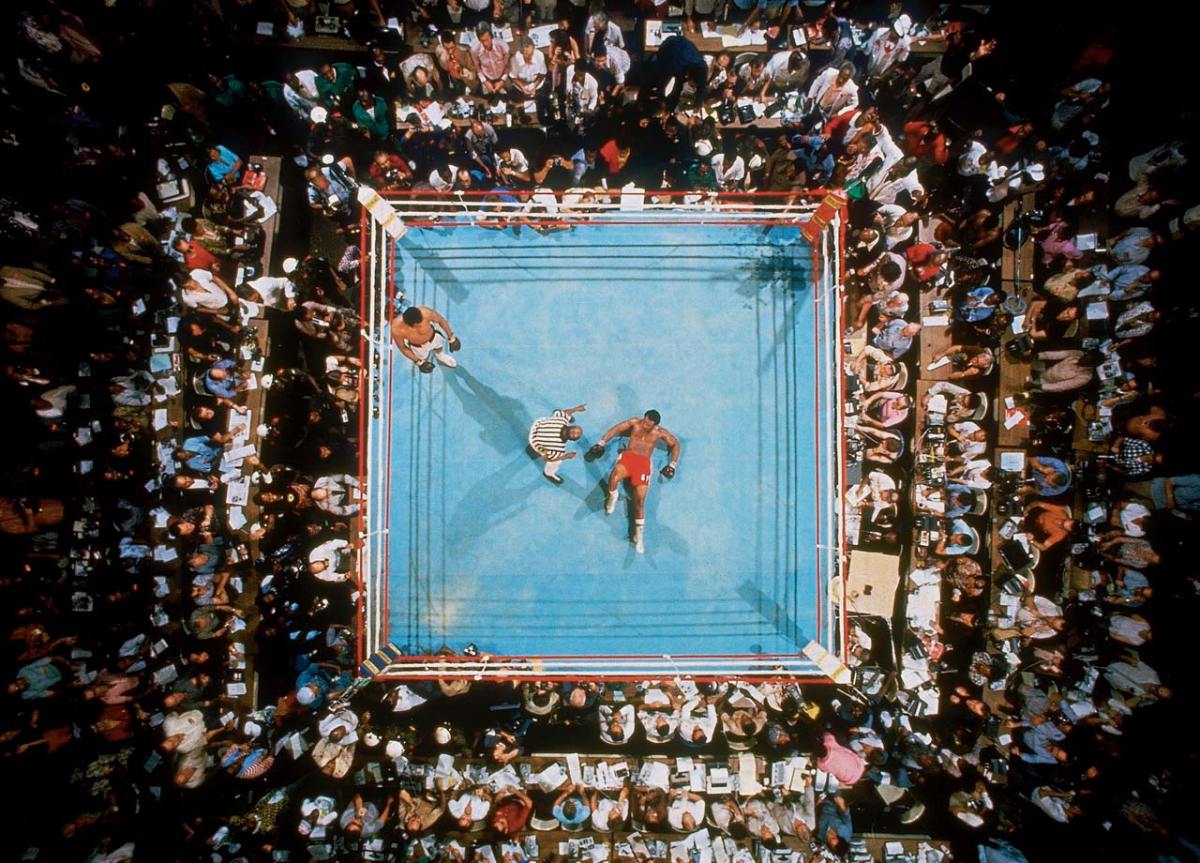
Big George stares at the ceiling as referee Zack Clayton counts him out in the eighth round. The victory made Ali, once again, the heavyweight champion of the world.
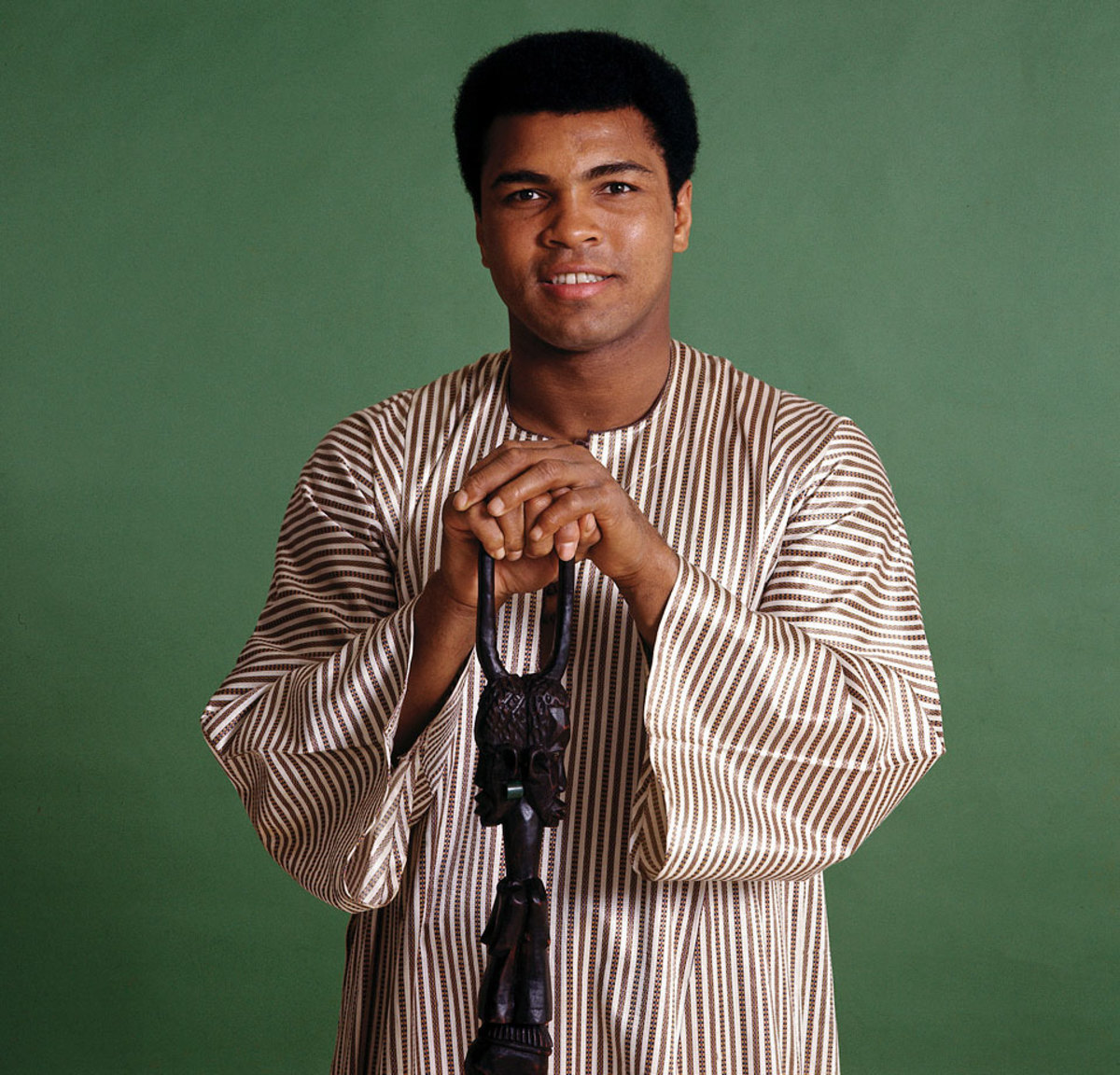
Ali poses for a portrait after being selected as the Sports Illustrated Sportsman of the Year in 1974. Ali wore a dashiki, a men's garment widely worn in West Africa. He also brought the walking stick given to him by Zaire's president.
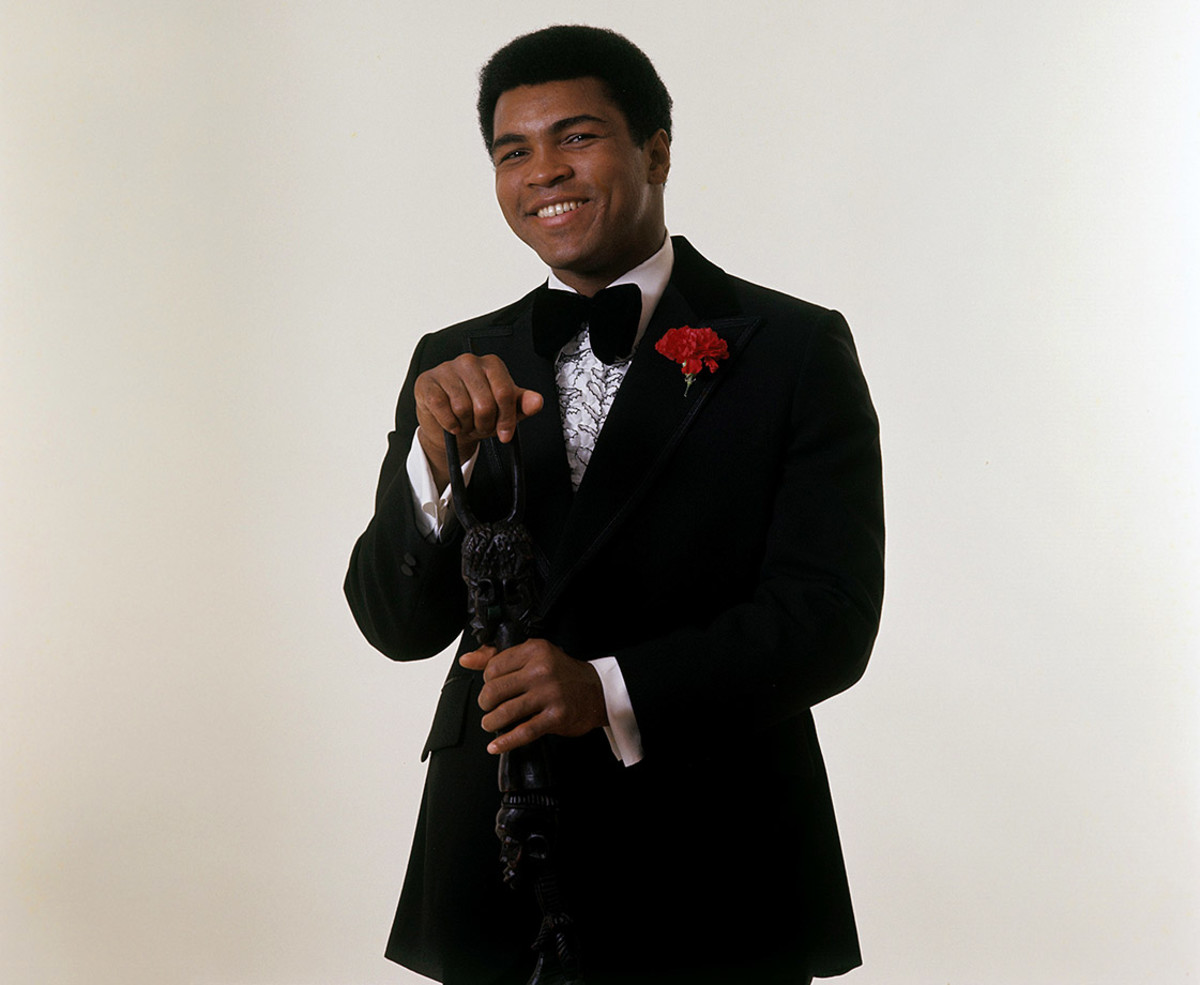
This time Ali wears a tuxedo, but keeps the walking stick, during the November photo shoot for Sports Illustrated's Sportsman of the Year.
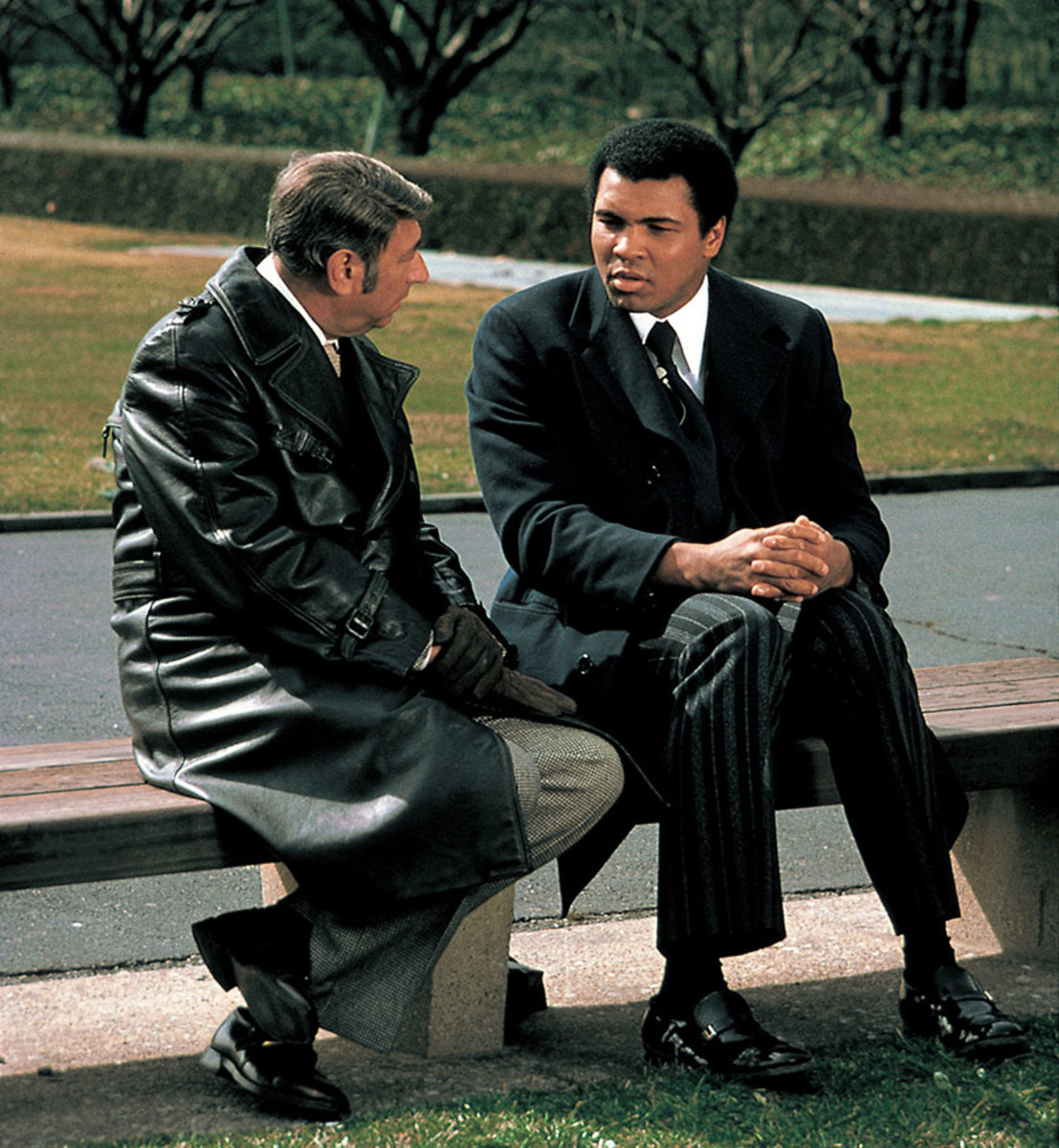
Ali talks with Howard Cosell outside of the United Nations Headquarters for a segment on the Wide World of Sports. Later that day, Ali held a press conference to announce that he would donate part of the proceeds from his fight against Chuck Wepner to help Africans in the Sahel drought.
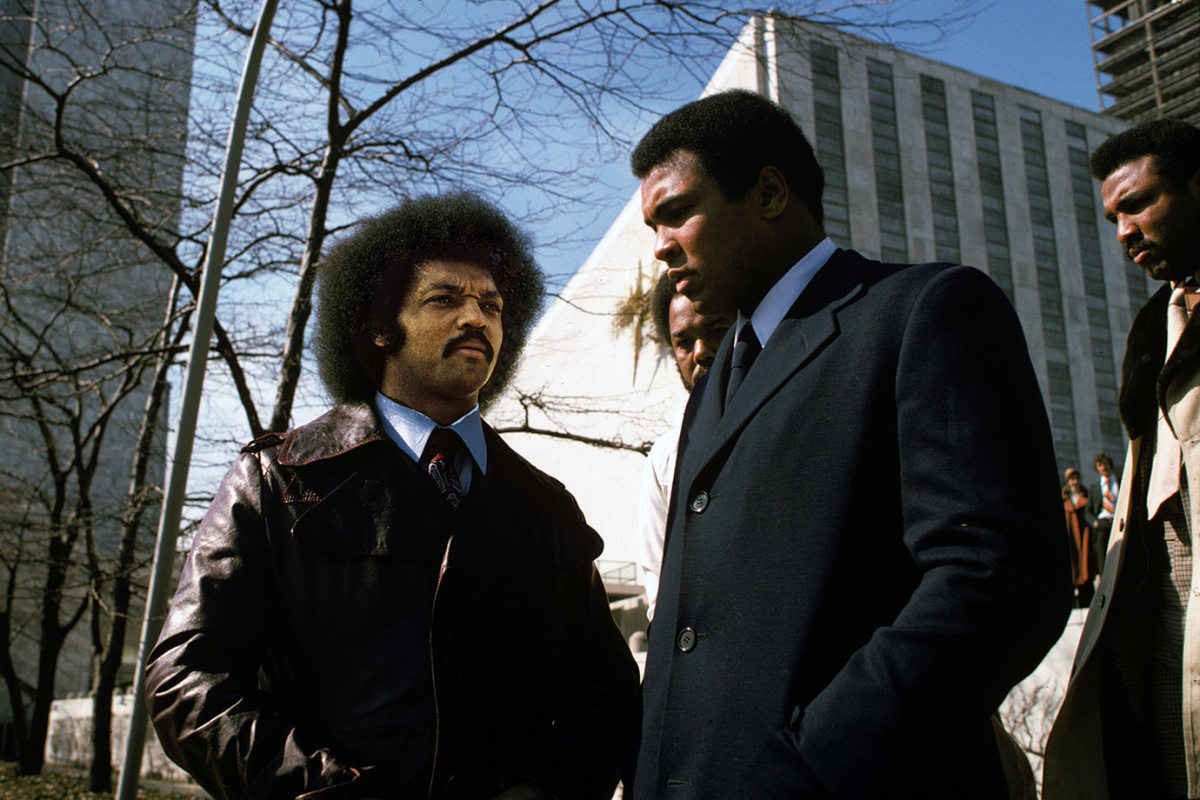
Ali talks with Reverend Jesse Jackson outside of the United Nations Headquarters before a press conference to announce that he would donate part of the proceeds from his fight against Chuck Wepner to help Africans in the Sahel drought.
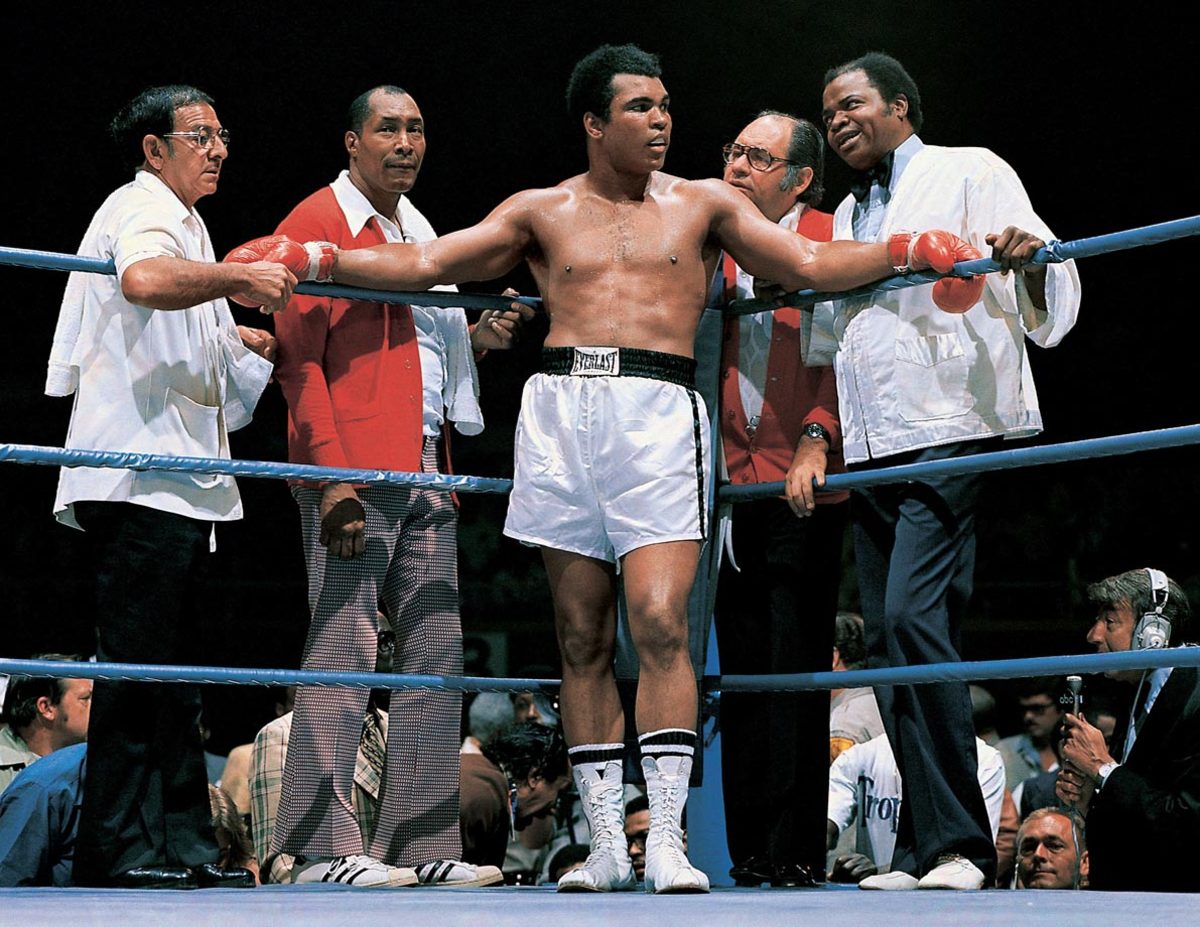
Ali stands with trainer Angelo Dundee, assistant trainer Wali Muhammad, physician Dr. Ferdie Pacheco and assistant trainer Drew Bundini Brown before his bout with Ron Lyle in May 1975. Ali won the fight by technical knockout in the 11th round.
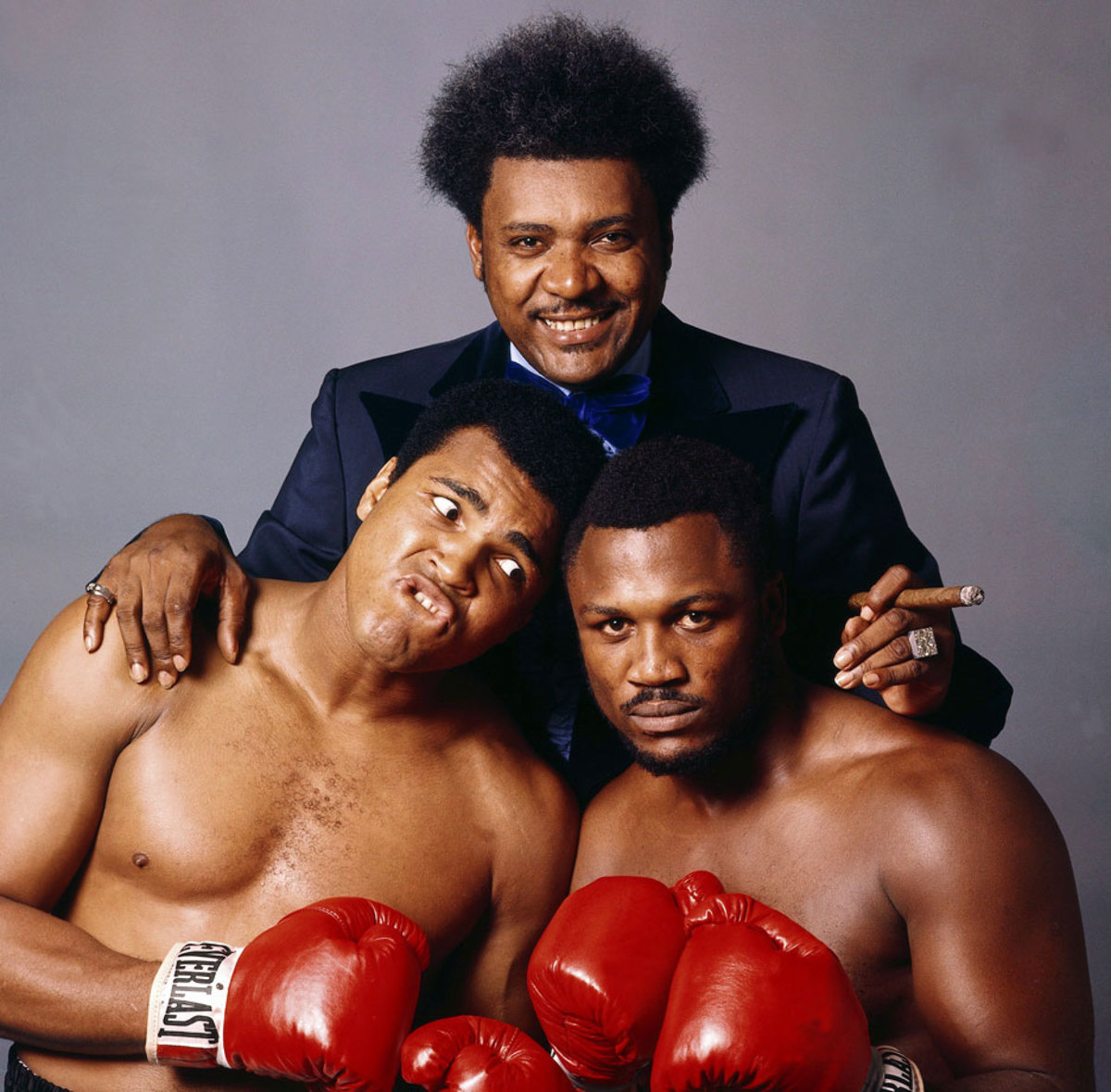
Along with Don King and Joe Frazier, Ali sat for a portrait leading up to the Thrilla in Manila. Ali verbally abused Frazier during the buildup to the fight, telling the media that "it will be a killa and a thrilla and a chilla when I get the gorilla in Manila."
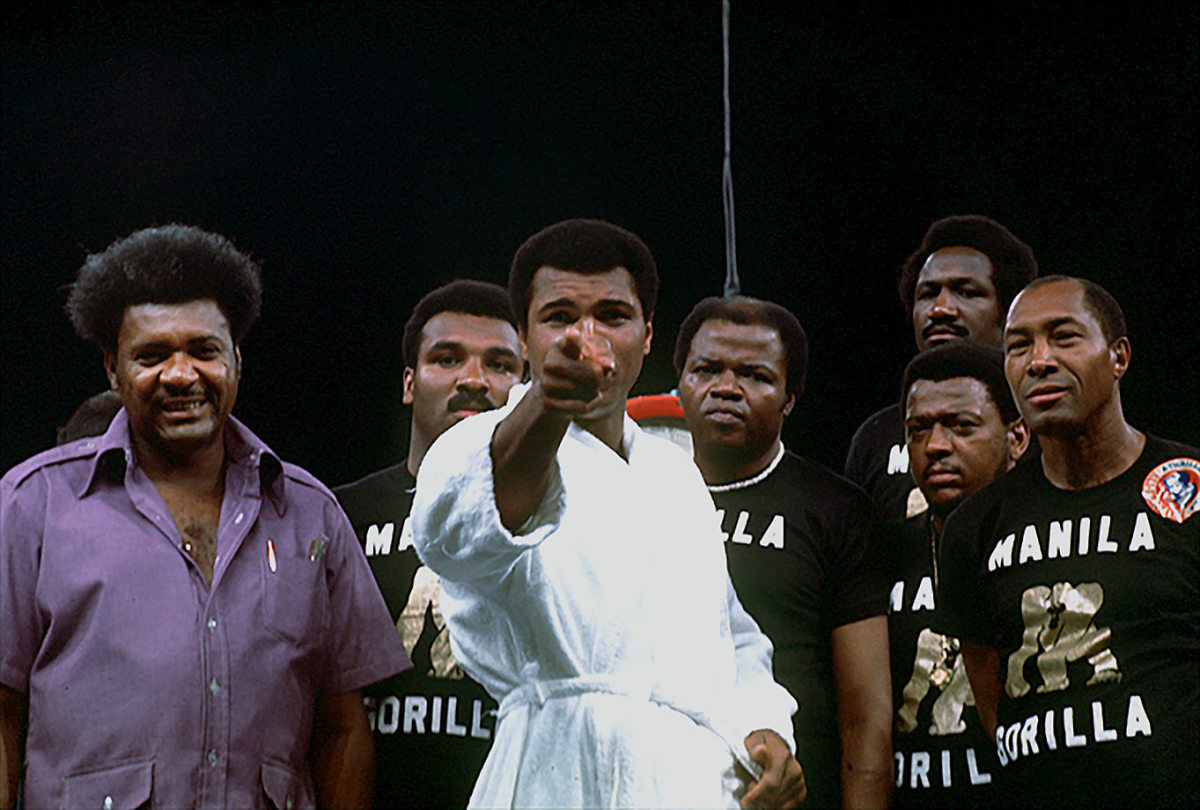
Ali points at the camera with Don King and his training staff behind him before the weigh-in for the Thrilla in Manila in October 1975. Philippine president Ferdinand Marcos offered to sponsor the bout and hold it in Metro Manila to divert attention from the turmoil in the country that had forced the imposition of martial law in 1972.
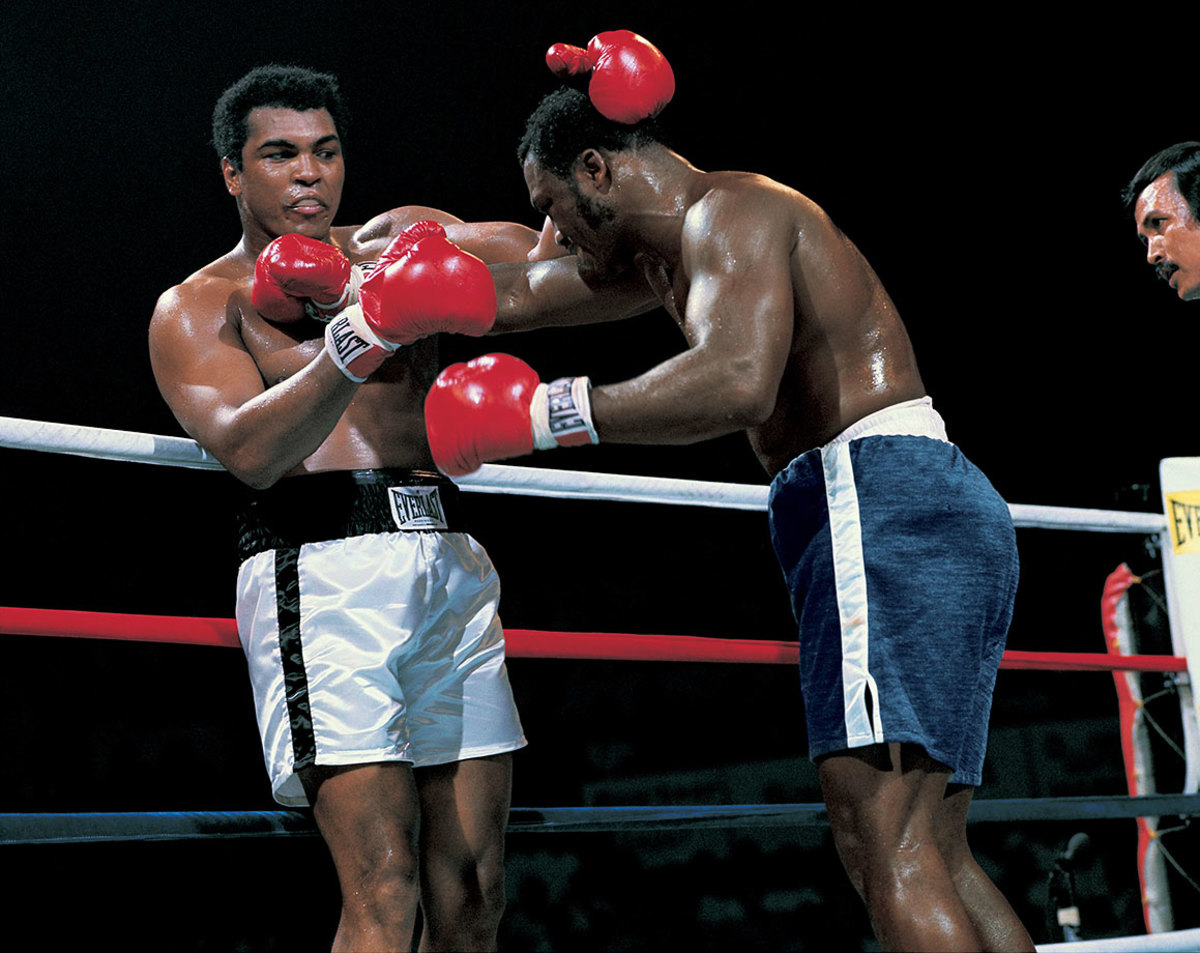
Wrapping up Joe Frazier proved more difficult than Ali expected, having thought Frazier would represent an easy payday and be unable to live up to his billing. The fight turned out to be a brutal affair.
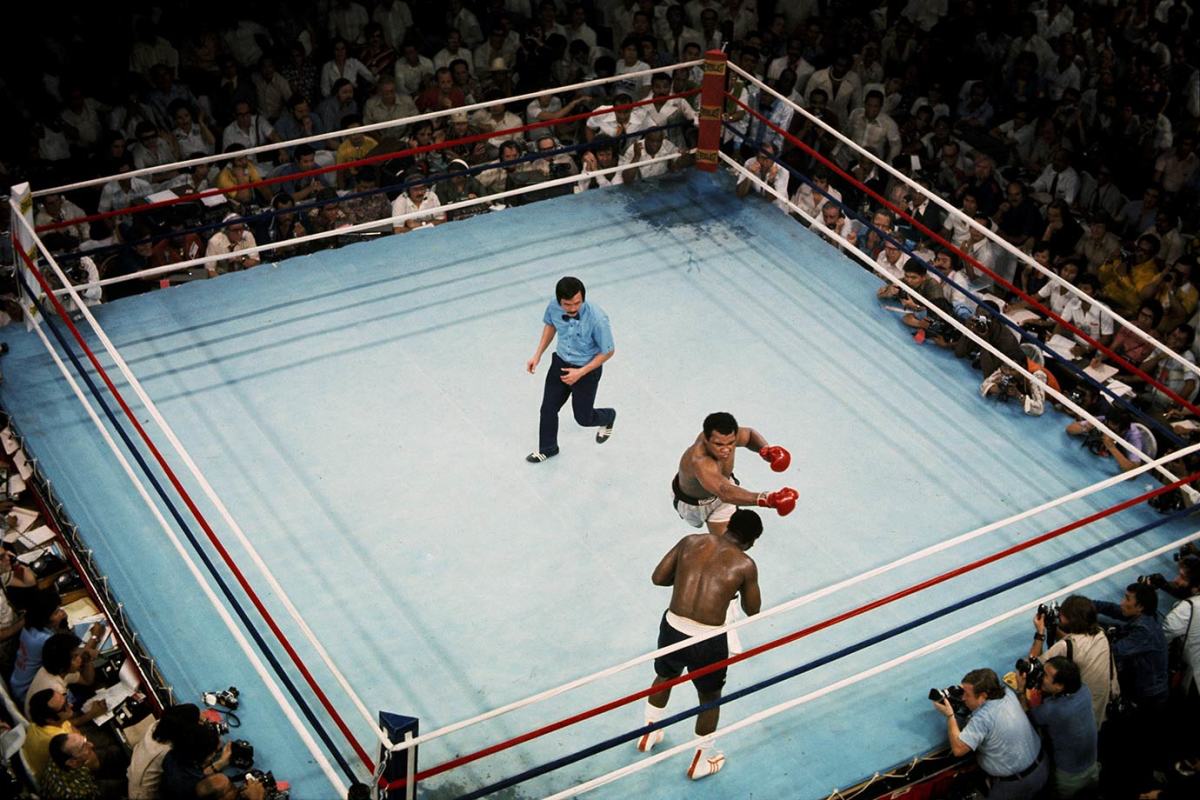
Frazier faces an Ali right hook in their fight in Quezon City, Philippines. The two fighters traded vicious blows during their 14 rounds. "Man, I hit him with punches that'd bring down the walls of a city," Frazier said. Ali withstood the blows to win by TKO in the 15th round.
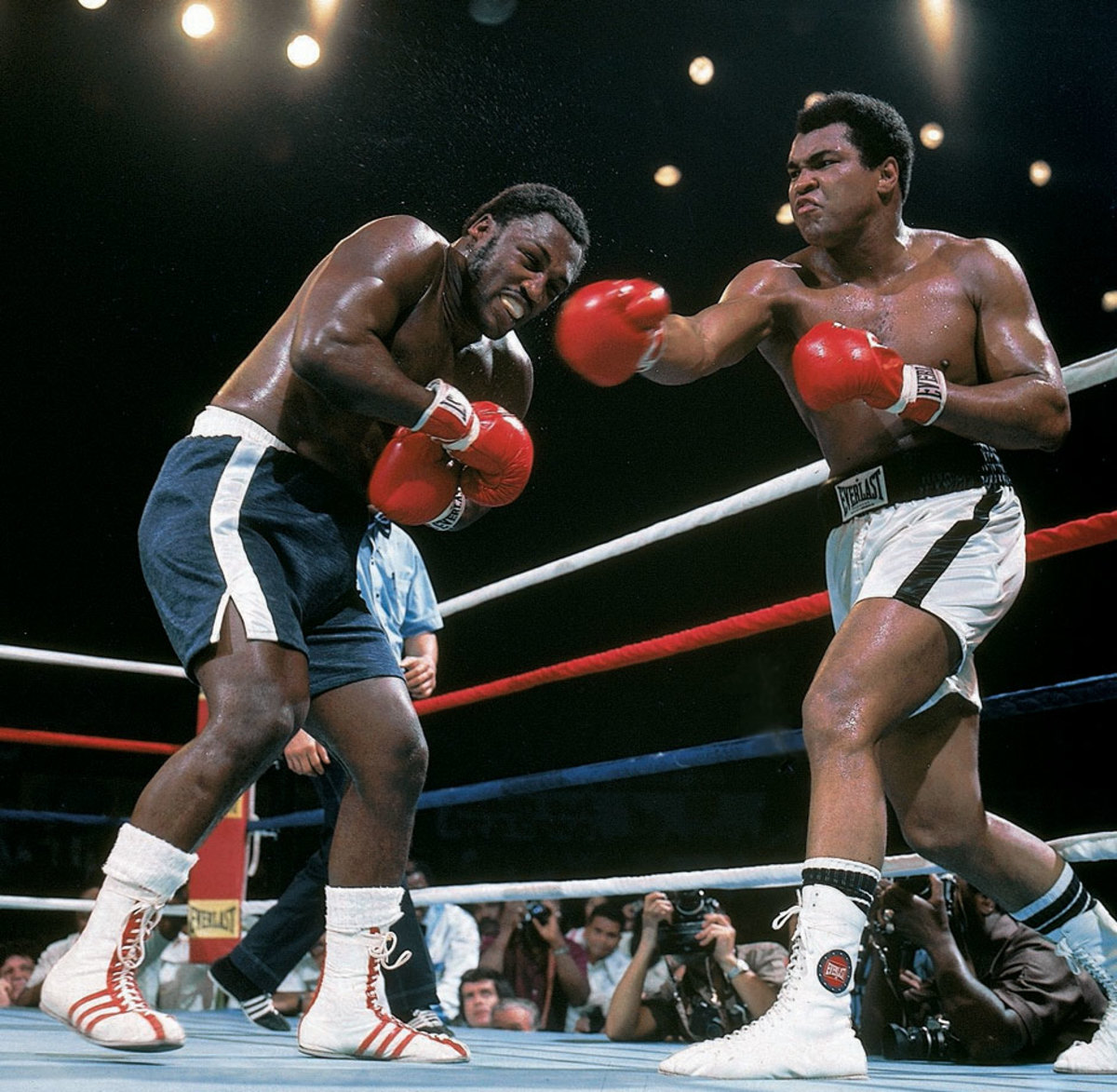
The third fight between Ali and Frazier, Ali won the bruising battle between the two powerful punching heavyweights when Frazier's trainer, Eddie Futch, stopped the fight before the 15th round.
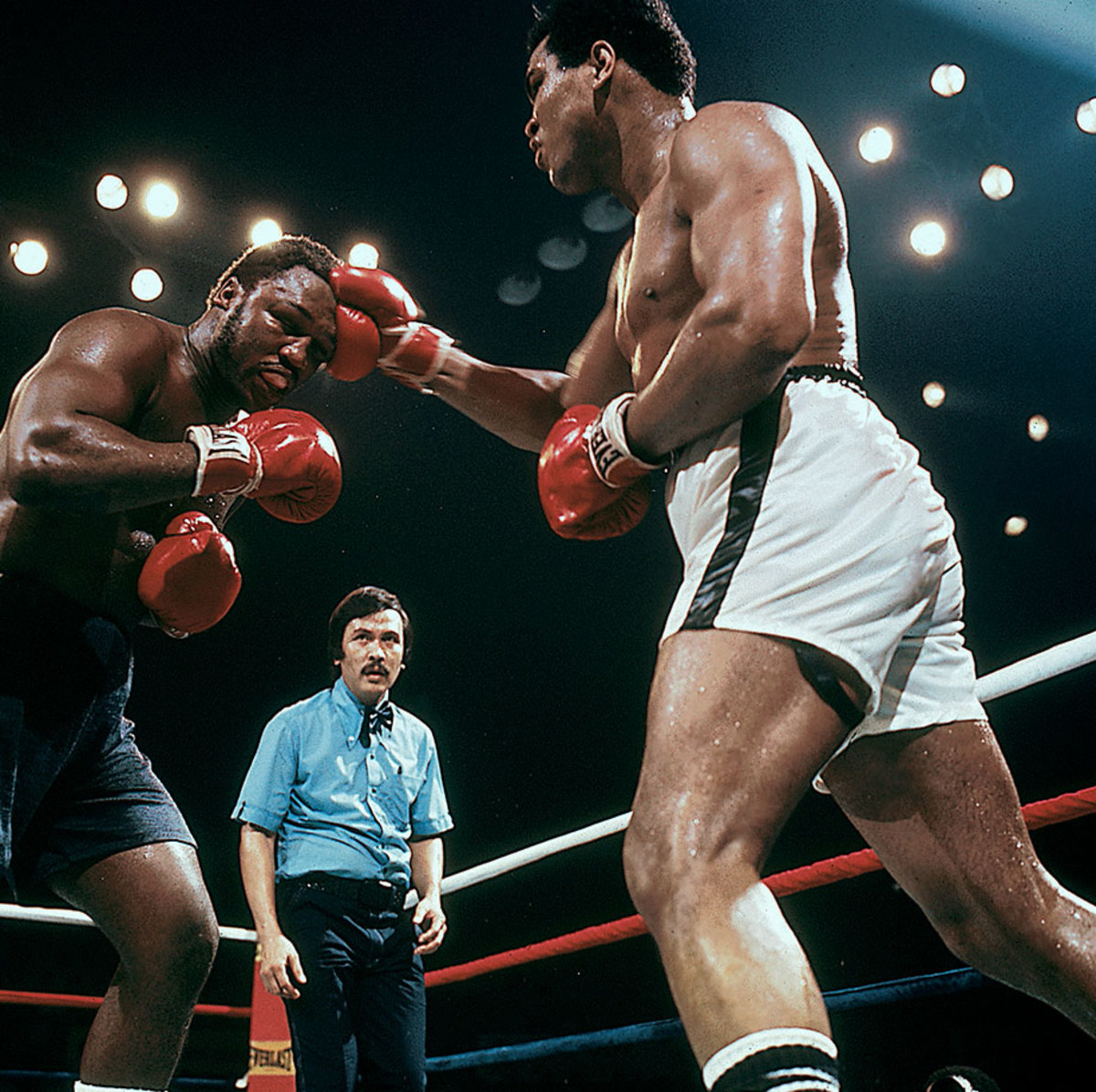
A back and forth exchange, Ali controlled the early rounds of the Thrilla in Manila before Frazier fought back with powerful hooks. Ali finished strong, regaining momentum in the later rounds.
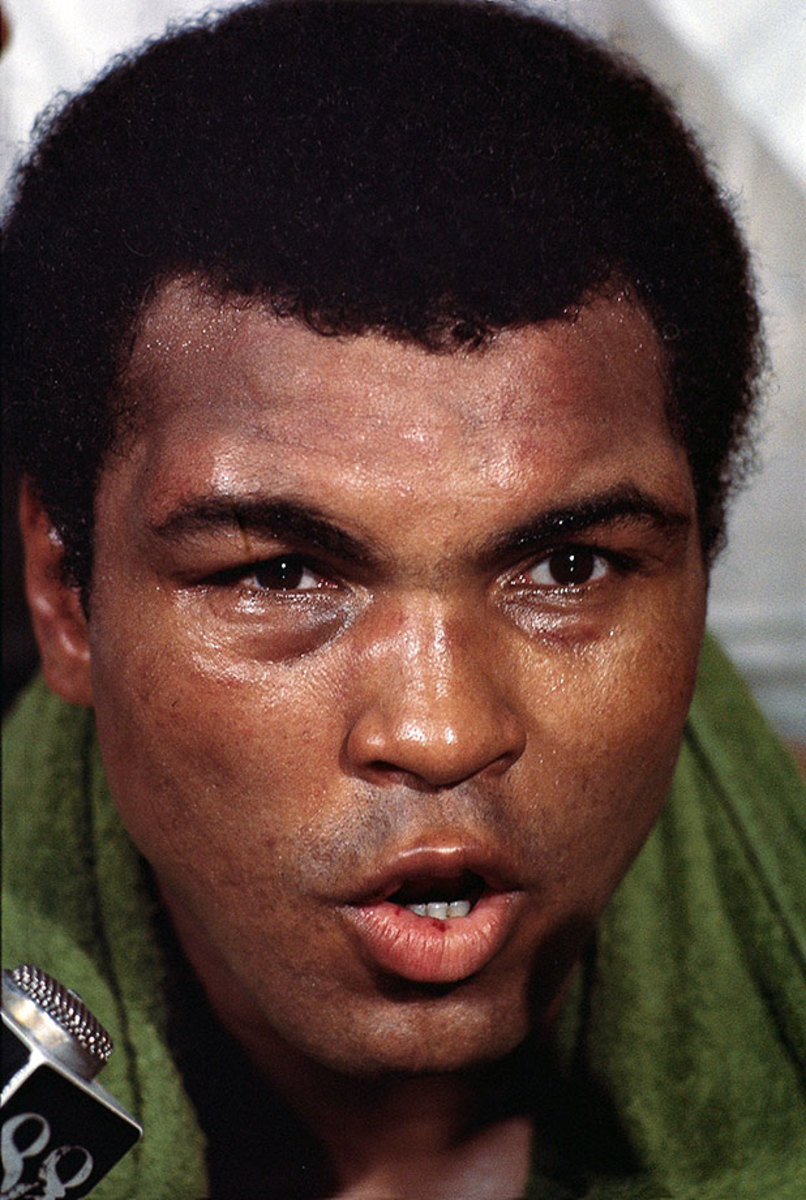
Ali speaks to the press after winning the Thrilla in Manila bout with Frazier.
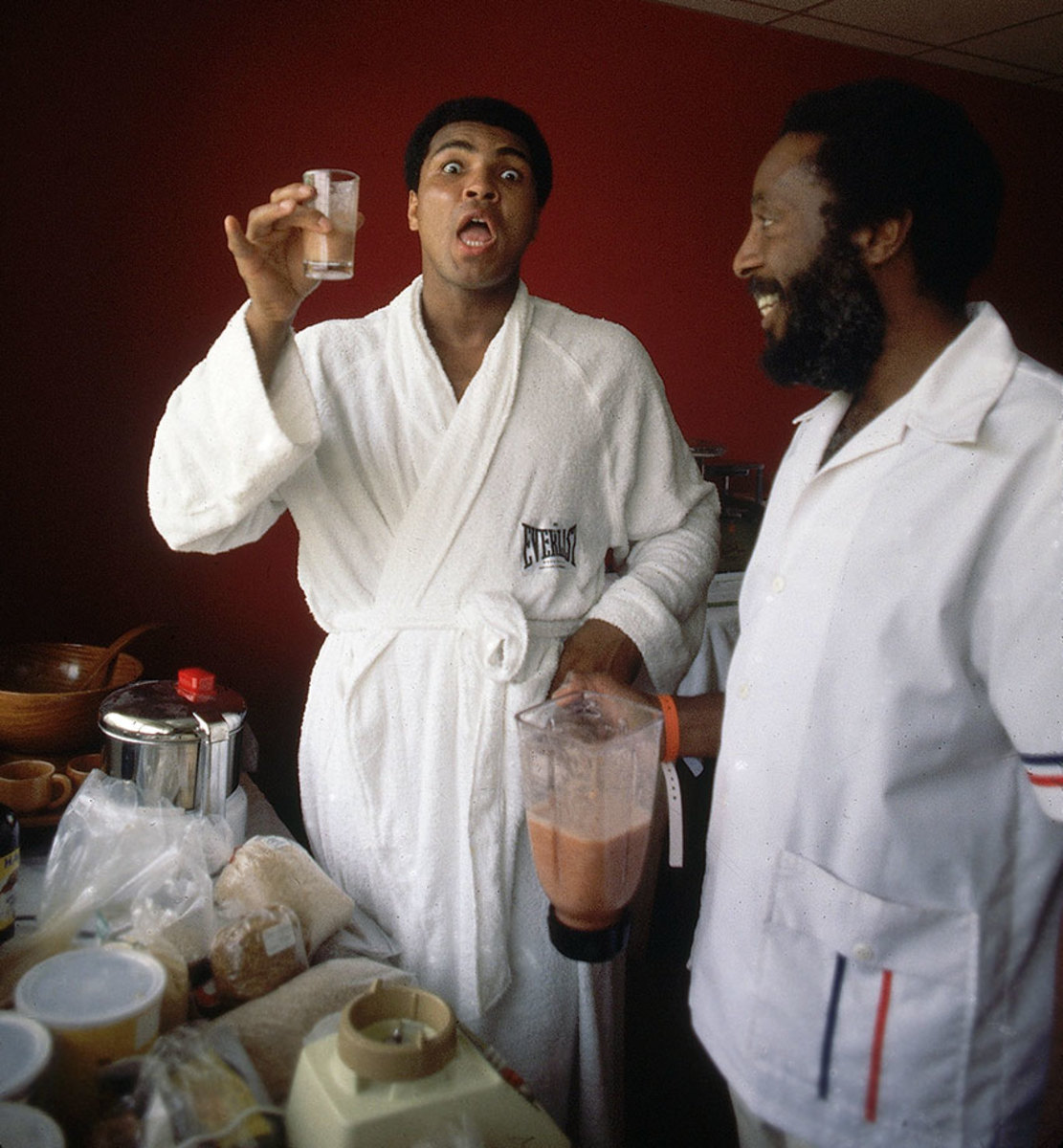
Ali holds a drinking concoction given to him by Dick Gregory, an advocate of a raw fruit and vegetable diet, in 1976.
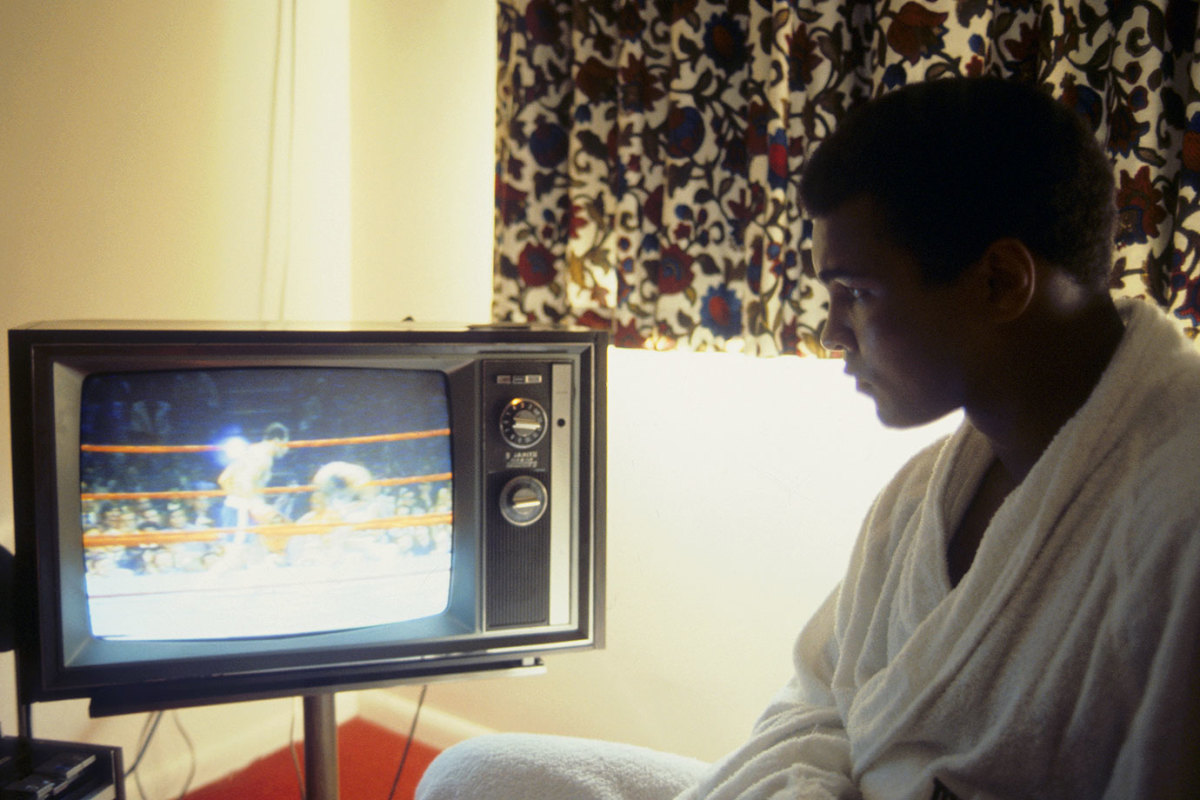
Before his 1976 fight against Ken Norton at Yankee Stadium, Ali watches a fight on television from his hotel room. A police strike at the time of the fight created a dangerous environment outside the stadium that all but eliminated walk-up sales.
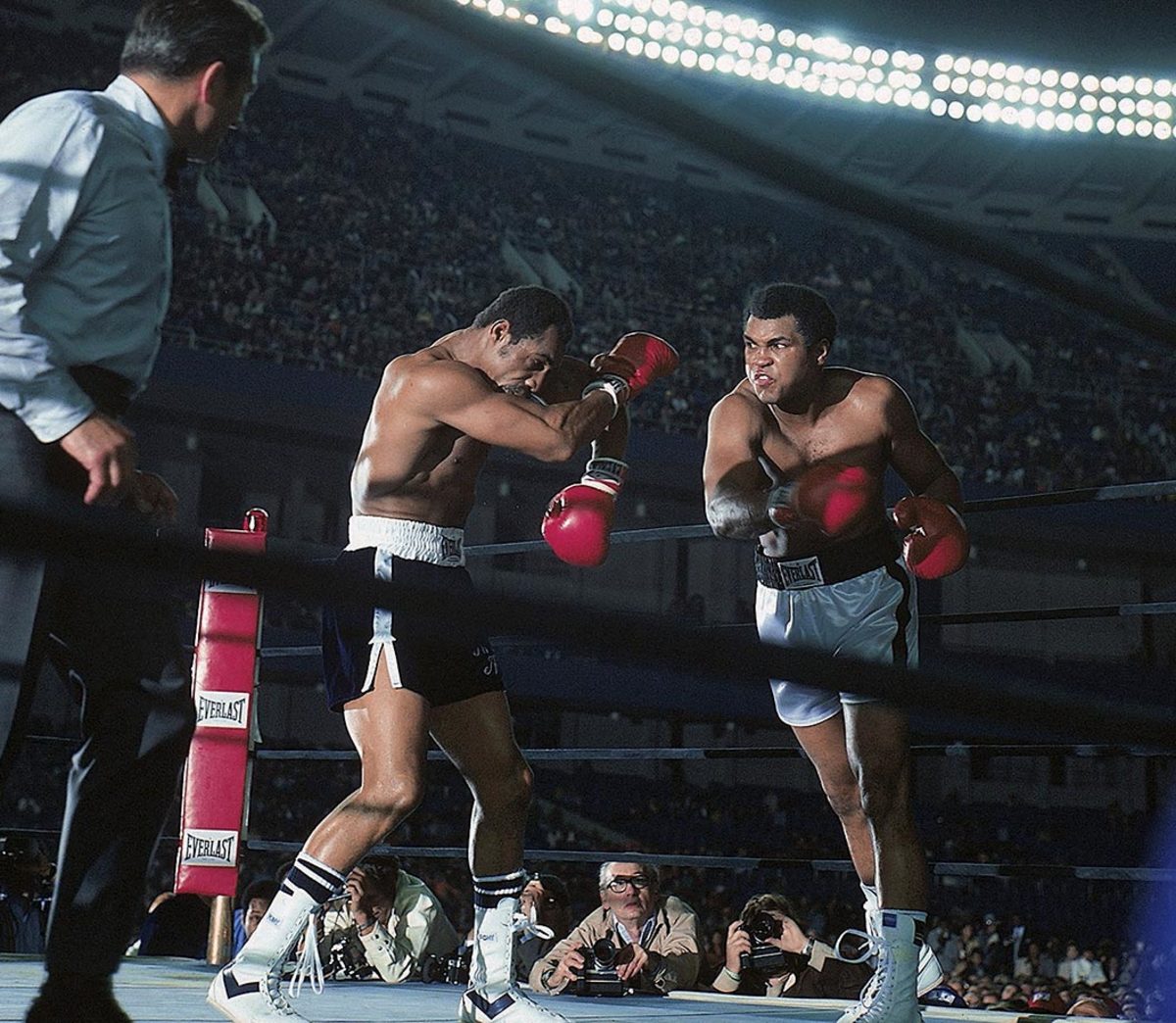
Norton takes a right hook during the heavyweight title fight against Ali. The bout, which Ali won by a unanimous, but controversial, decision, was the last boxing match at Yankee Stadium until 2010.
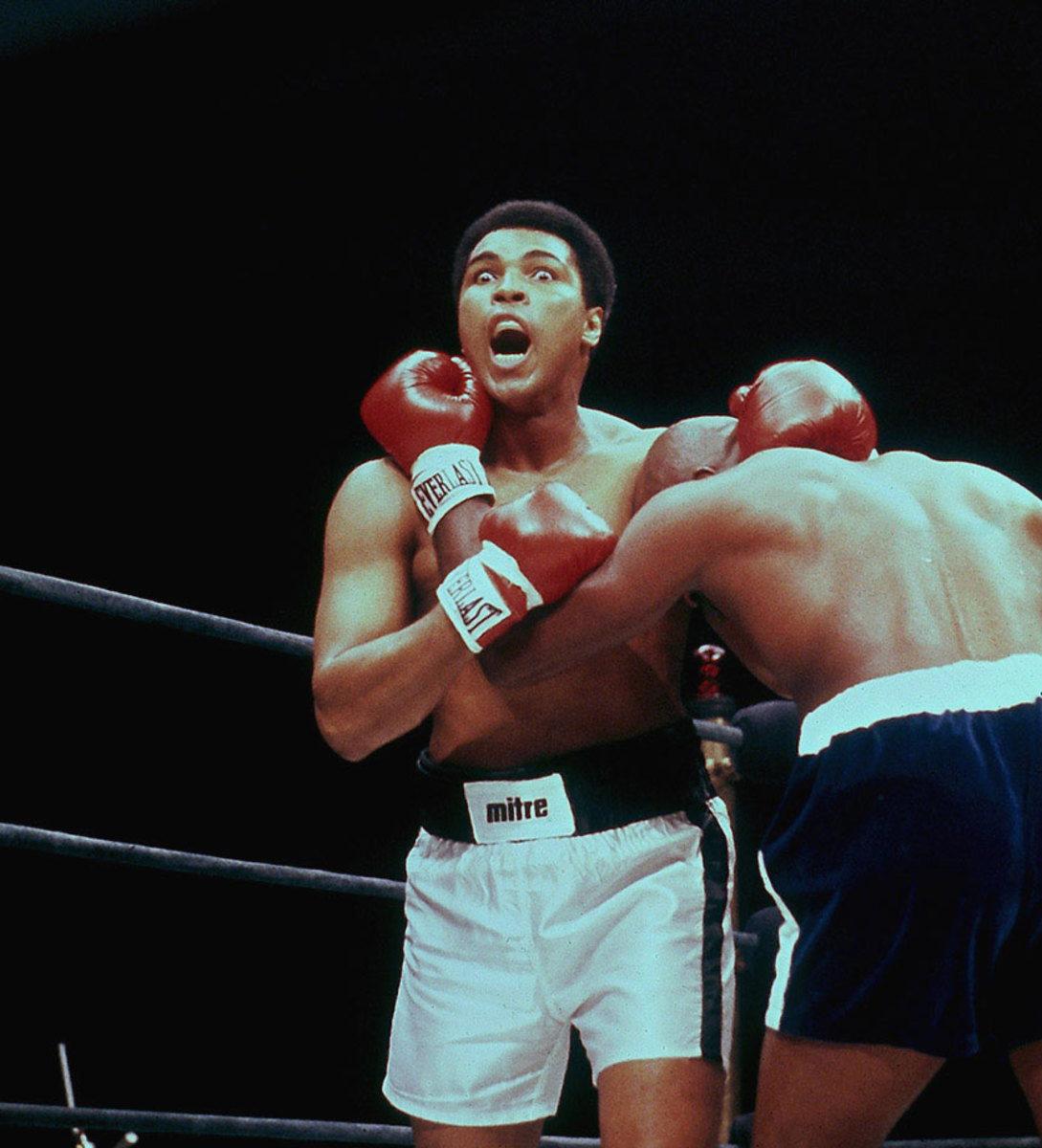
Ali makes a face during his fight with Earnie Shavers in 1977 at Madison Square Garden. Hurt badly by Shavers in the second round, Ali rebounded and outboxed Shavers throughout to build a lead on points before Shavers came on again in the later rounds. Seemingly exhausted going into the 15th and final round, Ali remained victorious by producing a closing flurry that left Shavers wobbling at the bell and the Garden crowd once again in delirium over his Ali magic.
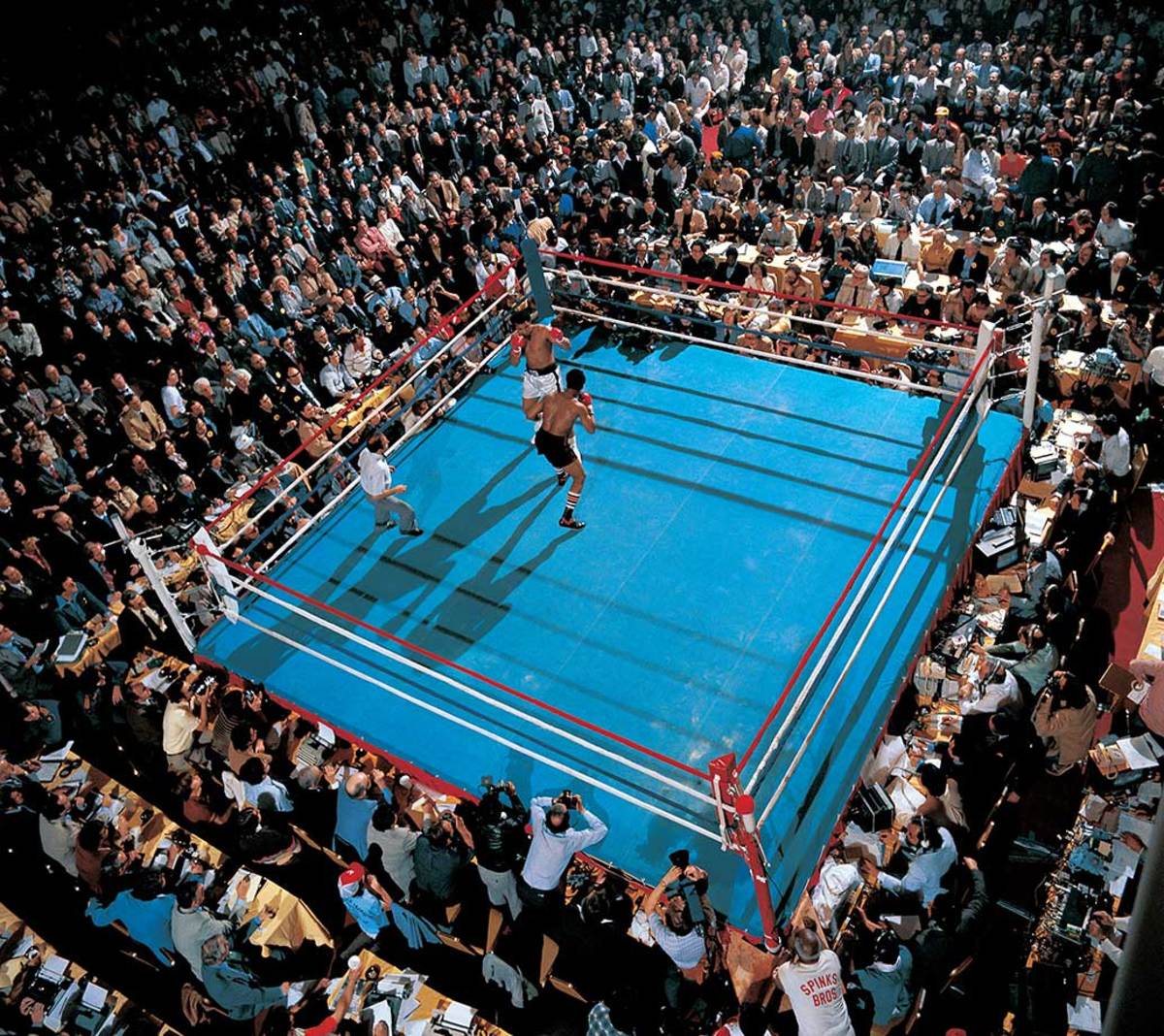
Ali squares off with Leon Spinks at the Las Vegas Hilton Hotel in February 1978. Spinks won the fight in a split decision, ending Ali's 3.5-year reign as the heavyweight champion. It was the only time in Ali's career that he lost his championship title in the ring.
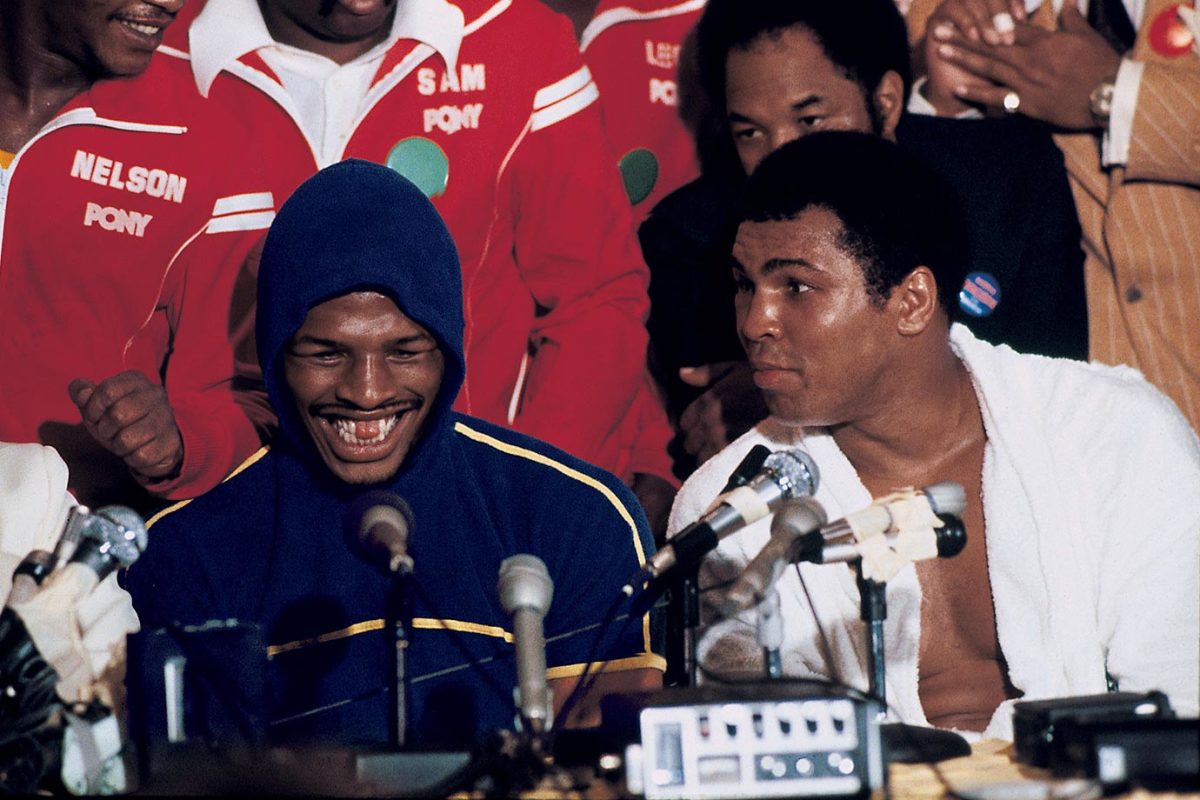
Leon Spinks took center stage over Ali at the press conference after their fight. The victorious Spinks and his gap-toothed grin were featured on the Feb. 19, 1978 cover of Sports Illustrated.
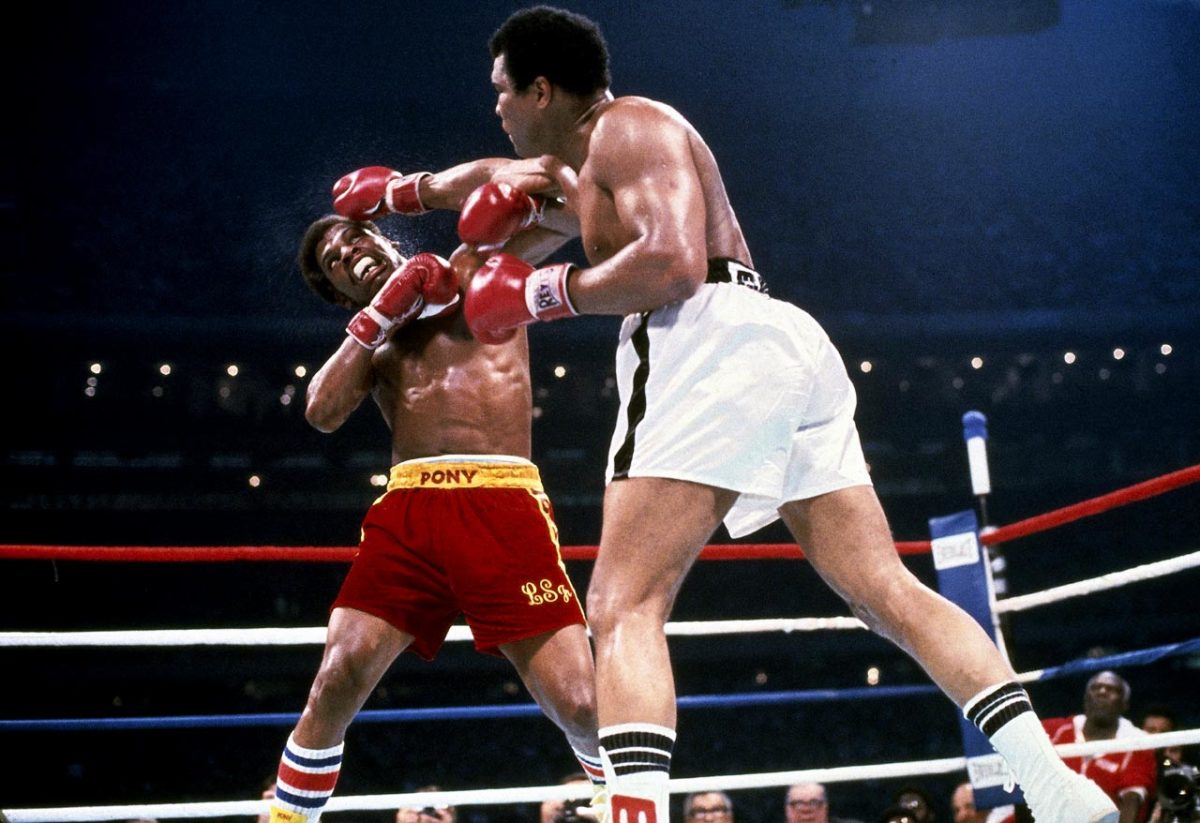
Ali lands a straight right hand to the head of Spinks in the rematch of their title bout in 1978. Ali won on a 15 round decision.
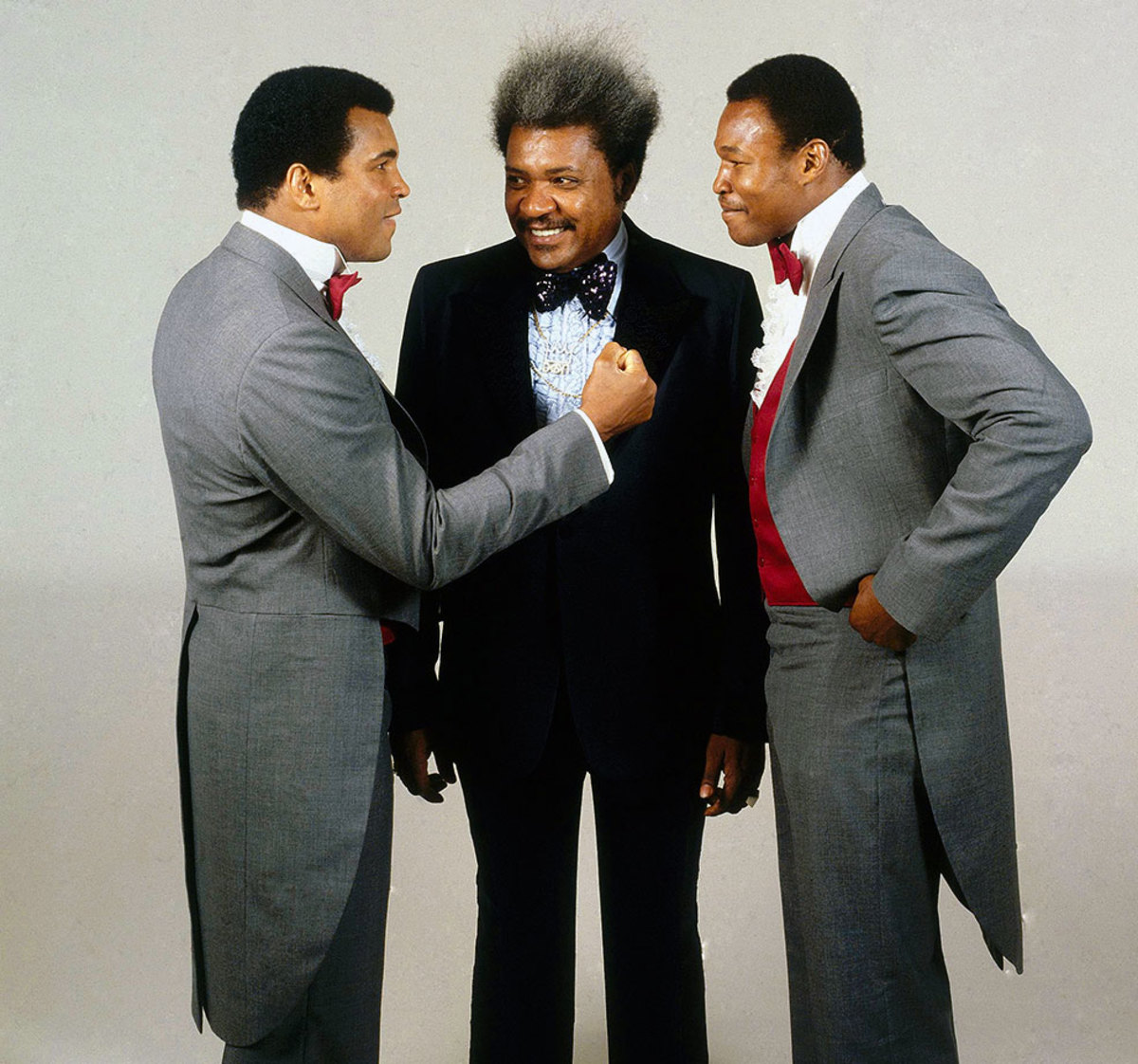
Don King pulled the strings again when Ali faced Larry Holmes before their November 1980 fight. King became a key figure in Ali's career, promoting his biggest fights, the Thrilla in Manila and the Rumble in the Jungle.
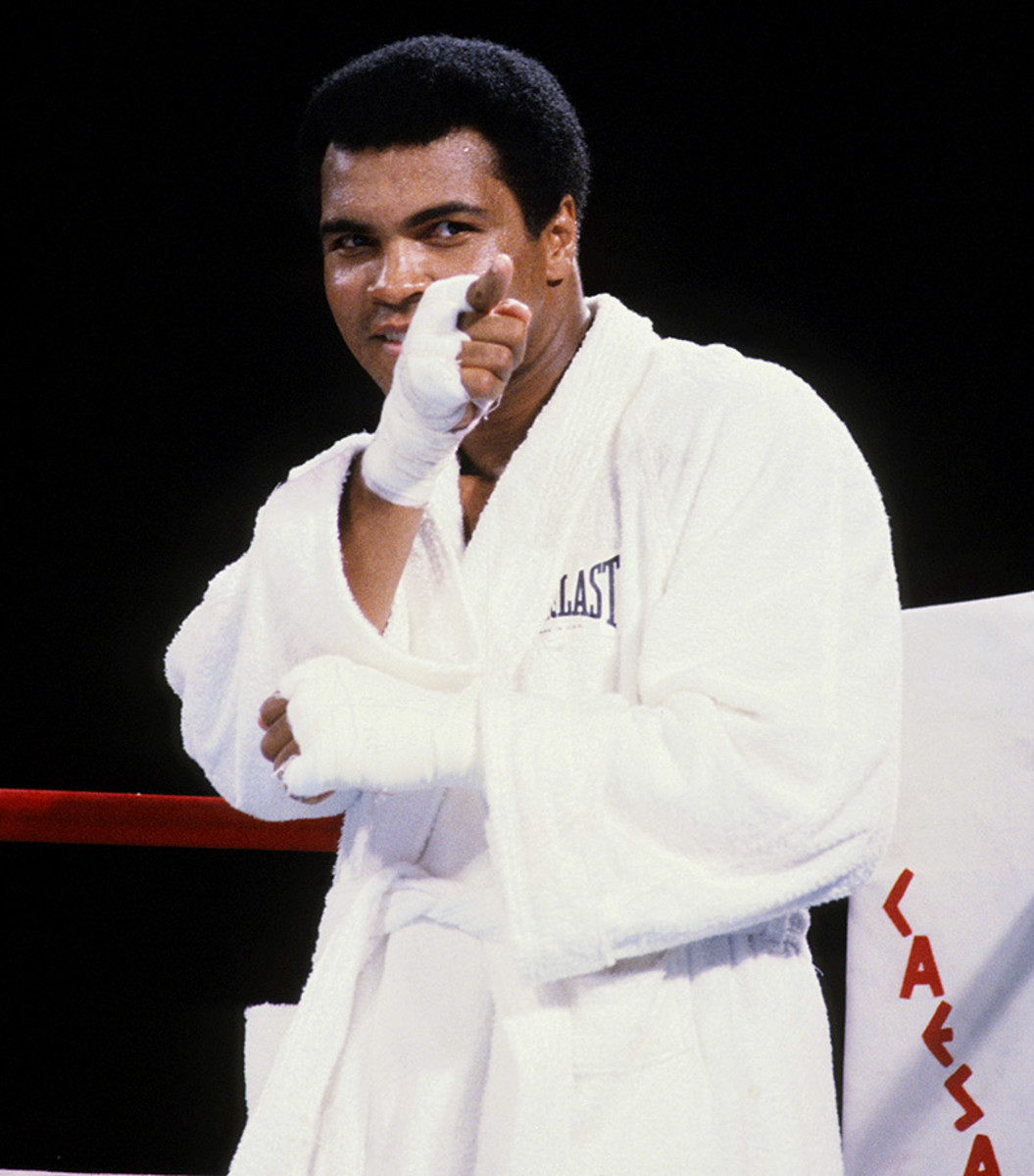
Ali points at Larry Holmes before their bout at Caesars Palace in 1980.
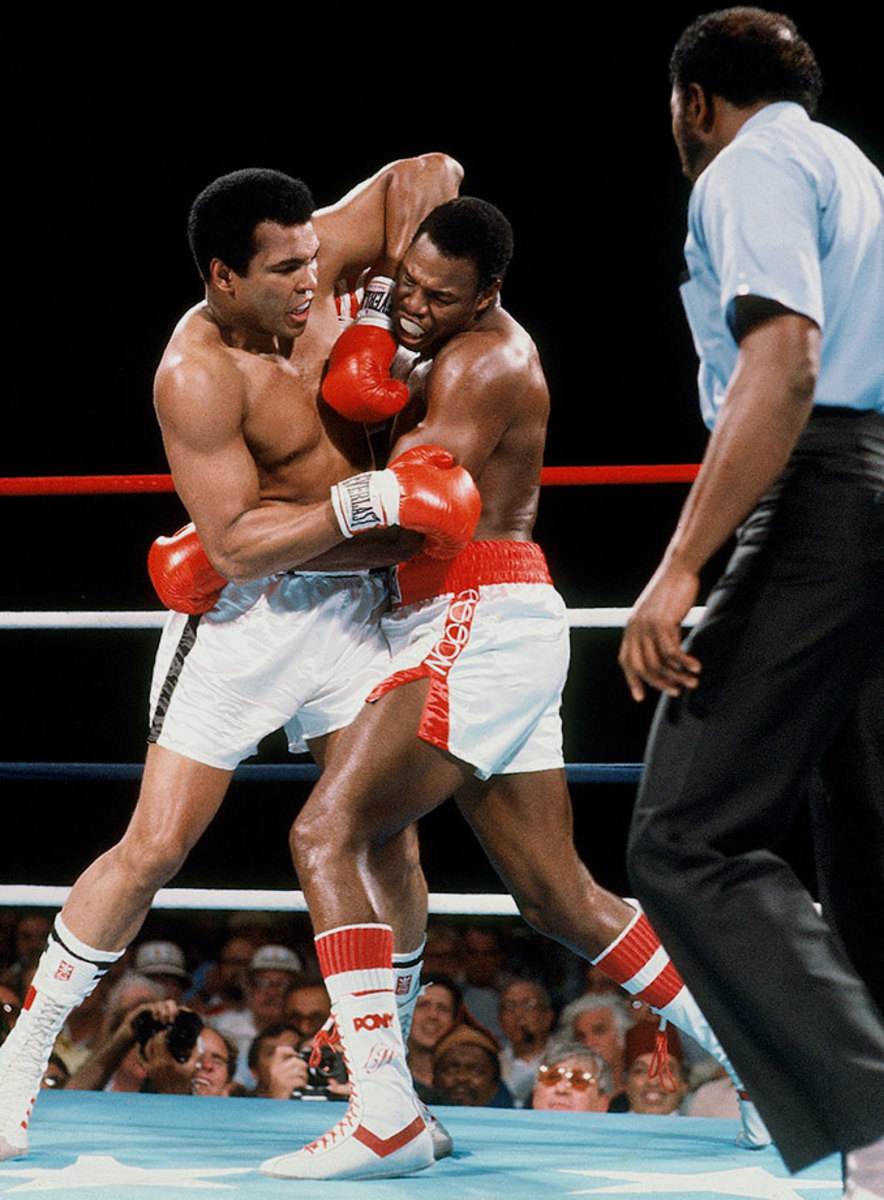
Ali grapples with Holmes during their bout in 1980. Trainer Angelo Dundee stopped the fight in the 11th round, marking the fight as Ali's only career loss by knockout.
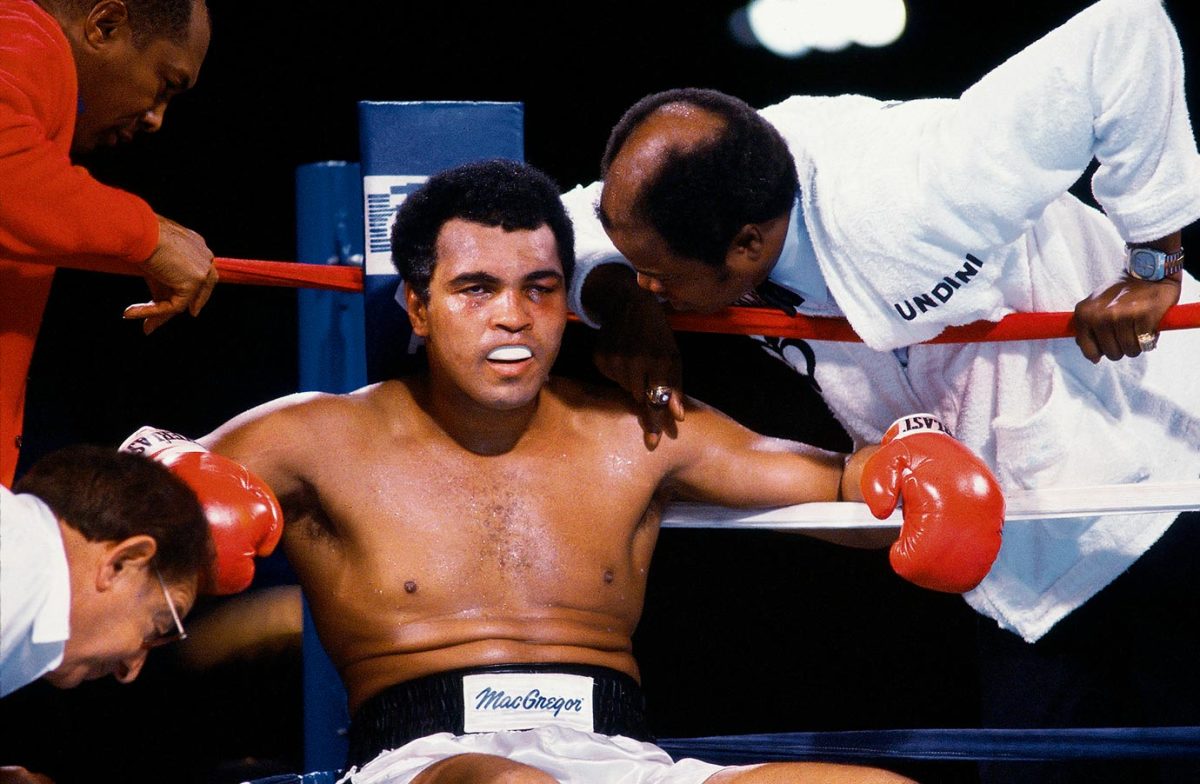
Drew Bundini Brown leans in to speak to Ali, who returned to fight Holmes after a brief retirement. By this time, Ali had already begun developing a vocal stutter and trembling hands and taken thyroid medication to lose weight that left him tired and short of breath.
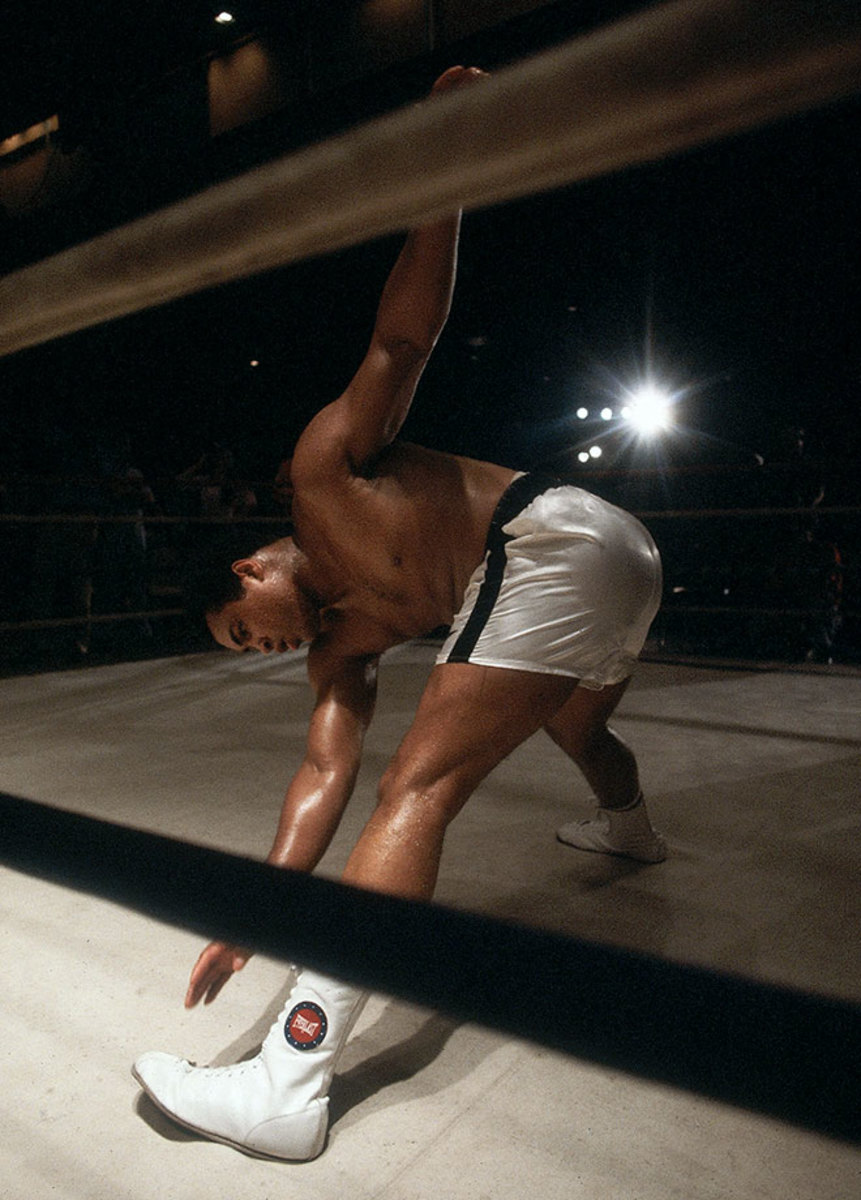
Ignoring pleas for his retirement, Ali stretches before a fight against Trevor Berbick in Nassau, Bahamas. Ali lost to Berbick in a unanimous decision and retired after the bout, the 61st of his career.
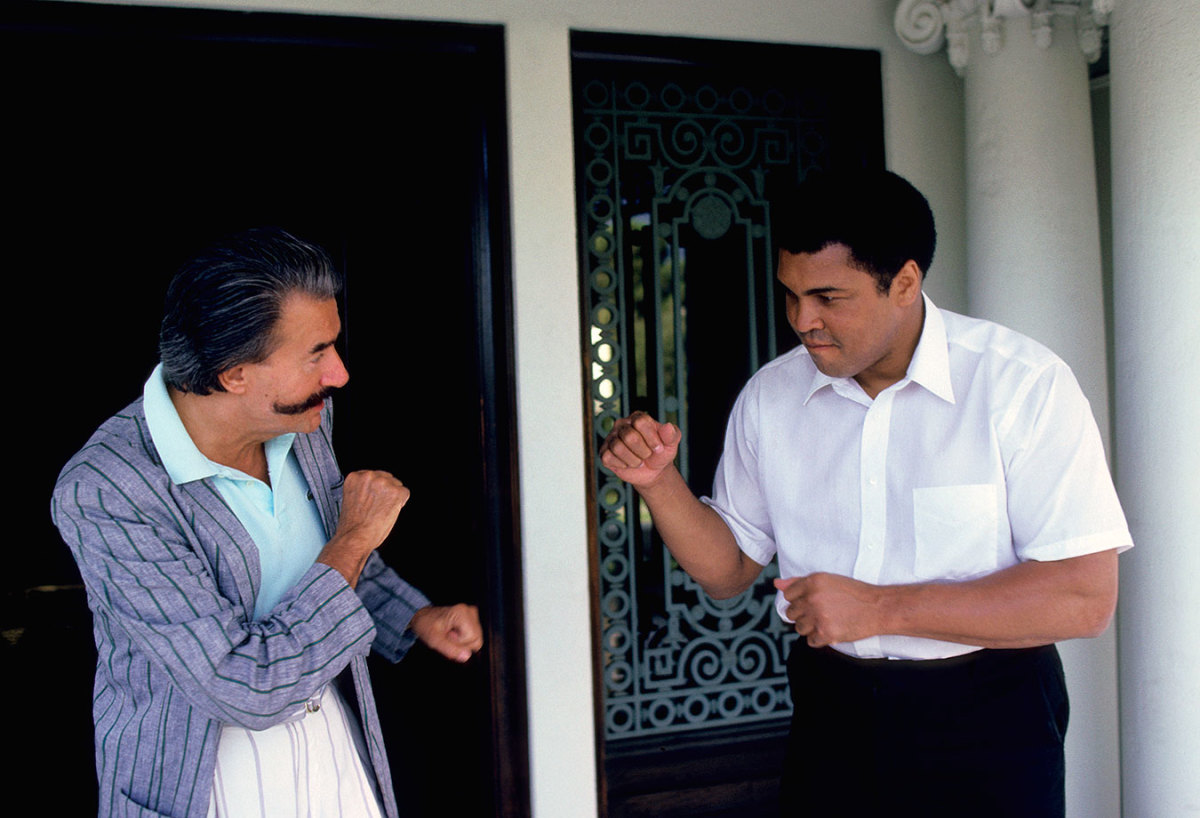
Ali pretends to spar with artist LeRoy Neiman at his home in Los Angeles. Neiman met Ali in 1962 and made many paintings and sketches from throughout Ali's life.
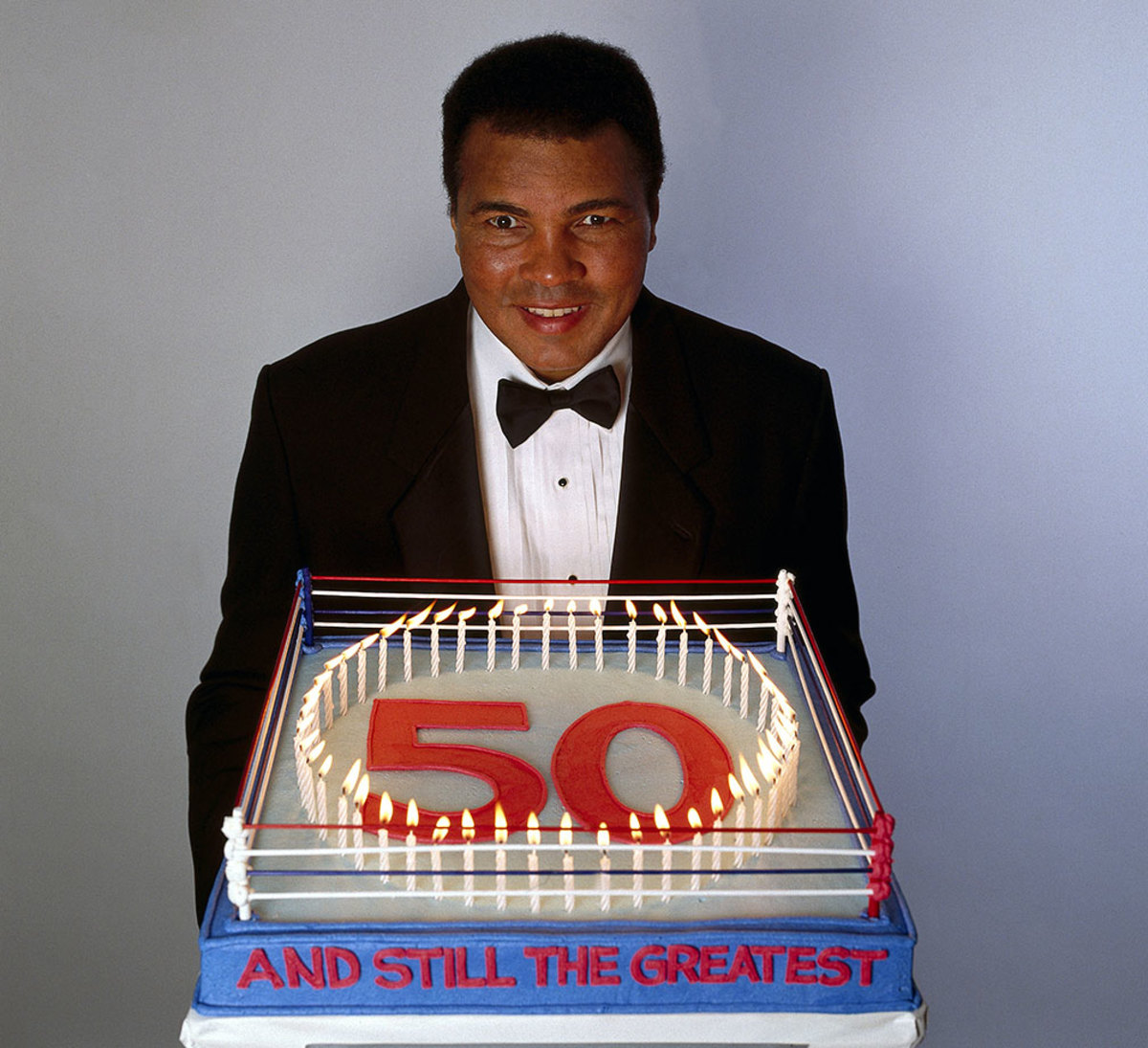
Cake in hand, Ali poses for a 50th birthday portrait in 1991. Although diagnosed with Parkinson's syndrome seven years earlier, Ali was still active, traveling to Iraq during the Gulf War to meet with Saddam Hussein in an attempt to negotiate the release of American hostages.
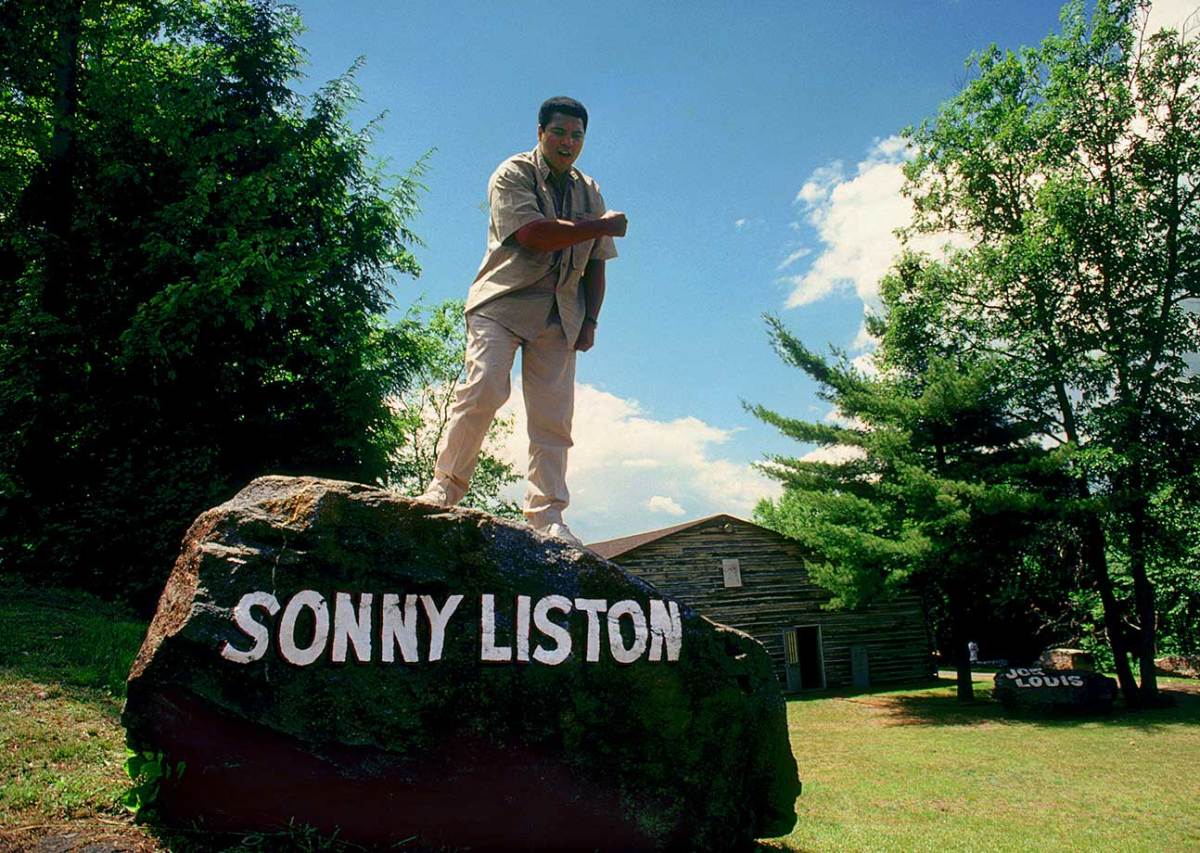
The same year, Ali stands atop of the Sonny Liston rock at his old training camp cabin. Ali and his father painted the names of famous boxers he admired on 18 boulders at the camp.
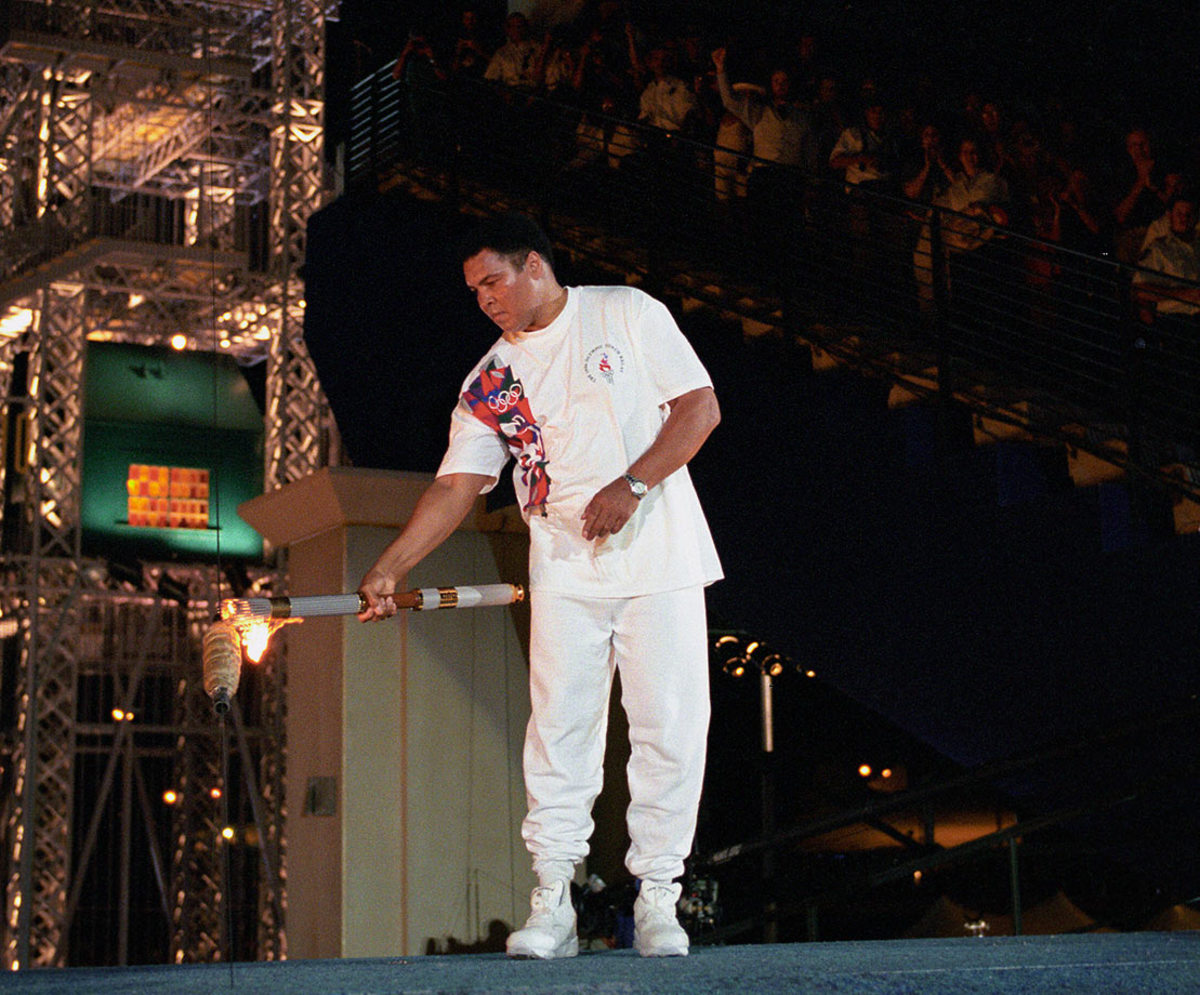
Ali carries the Olympic torch inside Centennial Olympic Stadium at the 1996 Atlanta Olympics. Despite trembling hands, Ali had the honor to light the Olympic flame in the stadium.
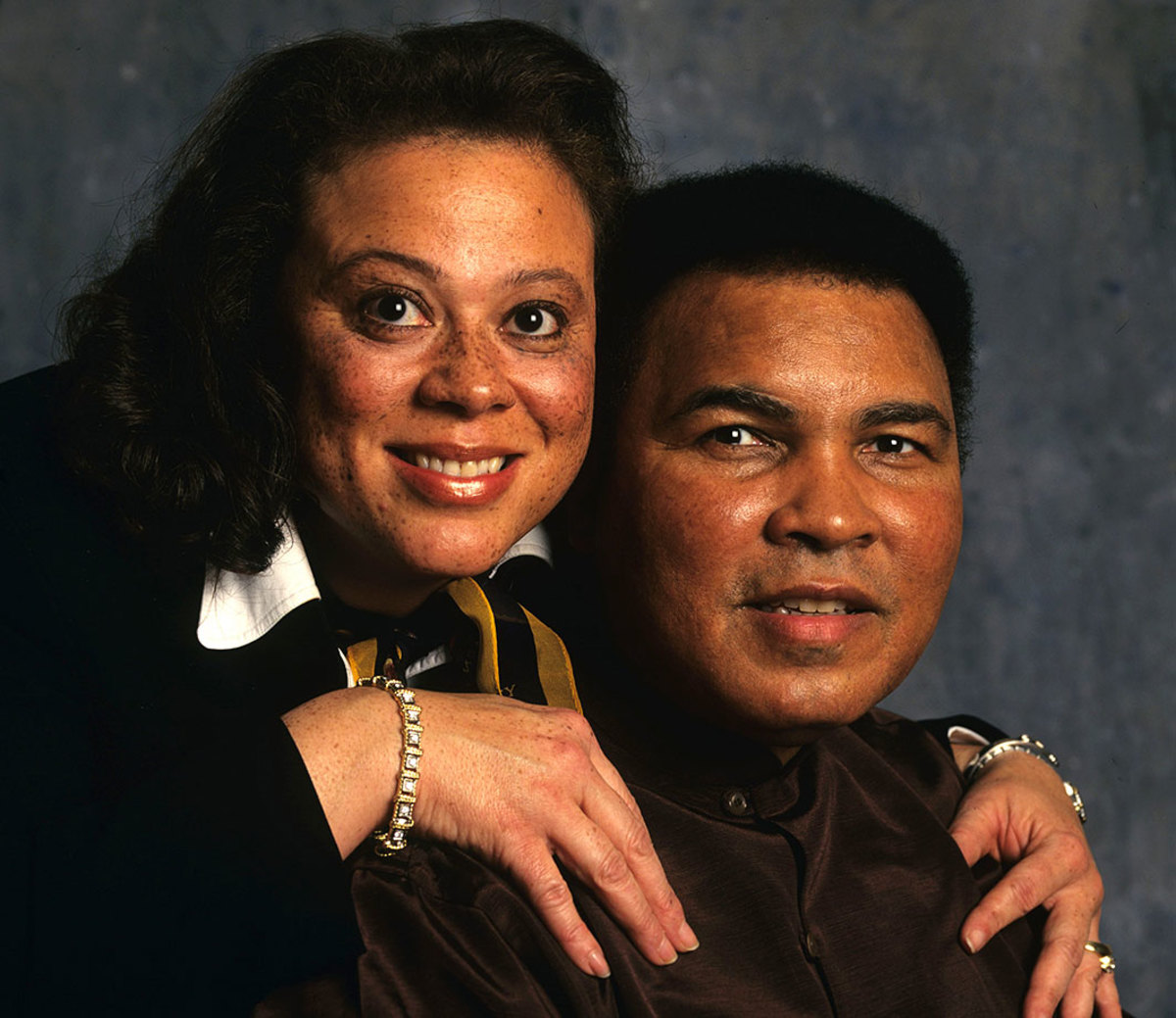
Husband and wife pose for a portrait during a photo shoot in 1997. Muhammad and Lonnie married in 1986 and have an adopted son together, Asaad Amin Ali.
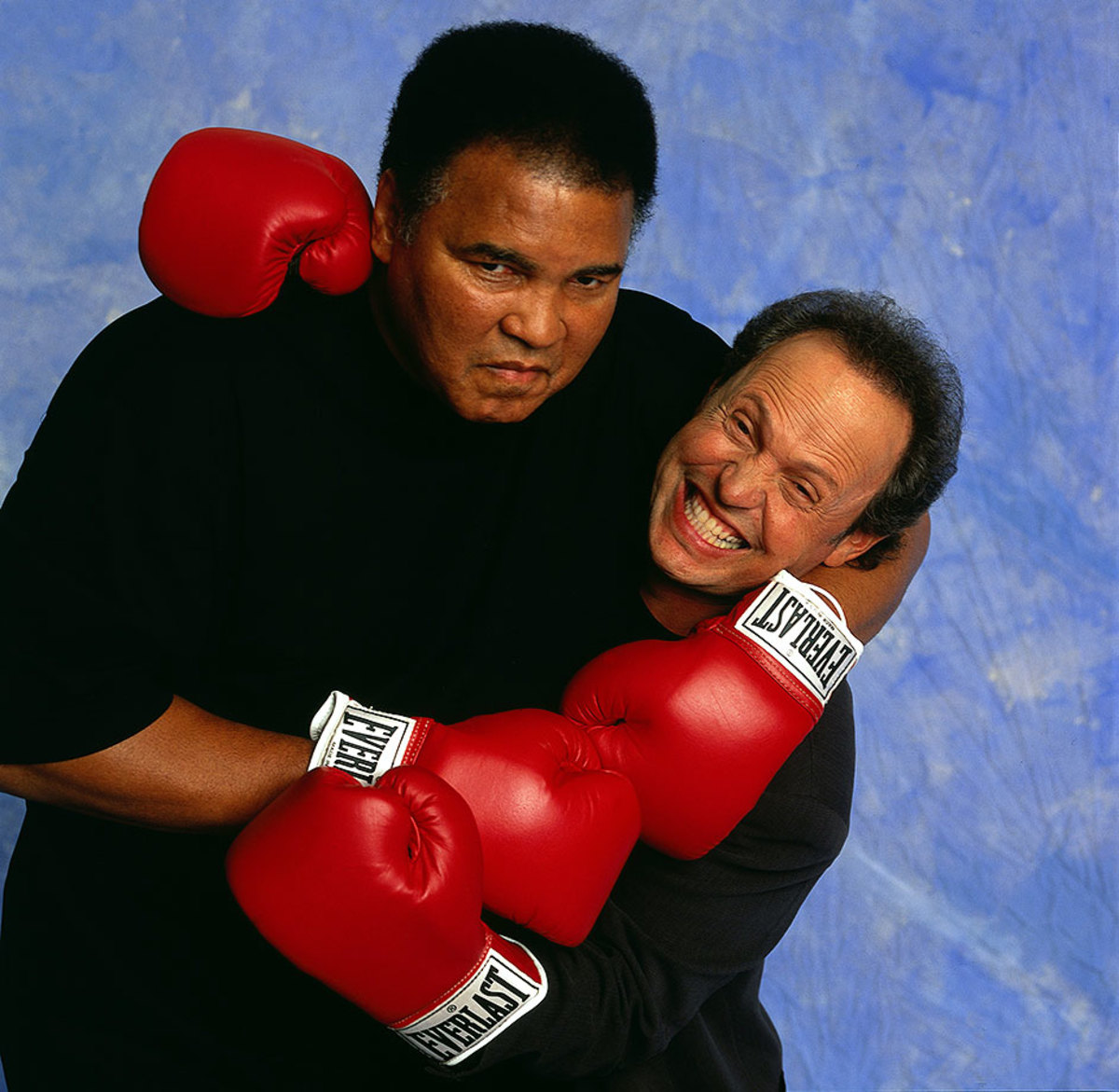
Ali messes around with actor Billy Crystal during a photo shoot in 2000. Crystal's impression of Ali was notorious, and he performed at a tribute to the boxer on his 50th birthday in December 1991.
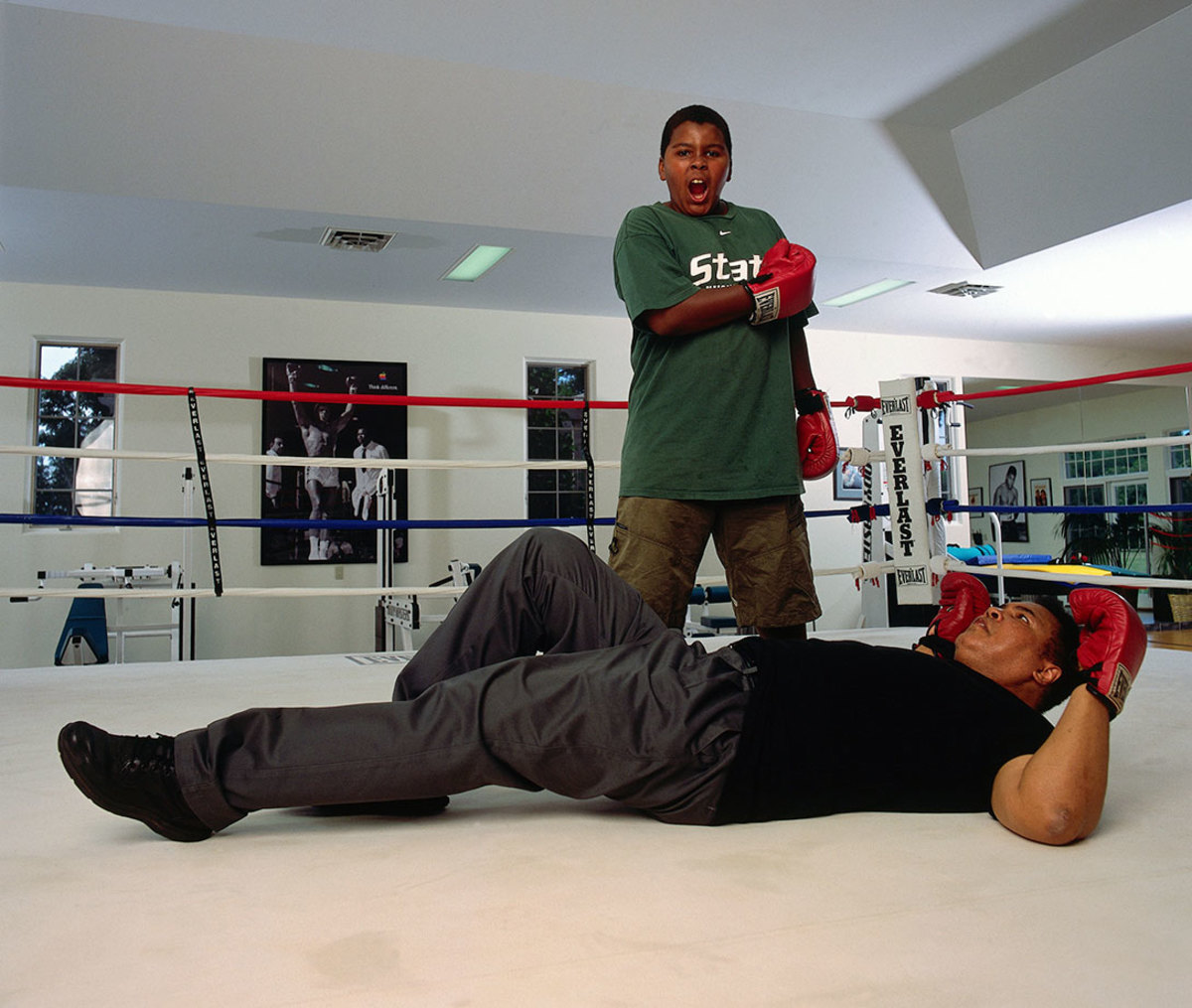
Ali lies on the canvas as his son, Assad Amin Ali, stands over him invoking memories of Ali's victory over Sonny Liston during a photo shoot in the gym at his farm on Kephart Road near Berrien Springs in 2001.
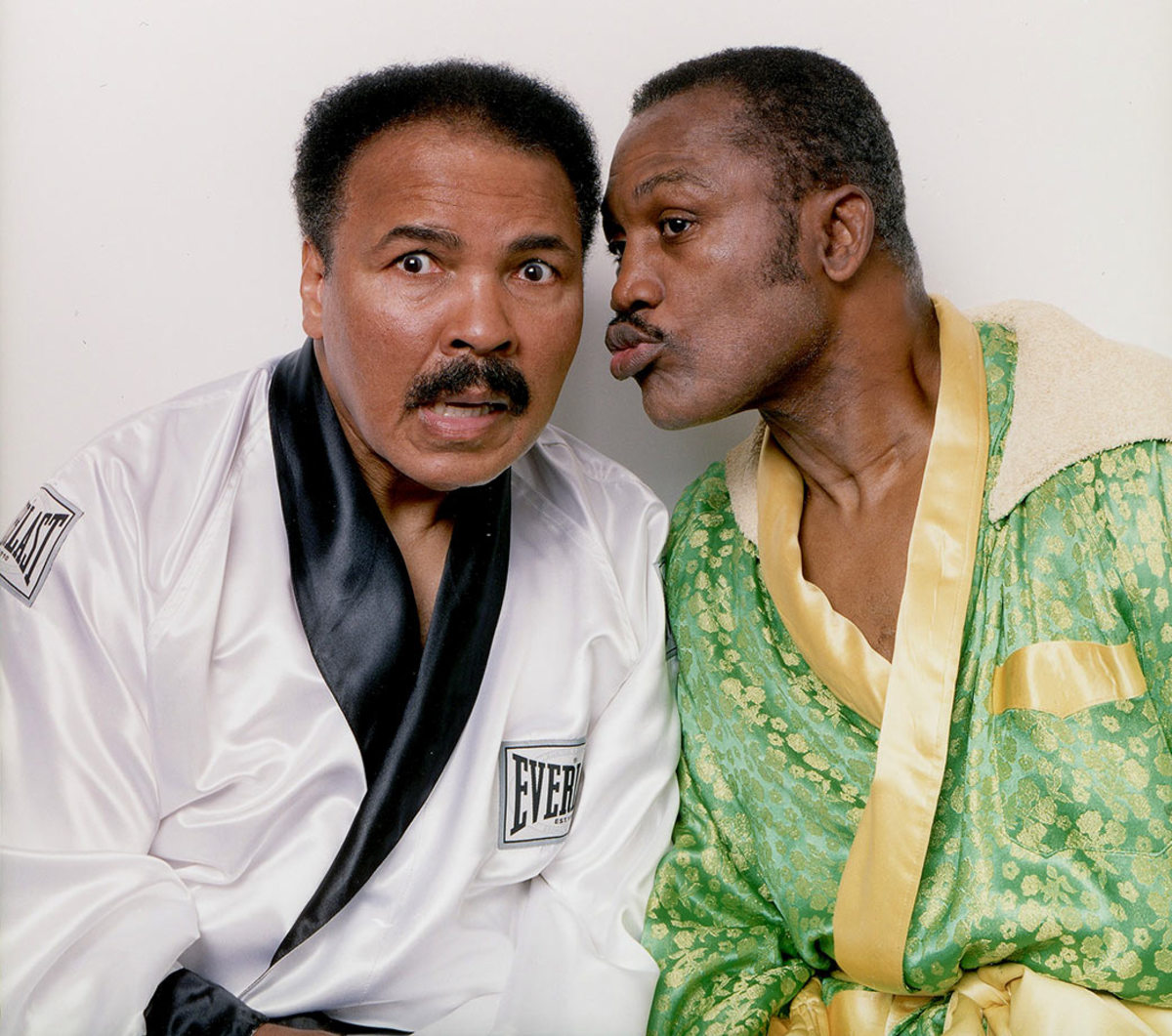
Fierce rivals in the ring, Ali and Joe Frazier pose for a portrait in the boxing robes they wore the night of their first bout at Frazier's Gym in 2003. Ali said after Frazier's death in 2011 that he was "a great champion."
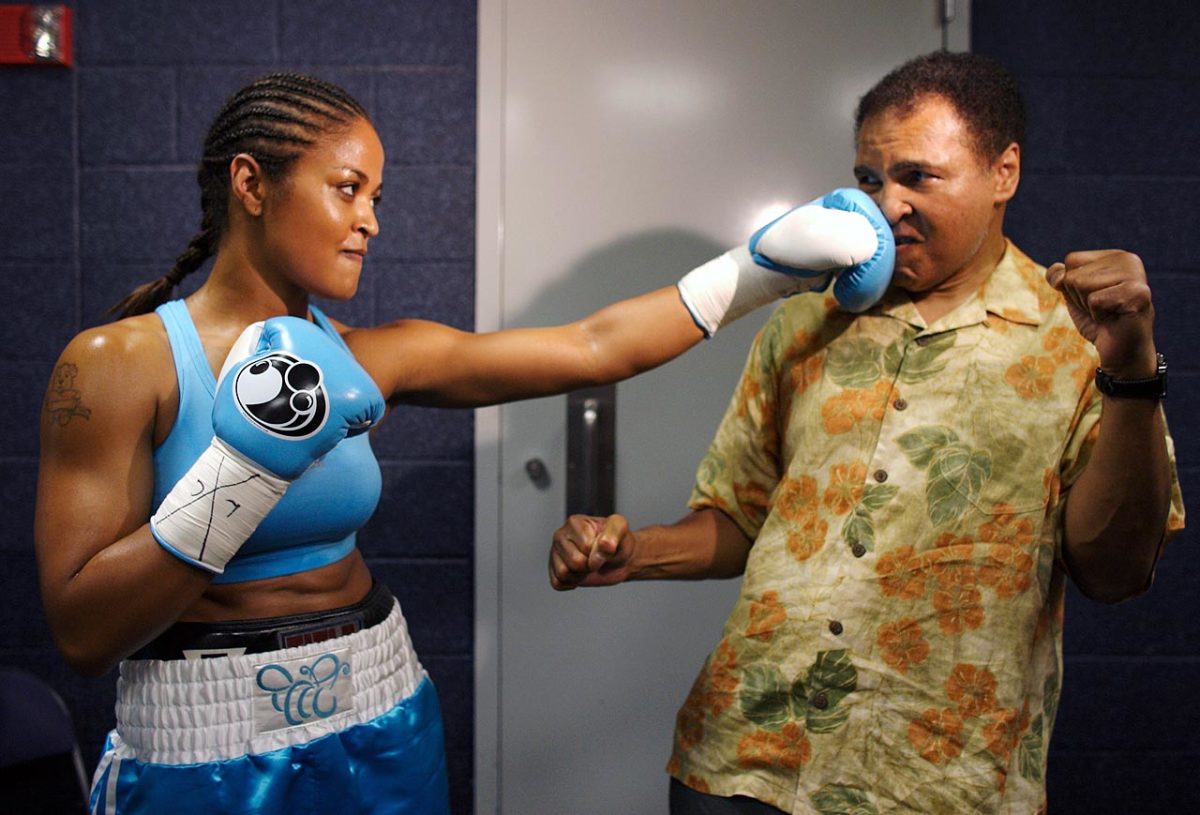
Ali takes a punch from his daughter Laila Ali while sparring before her fight against Erin Toughill in 2005. Laila retired from her own successful boxing career with a professional record of 24-0.
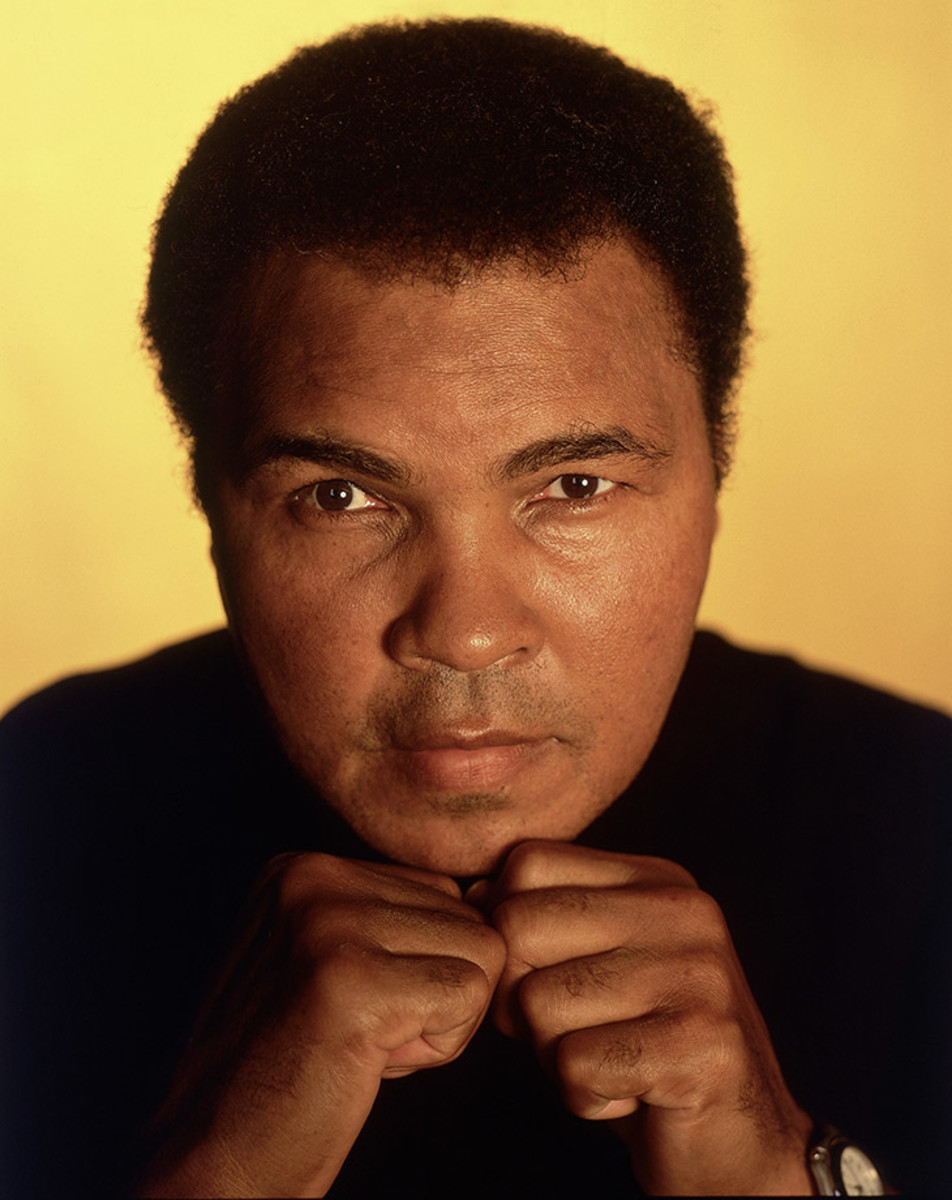
Ali poses with his fists up for a portrait in 2005.
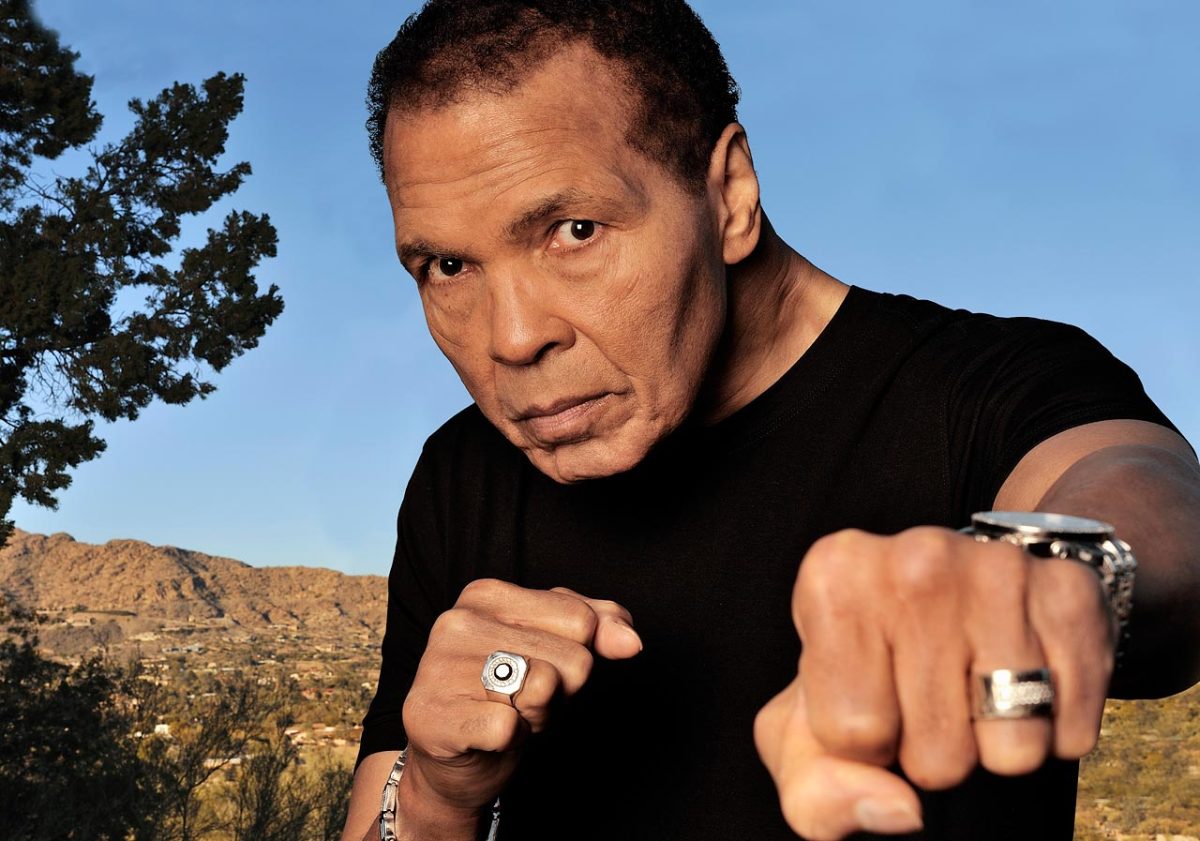
Ali poses with an extended punch in a 2012 photo shoot at his home in Paradise Valley, Ariz., to mark his 70th birthday.
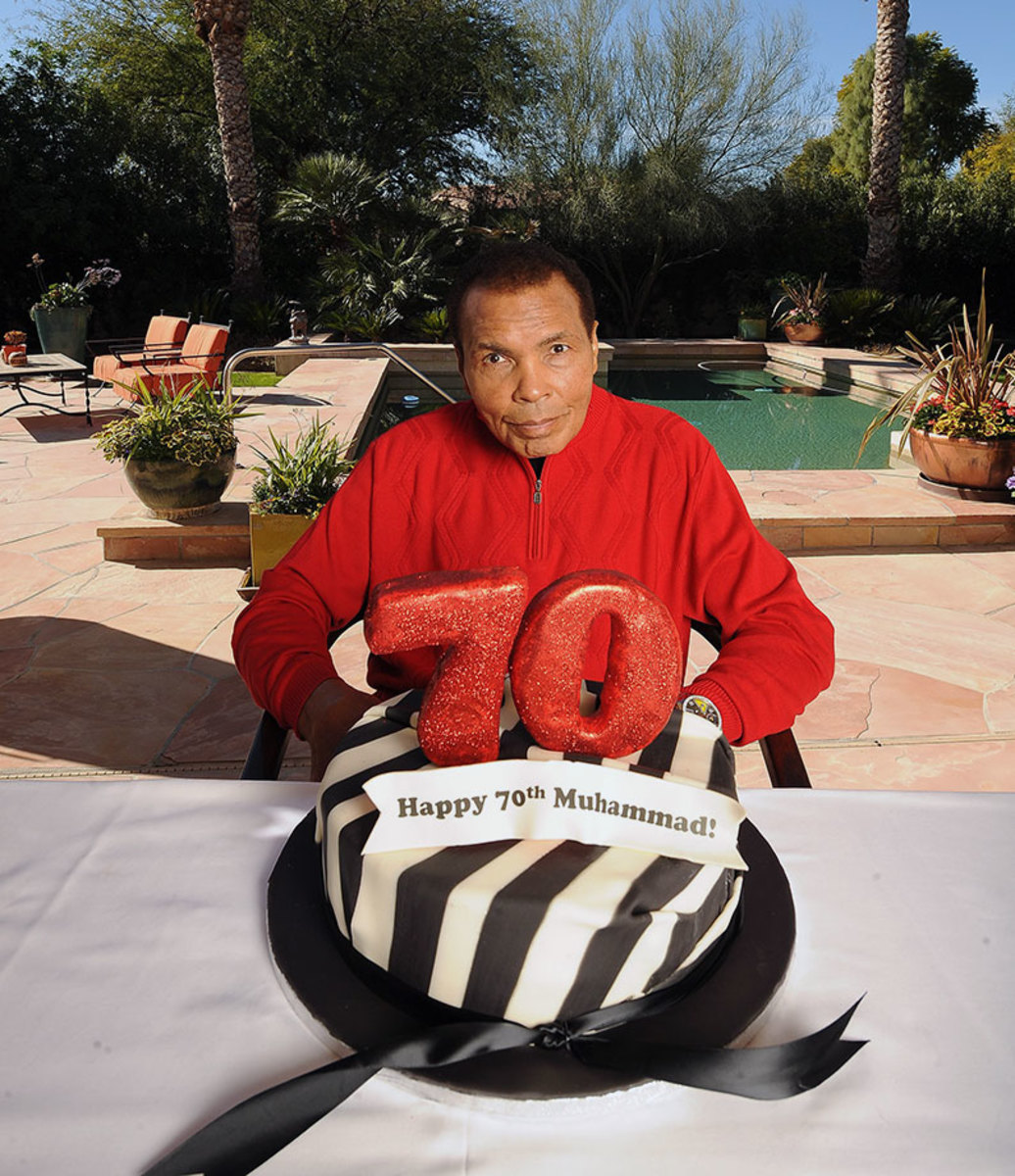
Ali sits in front of a 70th birthday cake in January 2012 at his Arizona home. Later that year he appeared at the opening ceremonies for the 2012 Olympics in London to escort the Olympic flag into the stadium, 52 years after he won gold in Rome.
